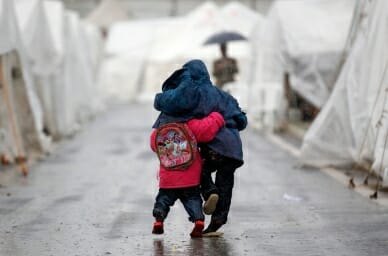
Nov 27, 2015 | Focolare Worldwide

Photo: REUTERS/Murad Sezer
“While the mortar shells are falling near us, fear and worry assail us both for our lives and for the lives of those we know, Christians or Muslims, Syrians or foreigners: our common bond is our humanity, our being brothers and sisters. On the streets of Damascus we live and die together, without distinction.
The death toll of the bombing is tragic: 9 dead and 52 injured. Yet no one speaks of it. For now, Paris has the spotlight. But these are the statistics of the war on the other side of the Mediterranean, these are the statistics of today. I don’t want to intensify the horrifying nature of what is a normal daily reality for everyone. As soon as the din settles, because the noise of the bombs is deafening, I grab my cell phone and call my family and friends: “Are you ok? Where are you? Don’t move! Wait there… .” These are the recurring questions after every bombing or neighborhood shooting. We advise each other to remain where we temporarily found shelter and safety, and there we stay, not knowing where to go. The office, the kitchen, or the hall become shelters or tombs, depending on whether the bombs missed you or hit you. The questions in my head persist, like a mantra: ‘Is it normal to live with this anxiety? Is it normal that people have to live in fear, always? Why does the other side of the world keep silent? How long must this absurdity last? Is it possible that power, money, and profit can defeat the desire for peace common among peoples and communities?’ At the beginning of November, Aleppo remained 15 days without food or supplies, and all access roads were closed. The mines are another of the legacies left by this war. Each transit route must be de-mined before reopening it. A village near Homs was targeted by ISIS and there are about 3,000 displaced persons. The people want the war to end and are full of questions: ‘Who supplies the weapons to this cruel militia? Why do ammunition and explosives arrive, but no food?’ These questions lacerate us, while prayer becomes a balm, our rock. The Christian community seeks to live with a sense of normalcy, meeting for celebrations, working at many solidarity projects, but we are few. People depart inexorably, leaving a beloved homeland because they have no prospects and everything is costly, from medicines to food. But even those who leave want to return: their life is spared, but it isn’t the same as life in Syria, nor the same relationships, nor the same tastes, nor the same complicity. And yet we are not divided. We are scattered, but we continue to live together for the same peace.” Source: Città Nuova
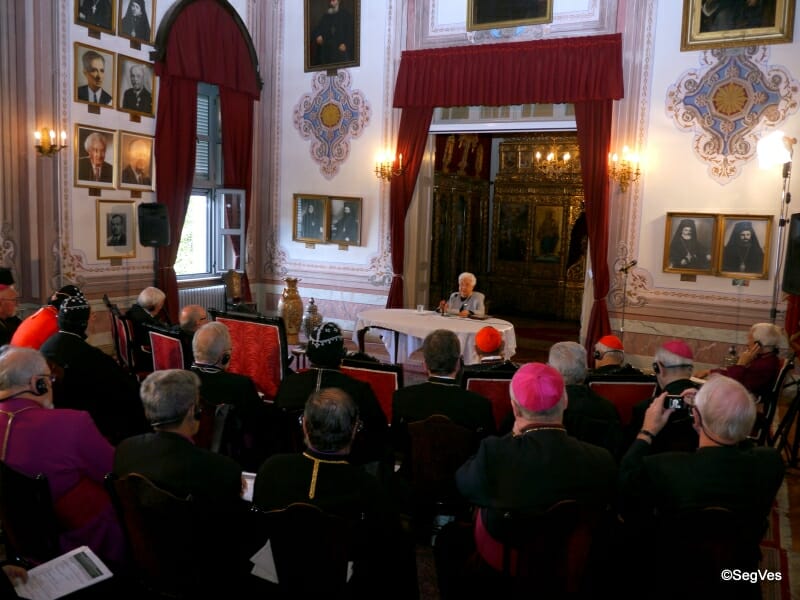
Nov 27, 2015 | Focolare Worldwide
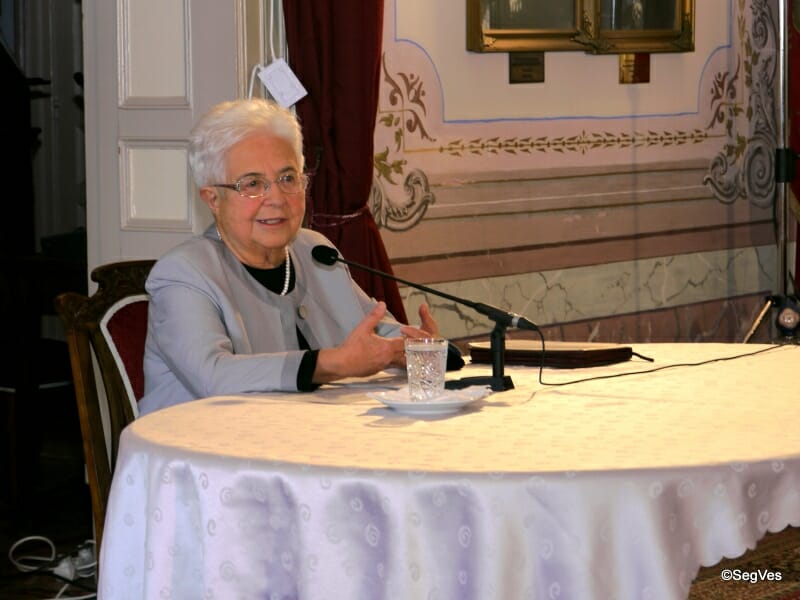 In the present context it may seem absurd or anachronistic to speak of unity. And yet the motivation which animates the bishops present at the Ecumenical Convention on the island of Heybeliada (Halki) is anything but a utopia. Their commitment to live reciprocal love among themselves and with their churches is already a vital testimony for anyone who has lost hope in dialogue and peace. On November 25th, Maria Voce spoke to the bishops about unity in her programmatic speech. Unity is not only a gift from on high, but also becomes an impelling commitment which, she assures us, allows us to “insert ourselves into the sacred history of humanity.” A sacred story in which Christians have an essential role. Unity becomes a response to the challenges of today. “In the face of powerlessness, which at times assails us even today,” she continues, “perhaps we need to take a single first step: to give ourselves to God as instruments in his hands, because he builds unity upon our nothingness. This is our first obligation, the first step we must take singularly and together.” With the dramatic social problems of today, many people, especially the young, feel the need to be visibly present next to those who suffer. But the Focolare Movement’s task does not finish here. One must understand that unity is an objective towards the goal of a united world. “We are called to unity with all, excluding no one,” stresses Maria Voce. Citing various excerpts by Chiara Lubich, she reveals to the bishops the way discovered by the Focolare foundress. “For us, the door which leads to unity is Jesus Crucified and Forsaken,” which “carried out the reunification of the human race with the Father and among men and women, and it is He, crucified and forsaken, the key to unity, which he will fulfill even today.”
In the present context it may seem absurd or anachronistic to speak of unity. And yet the motivation which animates the bishops present at the Ecumenical Convention on the island of Heybeliada (Halki) is anything but a utopia. Their commitment to live reciprocal love among themselves and with their churches is already a vital testimony for anyone who has lost hope in dialogue and peace. On November 25th, Maria Voce spoke to the bishops about unity in her programmatic speech. Unity is not only a gift from on high, but also becomes an impelling commitment which, she assures us, allows us to “insert ourselves into the sacred history of humanity.” A sacred story in which Christians have an essential role. Unity becomes a response to the challenges of today. “In the face of powerlessness, which at times assails us even today,” she continues, “perhaps we need to take a single first step: to give ourselves to God as instruments in his hands, because he builds unity upon our nothingness. This is our first obligation, the first step we must take singularly and together.” With the dramatic social problems of today, many people, especially the young, feel the need to be visibly present next to those who suffer. But the Focolare Movement’s task does not finish here. One must understand that unity is an objective towards the goal of a united world. “We are called to unity with all, excluding no one,” stresses Maria Voce. Citing various excerpts by Chiara Lubich, she reveals to the bishops the way discovered by the Focolare foundress. “For us, the door which leads to unity is Jesus Crucified and Forsaken,” which “carried out the reunification of the human race with the Father and among men and women, and it is He, crucified and forsaken, the key to unity, which he will fulfill even today.”  The task which the Focolare Movement poses is to bring the richness of unity to every corner of the world, to awaken life everywhere. “In the refugee camps, ” continues Maria Voce, “in the hospitals for the wounded by war, in the public demonstrations, in the queues of people looking for work and finding none, in the ports crowded with immigrants…everywhere, everywhere, God is asking us to light ever-greater flames.” In the subsequent dialogue several bishops related their actions in difficult situations, and the solidarity of the faithful of different churches wherever there is war and suffering. They have a strong certainty that the cross of Jesus is the common bond between them and will make lively communities blossom in the most unthinkable places. The program then took a particular look at the situation of the local churches in the Middle East, the role of Christians and their difficulties. Bishop Sahak Maşalyan, despite the complex situation of the Armenian Church in Turkey, spreads optimism, and asserts: “When Christians lose their sense of optimism, in the end they emigrate to some other place.” An appeal was also made by Bishop Simon Atallah, of the Maronite Church of Lebanon. He asked all to pray with fervor to end the war, so that Christians would not abandon their lands and could return to living in peace and harmony. At the end of the day Angela Caliaro e Carmine Donnici, representatives of the Movement, spoke about the development and the influence of the Focolare in the whole Middle Eastern area; a seed of hope which engages Christians, Muslims, and Jews and encourages them to continue on the road to reconciliation and peace. From correspondent Adriana Avellaneda
The task which the Focolare Movement poses is to bring the richness of unity to every corner of the world, to awaken life everywhere. “In the refugee camps, ” continues Maria Voce, “in the hospitals for the wounded by war, in the public demonstrations, in the queues of people looking for work and finding none, in the ports crowded with immigrants…everywhere, everywhere, God is asking us to light ever-greater flames.” In the subsequent dialogue several bishops related their actions in difficult situations, and the solidarity of the faithful of different churches wherever there is war and suffering. They have a strong certainty that the cross of Jesus is the common bond between them and will make lively communities blossom in the most unthinkable places. The program then took a particular look at the situation of the local churches in the Middle East, the role of Christians and their difficulties. Bishop Sahak Maşalyan, despite the complex situation of the Armenian Church in Turkey, spreads optimism, and asserts: “When Christians lose their sense of optimism, in the end they emigrate to some other place.” An appeal was also made by Bishop Simon Atallah, of the Maronite Church of Lebanon. He asked all to pray with fervor to end the war, so that Christians would not abandon their lands and could return to living in peace and harmony. At the end of the day Angela Caliaro e Carmine Donnici, representatives of the Movement, spoke about the development and the influence of the Focolare in the whole Middle Eastern area; a seed of hope which engages Christians, Muslims, and Jews and encourages them to continue on the road to reconciliation and peace. From correspondent Adriana Avellaneda
![Turkey. A Wind of Unity on Heybeli Island, Itstanbul.]()
Nov 26, 2015 | Non categorizzato
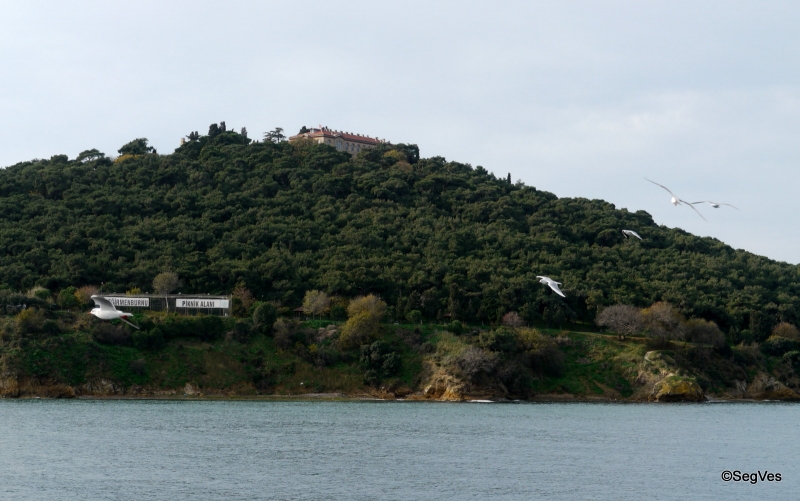 November 25th, 9 am. A light breeze blows over Heybeli Island, Halki, a small oasis of peace in the Marmara Sea near Istanbul. On the top of the island’s Hill of Hope stands the Orthodox Monastery Aya Triada (Most Holy Trinity) that is hosting this year’s 34th Meeting of Bishops from different Churches, promoted by the Focolare Movement. Founded in the 9th century, the Monastery was destroyed several times by earthquake and fire. The present construction from the 19th century is the site of a prestigious Greek Orthodox Theological Academy that contains a library with valuable ancient manuscripts and a total of 120,000 books. It was quite an unusual scene at the Monastery’s entrance: 35 bishops from 16 Churches and 19 countries in fraternal dialogue. The president and co-president of the Focolare Movement were also among them along with other members of the meeting. Ecumenical Patriarch Bartholomew I comes to the door: “I am happy at being together with you,” he says with simplicity and leads them into the Monastery. He would present the opening address of the Meeting: “Together for the common cause: the unity of the disciples of Christ in the diversity of gifts.”
November 25th, 9 am. A light breeze blows over Heybeli Island, Halki, a small oasis of peace in the Marmara Sea near Istanbul. On the top of the island’s Hill of Hope stands the Orthodox Monastery Aya Triada (Most Holy Trinity) that is hosting this year’s 34th Meeting of Bishops from different Churches, promoted by the Focolare Movement. Founded in the 9th century, the Monastery was destroyed several times by earthquake and fire. The present construction from the 19th century is the site of a prestigious Greek Orthodox Theological Academy that contains a library with valuable ancient manuscripts and a total of 120,000 books. It was quite an unusual scene at the Monastery’s entrance: 35 bishops from 16 Churches and 19 countries in fraternal dialogue. The president and co-president of the Focolare Movement were also among them along with other members of the meeting. Ecumenical Patriarch Bartholomew I comes to the door: “I am happy at being together with you,” he says with simplicity and leads them into the Monastery. He would present the opening address of the Meeting: “Together for the common cause: the unity of the disciples of Christ in the diversity of gifts.” 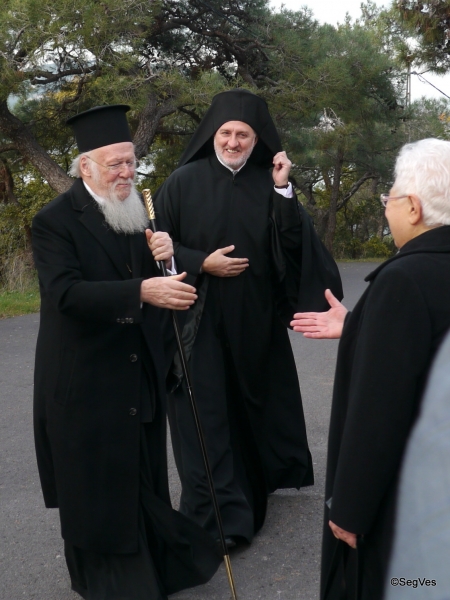 Cardinal Francis Kriengsak from Bangkok greets the Patriarch on behalf of all and thanks him for having wished to host this year’s Meeting. “Here we are in the heart of Orthodoxy with its ancient Churches and countless martyrs” he says as he introduces the members of the Meeting. The Anglican Primate, Archbishop of Canterbury, Justin Welby sent a message to the gathering: “I continue to consider the Focolare Movement as one of the beacons of hope in our divided world. With its commitment to unity through mutual respect and dialogue, it offers a characteristic path towards reconciliation beyond differences and enmities.” Bartholomew I recalls his recent visit to Loppiano for the honorary doctorate that was conferred upon him by Sophia University Institute. “An encounter,” he says “in which we experienced sincere love, without any ifs or buts. Then he speaks of the Meeting. “How can we manage to harmonise the diversity of charisms of our Churches today with the unity of the disciples of Christ and be typos (model) of unity for the world?” he asks. “Too many times the differences appear to be foundational elements and not charism and this is what we savour every day in the face of the difficulties which the human race lives out as exclusiveness and conflict”
Cardinal Francis Kriengsak from Bangkok greets the Patriarch on behalf of all and thanks him for having wished to host this year’s Meeting. “Here we are in the heart of Orthodoxy with its ancient Churches and countless martyrs” he says as he introduces the members of the Meeting. The Anglican Primate, Archbishop of Canterbury, Justin Welby sent a message to the gathering: “I continue to consider the Focolare Movement as one of the beacons of hope in our divided world. With its commitment to unity through mutual respect and dialogue, it offers a characteristic path towards reconciliation beyond differences and enmities.” Bartholomew I recalls his recent visit to Loppiano for the honorary doctorate that was conferred upon him by Sophia University Institute. “An encounter,” he says “in which we experienced sincere love, without any ifs or buts. Then he speaks of the Meeting. “How can we manage to harmonise the diversity of charisms of our Churches today with the unity of the disciples of Christ and be typos (model) of unity for the world?” he asks. “Too many times the differences appear to be foundational elements and not charism and this is what we savour every day in the face of the difficulties which the human race lives out as exclusiveness and conflict” 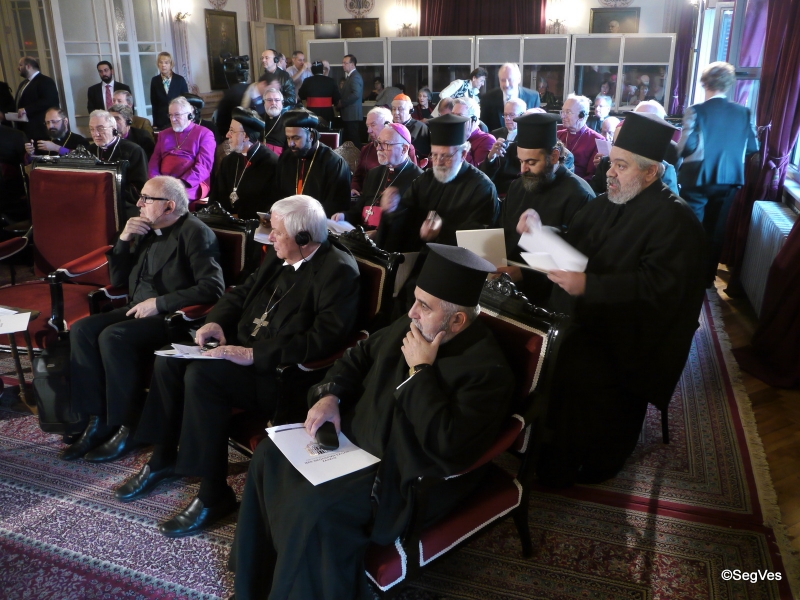 On a global landscape where discouragement, uncertainty and indifference prevail, especially in the recent days, The Patriarch looked to hope. As Christians, he emphasised: “we have to quickly recover the sense of unity as a recapitulation of the gifts [charisms],” the “wealth of the differences. . . to be offered and, in turn, received.” “The unity of the world, the respect for God’s Creation the gift of his love,” he explained, “will be given by the ability to welcome the experience of the other as an enrichment for all, as a path of unity, of respect and of reciprocity,” “free from every type of ideological, political and economic conditioning.” “I arrived here even more happy because I found you waiting for me. . . like a family,” said the Patriarch as he posed a challenge to the bishops and people entrusted to them: if as Christians we will have this experience, “we will truly be ‘salt of the earth’ and the world will begin a profound metamorphosis.” Compiled by: Adriana Avellaneda
On a global landscape where discouragement, uncertainty and indifference prevail, especially in the recent days, The Patriarch looked to hope. As Christians, he emphasised: “we have to quickly recover the sense of unity as a recapitulation of the gifts [charisms],” the “wealth of the differences. . . to be offered and, in turn, received.” “The unity of the world, the respect for God’s Creation the gift of his love,” he explained, “will be given by the ability to welcome the experience of the other as an enrichment for all, as a path of unity, of respect and of reciprocity,” “free from every type of ideological, political and economic conditioning.” “I arrived here even more happy because I found you waiting for me. . . like a family,” said the Patriarch as he posed a challenge to the bishops and people entrusted to them: if as Christians we will have this experience, “we will truly be ‘salt of the earth’ and the world will begin a profound metamorphosis.” Compiled by: Adriana Avellaneda
Nov 26, 2015 | Focolare Worldwide
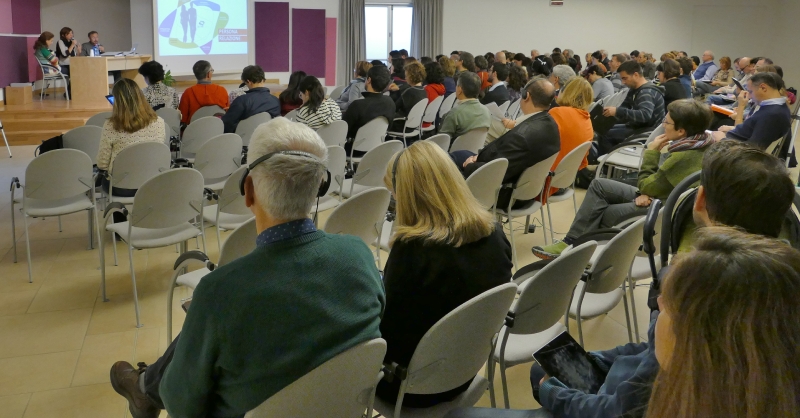
Nov 26, 2015 | Non categorizzato
 The launching of this innovative project took place recently with the first “train the tutor course”. The course gathered a hundred people at the Focolare town of Loppiano, Italy from a variety of fields: teachers, psychologists, medical doctors and youth directors from eight European countries, Brazil, Argentina, India, Burkina Faso and Cameroon. Many of them were parents or involved in child education. The prerequisite for acceptance into the course was that a man and a woman from the same region enroll together. The organisers suggested that it might be more beneficial if the topic of physical affection were presented to children and young adolescents by a man and a woman.
The launching of this innovative project took place recently with the first “train the tutor course”. The course gathered a hundred people at the Focolare town of Loppiano, Italy from a variety of fields: teachers, psychologists, medical doctors and youth directors from eight European countries, Brazil, Argentina, India, Burkina Faso and Cameroon. Many of them were parents or involved in child education. The prerequisite for acceptance into the course was that a man and a woman from the same region enroll together. The organisers suggested that it might be more beneficial if the topic of physical affection were presented to children and young adolescents by a man and a woman. 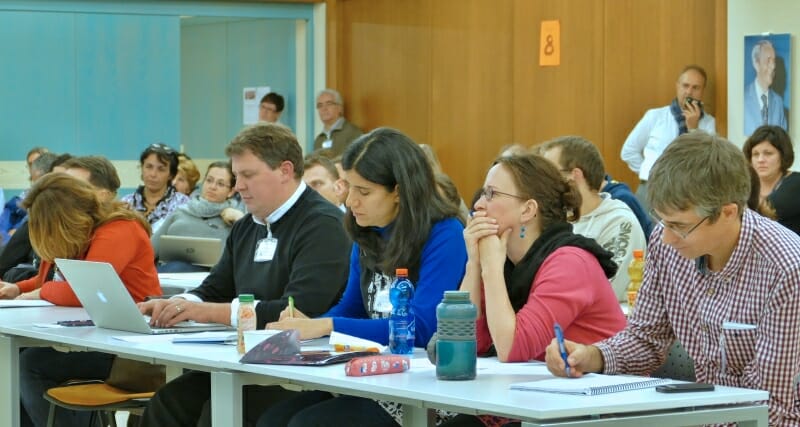 The project stems from cooperation between families, youth group leaders and experts from various fields within the framework of the Focolare, including scholars from Sophia University Institute, Loppiano. The purpose of the project is to provide a holistic program to adolescents, in which human sexuality is illuminated by a vision of the human person as someone in relationship, with his or her capacity to love and be loved, to give and to receive. The ones who are most pleased with the project are the parents who, in the face of the complexity of such topics, are feeling the need for updated tools. These were the assumptions that guided the group which came up with the content, phases and methodology of the course to create a moral conscience in the teenagers, which would help them to account for their choices and express them.
The project stems from cooperation between families, youth group leaders and experts from various fields within the framework of the Focolare, including scholars from Sophia University Institute, Loppiano. The purpose of the project is to provide a holistic program to adolescents, in which human sexuality is illuminated by a vision of the human person as someone in relationship, with his or her capacity to love and be loved, to give and to receive. The ones who are most pleased with the project are the parents who, in the face of the complexity of such topics, are feeling the need for updated tools. These were the assumptions that guided the group which came up with the content, phases and methodology of the course to create a moral conscience in the teenagers, which would help them to account for their choices and express them.  The trained tutors will begin operating in January 2016. There are already children in their countries who with their parents’ consent, are already planning on attending Up2me. The course will include twelve classes for three age groups: 9-11; 12-14; 15-17. It will examine the many dimensions of the human person (corporal, emotional, intellectual, social, spiritual, historical environment); and the lessons will range from knowledge of the human body to the concept of the human person; from stereotyped images in publicity and the media, to sexual identity; from managing emotions to conflict with parents; from dangerous behaviours, to the influence of Internet. Age appropriate dynamics (role play, video clips, life experiences) will be utilised to discuss bigger topics relate to the transmission of life, contraception, abortion, pornography. This will hopefully help the children in their relationship with themselves and in the discovery of the plan for their lives. Meetings and opportunities for collaboration are also scheduled for parents. The course was tested by two pilot courses in Italy. The 2016 course will be a year-long experiment with the first group of children from other European countries. Meanwhile, experts from the continents of the world will translate and adapt the program to local needs. Based on that experience the course for tutors will be presented again so that Up2me can be taken to other regions of the world. Info: up2me@afnonlus.org
The trained tutors will begin operating in January 2016. There are already children in their countries who with their parents’ consent, are already planning on attending Up2me. The course will include twelve classes for three age groups: 9-11; 12-14; 15-17. It will examine the many dimensions of the human person (corporal, emotional, intellectual, social, spiritual, historical environment); and the lessons will range from knowledge of the human body to the concept of the human person; from stereotyped images in publicity and the media, to sexual identity; from managing emotions to conflict with parents; from dangerous behaviours, to the influence of Internet. Age appropriate dynamics (role play, video clips, life experiences) will be utilised to discuss bigger topics relate to the transmission of life, contraception, abortion, pornography. This will hopefully help the children in their relationship with themselves and in the discovery of the plan for their lives. Meetings and opportunities for collaboration are also scheduled for parents. The course was tested by two pilot courses in Italy. The 2016 course will be a year-long experiment with the first group of children from other European countries. Meanwhile, experts from the continents of the world will translate and adapt the program to local needs. Based on that experience the course for tutors will be presented again so that Up2me can be taken to other regions of the world. Info: up2me@afnonlus.org
![Turkey. A Wind of Unity on Heybeli Island, Itstanbul.]()
Nov 25, 2015 | Focolare Worldwide
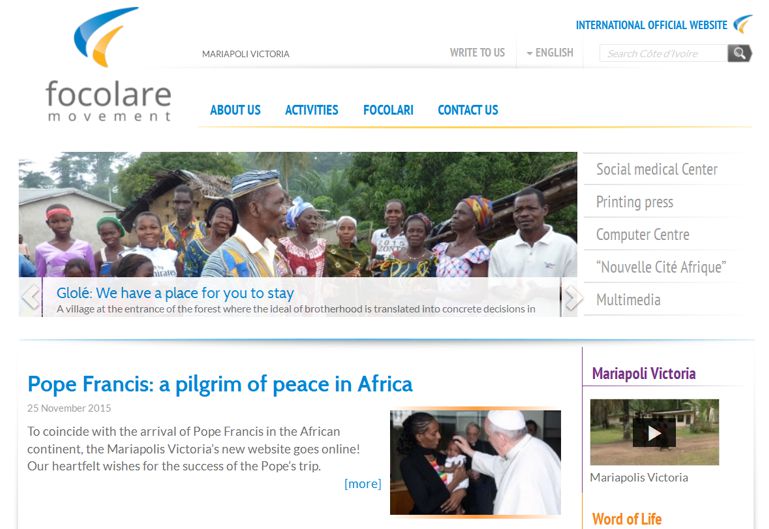 Today Pope Francis sets out on his first trip to Africa where he will be visiting Kenya and Uganda (English-speaking nations) and the Central African Republic (a French-speaking nation). It’s a particularly delicate and significant time in the Central African Republic due to it’s security situation being a country at war. “Mariapolis Victoria”, the Focolare’s little town located in the Ivory Coast, extends its best wishes for this trip and has timed the launching of its new website today to coincide with this meaningful journey of the Pope in Africa . Although West Africa is not on Pope Francis’ itinerary, we totally adhere to his message of brotherhood and peace. Many nations in West Africa, such as Mali, Niger and Nigeria, have suffered repeated attacks of terrorism. We sincerely hope that the presence of Pope Francis, which promotes dialogue, in particular interreligious dialogue, may open up pathways of fraternity in Africa. “Bon voyage” Pope Francis! Source : www.focolare.org/mariapolivictoria
Today Pope Francis sets out on his first trip to Africa where he will be visiting Kenya and Uganda (English-speaking nations) and the Central African Republic (a French-speaking nation). It’s a particularly delicate and significant time in the Central African Republic due to it’s security situation being a country at war. “Mariapolis Victoria”, the Focolare’s little town located in the Ivory Coast, extends its best wishes for this trip and has timed the launching of its new website today to coincide with this meaningful journey of the Pope in Africa . Although West Africa is not on Pope Francis’ itinerary, we totally adhere to his message of brotherhood and peace. Many nations in West Africa, such as Mali, Niger and Nigeria, have suffered repeated attacks of terrorism. We sincerely hope that the presence of Pope Francis, which promotes dialogue, in particular interreligious dialogue, may open up pathways of fraternity in Africa. “Bon voyage” Pope Francis! Source : www.focolare.org/mariapolivictoria
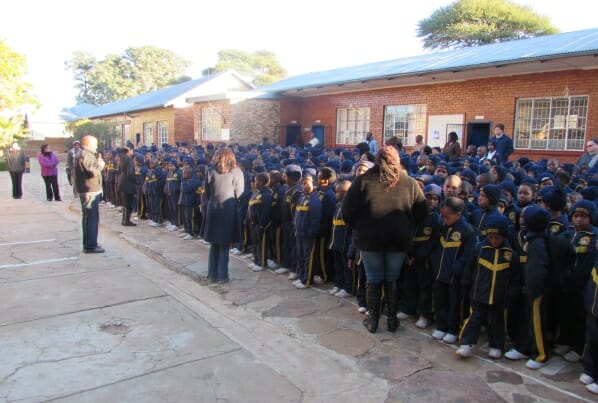
Nov 25, 2015 | Focolare Worldwide
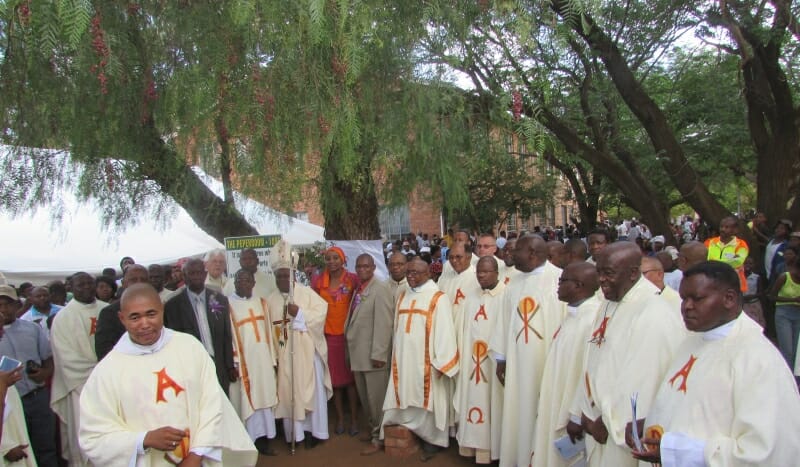 Taung forms a sole diocese with Kimberley, famous for its ancient and deactivated diamond mine. Visitors flock from all over the world to Kimberley to admire its Big Hole, the hollow that remained after the diggings, and where, surpassing the steep ravines, the bravest tourists can immerse in a really fantastic lake. But also Taung boasts its own primacy. In 1924, precisely there, the fossile of a child’s skull was found , and traced to 2.3 million years ago, a very important find for scholars and researchers, and was named the Taung Child. However, the 24 October feast was not only a geological-cultural one. Four thousand people from far-off towns and village reached Taung to celebrate the 120th anniversari of the arrival of the Catholic Church among the Tswana people of South Africa. The Prior of the Oblates and the local bishop were the honoured hosts. Also Bishop Klerksdorp and about fifty priests and religious were there. The Minister of Culture of the province represented the government. Also present was Kgosi, the traditional chief of the Tswana population – about 300,000 in all – living in the villages of Taung.
Taung forms a sole diocese with Kimberley, famous for its ancient and deactivated diamond mine. Visitors flock from all over the world to Kimberley to admire its Big Hole, the hollow that remained after the diggings, and where, surpassing the steep ravines, the bravest tourists can immerse in a really fantastic lake. But also Taung boasts its own primacy. In 1924, precisely there, the fossile of a child’s skull was found , and traced to 2.3 million years ago, a very important find for scholars and researchers, and was named the Taung Child. However, the 24 October feast was not only a geological-cultural one. Four thousand people from far-off towns and village reached Taung to celebrate the 120th anniversari of the arrival of the Catholic Church among the Tswana people of South Africa. The Prior of the Oblates and the local bishop were the honoured hosts. Also Bishop Klerksdorp and about fifty priests and religious were there. The Minister of Culture of the province represented the government. Also present was Kgosi, the traditional chief of the Tswana population – about 300,000 in all – living in the villages of Taung. 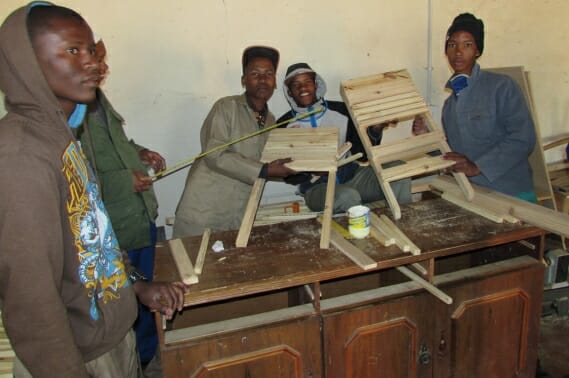 During the celebrations, great importance was given to the activities of the missions, especially those conducted by three members who live in the Focolare community: Dominic, from Cameroon, and Chris who is German and Moris from Kenya. Each of them play a key role in the mission. Dominic, who is a priest, acts as vice-parish priest. Given that he has been there for a short time, he is still learning the Tswana language, and so, during the sermon, is helped by Rapelang, father of a family who has embraced the spirituality of the Focolare and more than willingly acts as his interpreter, and often completes the sermons with his own experiences on living the Gospel. Chris has been entrusted with the two-year professional school and which certifies yearly about thirty young and promising carpenters. These are young people who had to leave for various reasons the public school, and are offered a second chance to learn a trade. Moris is the dean of the primary school with 550 students.
During the celebrations, great importance was given to the activities of the missions, especially those conducted by three members who live in the Focolare community: Dominic, from Cameroon, and Chris who is German and Moris from Kenya. Each of them play a key role in the mission. Dominic, who is a priest, acts as vice-parish priest. Given that he has been there for a short time, he is still learning the Tswana language, and so, during the sermon, is helped by Rapelang, father of a family who has embraced the spirituality of the Focolare and more than willingly acts as his interpreter, and often completes the sermons with his own experiences on living the Gospel. Chris has been entrusted with the two-year professional school and which certifies yearly about thirty young and promising carpenters. These are young people who had to leave for various reasons the public school, and are offered a second chance to learn a trade. Moris is the dean of the primary school with 550 students.  It is really impressive to see, in the morning, this throng of kids and children line up for inspection, which is performed by the assigned students themselves every time, to check the hygiene and uniform of the students. Besides a professional education the school also offers a spiritual and moral education for their personal lives. Its innovative programme and teaching style, centred on authentic values, has earned the school its reputation as a school of excellence. It is attended not only by the children of Catholic families but also of Protestants (who represent about 30% of the entire South African population) and among whom ecumenical dialogue is always open and constructive. The Catholic Mission schools, across the 100 years of activities have formed men and women of great human and professional stature, who have played key roles in society.
It is really impressive to see, in the morning, this throng of kids and children line up for inspection, which is performed by the assigned students themselves every time, to check the hygiene and uniform of the students. Besides a professional education the school also offers a spiritual and moral education for their personal lives. Its innovative programme and teaching style, centred on authentic values, has earned the school its reputation as a school of excellence. It is attended not only by the children of Catholic families but also of Protestants (who represent about 30% of the entire South African population) and among whom ecumenical dialogue is always open and constructive. The Catholic Mission schools, across the 100 years of activities have formed men and women of great human and professional stature, who have played key roles in society.
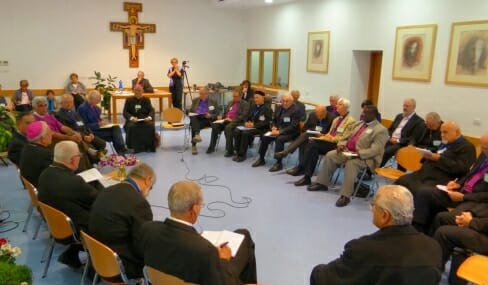
Nov 24, 2015 | Focolare Worldwide
 The 34th Conference of Bishops of different Churches, promoted by the Focolare Movement, will start on 25 November 2015. It will be held on the island of Heybeliada (Halki), in the sea of Marmara, near Istanbul. The 150 participants, from 9 different countries, will be hosted in the Monastery on this island, which was once the seat of the prestigious Greek-Orthodox theological Academy of Halki. The 50 participants, from 19 countries, are much awaited by His Holiness Bartholomew I, who during a recent interview, in the wake of the Honoris Causa doctorate in the Culture of Unity conferred upon him by the Sophia University Institute, affirmed that: “At Halki we will together remember Chiara Lubich and pray for the repose of her soul. We will be able to express our commitment to work for the unity of Churches. We, the Church of Constantinople are pleased to welcome these cardinals and bishops, and we are ready to exchange our experiences and give one another the kiss of peace between the East and the West”. “Together for our common home” will be the theme of this conference, which will focus on unity, as a service to the human family, through a diversity of gifts. The main speakers will be Patriarch Bartholomew I and Maria Voce, while Cardinal Francis Kriengsak, Archbishop of Bangkok will be the moderator of the conference. Various bishops from different Churches will share their reflections; among them, the Anglican Bishop Robin Smith; Åke Bonnier, Lutheran Bishop of the Swedish Church; the Catholic Bishop Brendan Leahy, Bishop Sahak Mashalyan of the Armenian Apostolic Church and the Metropolitan Elpidophoros of Halki. Jesús Morán, the co-president of the Focolare Movement will offer his reflection on “The Charism of Unity and the challenges of today’s humanity”. Gerhard Pross, an Evangelical from YMCA, Germany will speak about “Achievements and experiences on the road to unity” in the name of “Together for Europe”, the ecumenical network of movements and communities. Cardinal Kurt Koch, who will lead a Holy See delegation to Istanbul for St. Andrew’s feast, will also speak during the Conference. His talk will be about “Pope Francis and the cause of Christian Unity”. In a church of Armenian Apostolic tradition of ancient Chalcedon, the seat of the Chalcedonian Ecumenical Council of 451, the bishops will once again formulate a pact of reciprocal love, thus renewing the mutual relationship of charity that goes beyond all divisions and answers Jesus’s invitation: “Love one another as I have loved you” (Jn 15:12). In this particular context, this invitation implies the reciprocal promise “to love the Church of the other as one’s own”. The bishops are invited by Patriarch Bartholomew to participate in the celebrations at the Phanar on the 29 and 30 November on the occasion of the feast of St. Andrew, Patron of the Patriarchate of Constantinople. These meetings for bishops of different Churches, promoted by the Focolare Movement, are held annually. These meetings have been taking place since 1982, and they owe their beginning to a suggestion made by Pope John Paul II to a group of Catholic bishops, friends of the Focolare Movement, when he invited them to share their experience of “effective and affective” communion even with bishops of other churches. Promoted by Klaus Hemmerle, who was then bishop of Aaachen, Germany, and after his death by Miloslav Vlk, Cardinal of Prague, these meetings aim at offering vital spaces of communion and fraternal sharing in the light of the spirituality of unity. The venue for these meetings changes; they are held in places that are meaningful to the various Christian denominations. In 2016 the meeting will be held in Ottmaring (Augsburg – Germany).
The 34th Conference of Bishops of different Churches, promoted by the Focolare Movement, will start on 25 November 2015. It will be held on the island of Heybeliada (Halki), in the sea of Marmara, near Istanbul. The 150 participants, from 9 different countries, will be hosted in the Monastery on this island, which was once the seat of the prestigious Greek-Orthodox theological Academy of Halki. The 50 participants, from 19 countries, are much awaited by His Holiness Bartholomew I, who during a recent interview, in the wake of the Honoris Causa doctorate in the Culture of Unity conferred upon him by the Sophia University Institute, affirmed that: “At Halki we will together remember Chiara Lubich and pray for the repose of her soul. We will be able to express our commitment to work for the unity of Churches. We, the Church of Constantinople are pleased to welcome these cardinals and bishops, and we are ready to exchange our experiences and give one another the kiss of peace between the East and the West”. “Together for our common home” will be the theme of this conference, which will focus on unity, as a service to the human family, through a diversity of gifts. The main speakers will be Patriarch Bartholomew I and Maria Voce, while Cardinal Francis Kriengsak, Archbishop of Bangkok will be the moderator of the conference. Various bishops from different Churches will share their reflections; among them, the Anglican Bishop Robin Smith; Åke Bonnier, Lutheran Bishop of the Swedish Church; the Catholic Bishop Brendan Leahy, Bishop Sahak Mashalyan of the Armenian Apostolic Church and the Metropolitan Elpidophoros of Halki. Jesús Morán, the co-president of the Focolare Movement will offer his reflection on “The Charism of Unity and the challenges of today’s humanity”. Gerhard Pross, an Evangelical from YMCA, Germany will speak about “Achievements and experiences on the road to unity” in the name of “Together for Europe”, the ecumenical network of movements and communities. Cardinal Kurt Koch, who will lead a Holy See delegation to Istanbul for St. Andrew’s feast, will also speak during the Conference. His talk will be about “Pope Francis and the cause of Christian Unity”. In a church of Armenian Apostolic tradition of ancient Chalcedon, the seat of the Chalcedonian Ecumenical Council of 451, the bishops will once again formulate a pact of reciprocal love, thus renewing the mutual relationship of charity that goes beyond all divisions and answers Jesus’s invitation: “Love one another as I have loved you” (Jn 15:12). In this particular context, this invitation implies the reciprocal promise “to love the Church of the other as one’s own”. The bishops are invited by Patriarch Bartholomew to participate in the celebrations at the Phanar on the 29 and 30 November on the occasion of the feast of St. Andrew, Patron of the Patriarchate of Constantinople. These meetings for bishops of different Churches, promoted by the Focolare Movement, are held annually. These meetings have been taking place since 1982, and they owe their beginning to a suggestion made by Pope John Paul II to a group of Catholic bishops, friends of the Focolare Movement, when he invited them to share their experience of “effective and affective” communion even with bishops of other churches. Promoted by Klaus Hemmerle, who was then bishop of Aaachen, Germany, and after his death by Miloslav Vlk, Cardinal of Prague, these meetings aim at offering vital spaces of communion and fraternal sharing in the light of the spirituality of unity. The venue for these meetings changes; they are held in places that are meaningful to the various Christian denominations. In 2016 the meeting will be held in Ottmaring (Augsburg – Germany).
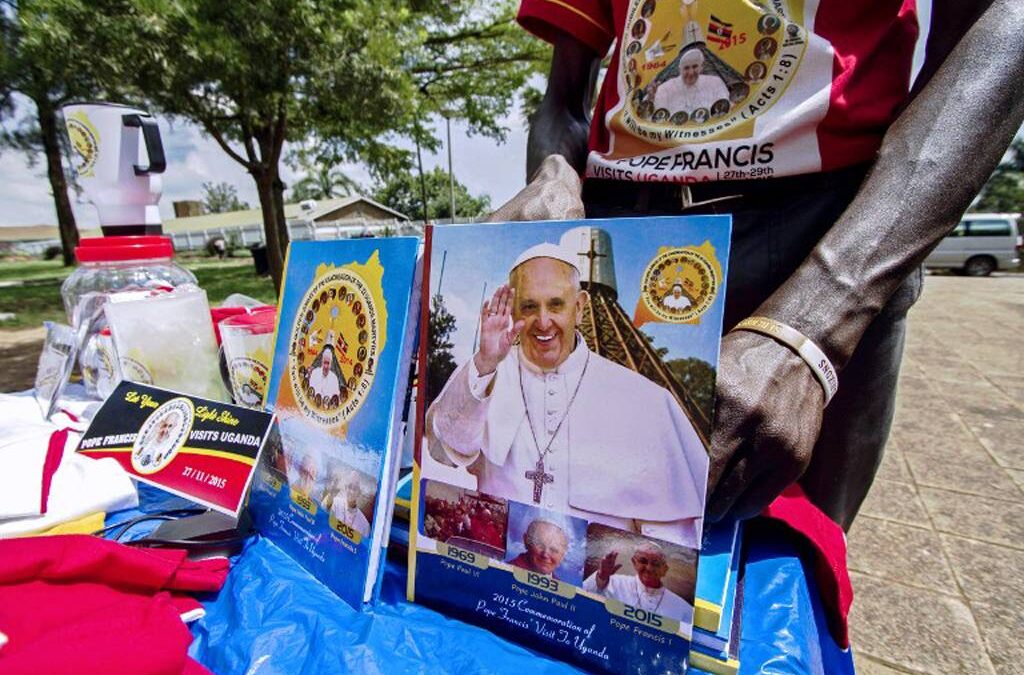
Nov 23, 2015 | Focolare Worldwide
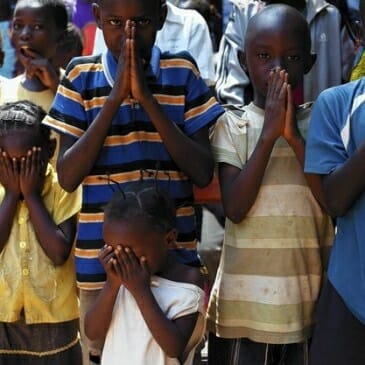 «The key perspective of this trip will be revealed in the programme and activities the Pope will undertake,» says Liliane Mugombozi, director of New City, the magazine of the Focolare Movement in Kenya. Through her we will trace the steps of a journey which is revealing to be very important. «Pope Francis chose three countries where there are big Catholic communities afflicted by various tensions which he wishes to share as the pastor of the people, and together write a new page in the history of Africa today within a global framework and walk in search of solutions to the biggest problems and concerns of the population.» And what are the expectations? «We want his message to resound in all sectors of life, from governance to the management of goods, and from politics to education, healthcare, dialogue and interreligious relationships …». And to those who object because Pope Francis knows very little of Africa, the Archbishop of Kinshasa in the Democratic Republic of Congo, Cardinal Monsengwo replied: «This is true. But the really fantastic thing is that he goes where people suffer. If it wasn’t for the Ebola outbreak, he would have come to Africa a long time ago.» Since last 19 October when the Vatican confirmed the date of the journey, innumerable analyses accompanied this announcement: «In Kenya – Lili Mugombozi wrote – the battle against Al-shabab, responsible for the violent attacks over the last few years, is one of the biggest political challenges. Mons. Rotich, president of the secretariat in charge of the visit affirmed: «During our ad limina visit in Rome, he questioned us about the massacre in Garissa and he said that he would come to comfort the Kenyan people.» In Uganda, Pope Francis will visit the Anglican and Catholic sanctuaries to honour the memory of the young martyrs: 23 Anglicans and 22 Catholics who were killed because of their faith. «For many Uganda people – Liliane explained further – Francis’s gesture is a joyful revival of the past – when in 1969 – Paul VI, the first Pope to ever set foot on African soil, canonized the first African Saints – but it is also a new commitment to dialogue with the churches.» The Focolare in Uganda wrote: «On this anniversary we feel particularly called to live the sanctity of the people.»
«The key perspective of this trip will be revealed in the programme and activities the Pope will undertake,» says Liliane Mugombozi, director of New City, the magazine of the Focolare Movement in Kenya. Through her we will trace the steps of a journey which is revealing to be very important. «Pope Francis chose three countries where there are big Catholic communities afflicted by various tensions which he wishes to share as the pastor of the people, and together write a new page in the history of Africa today within a global framework and walk in search of solutions to the biggest problems and concerns of the population.» And what are the expectations? «We want his message to resound in all sectors of life, from governance to the management of goods, and from politics to education, healthcare, dialogue and interreligious relationships …». And to those who object because Pope Francis knows very little of Africa, the Archbishop of Kinshasa in the Democratic Republic of Congo, Cardinal Monsengwo replied: «This is true. But the really fantastic thing is that he goes where people suffer. If it wasn’t for the Ebola outbreak, he would have come to Africa a long time ago.» Since last 19 October when the Vatican confirmed the date of the journey, innumerable analyses accompanied this announcement: «In Kenya – Lili Mugombozi wrote – the battle against Al-shabab, responsible for the violent attacks over the last few years, is one of the biggest political challenges. Mons. Rotich, president of the secretariat in charge of the visit affirmed: «During our ad limina visit in Rome, he questioned us about the massacre in Garissa and he said that he would come to comfort the Kenyan people.» In Uganda, Pope Francis will visit the Anglican and Catholic sanctuaries to honour the memory of the young martyrs: 23 Anglicans and 22 Catholics who were killed because of their faith. «For many Uganda people – Liliane explained further – Francis’s gesture is a joyful revival of the past – when in 1969 – Paul VI, the first Pope to ever set foot on African soil, canonized the first African Saints – but it is also a new commitment to dialogue with the churches.» The Focolare in Uganda wrote: «On this anniversary we feel particularly called to live the sanctity of the people.» 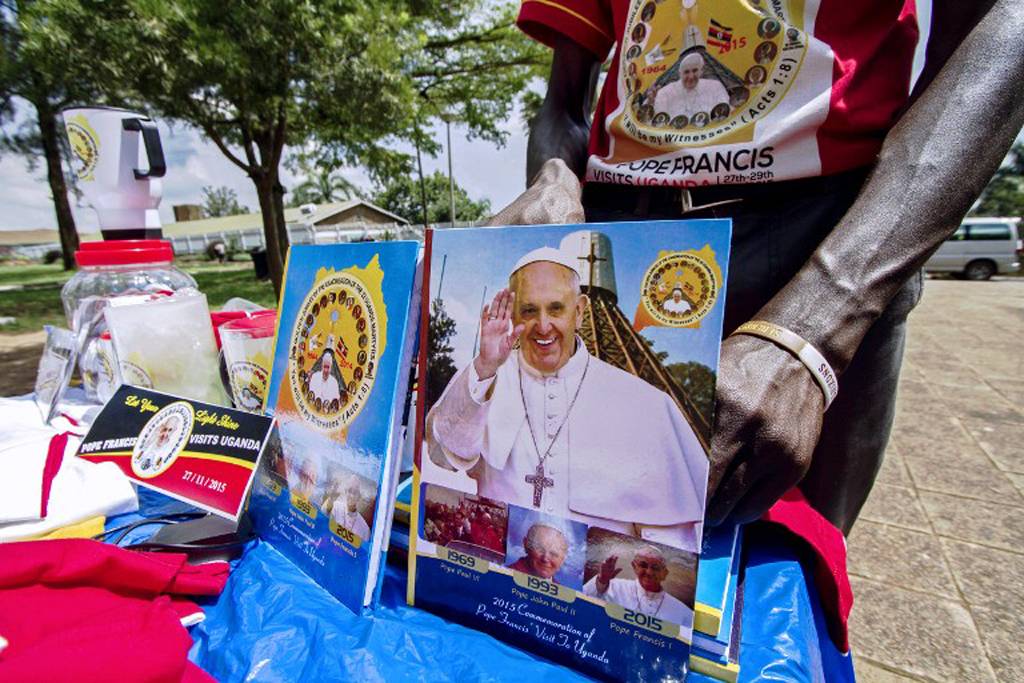 In the Central African Republic, in a tense political context which suscitates anxiety, «in order to manifest to this nation how much the Church feels and shares its afflictions, and urge all central Africans to always be testimonials of mercy and reconciliation,» on 29 November, Francis will open the holy door of the cathedral of Bangui, symbolically anticipating the start of the Jubilee Year of Mercy, and will give a very strong sign of this with his speech in the central Mosque. «In each of these countries – the New City director continued – the Pope will meet the heads of State, speak to the diplomatic corps, celebrate a public Mass where thousands of faithful will be expected, and hold various meetings with religious leaders and thousands of young people. And the poor, those who suffer will not be excluded from the meetings with him: he will meet the inhabitants of the slums of Kangemi at the outskirts of Nairobi, and the disabled in a nursing home in Nalukolongo in the Kampala district in Uganda, and in one of the refugee camps in the Central African Republic.» Also the members of the Focolare Movement will accompany the Pope’s journey to Africa with their prayers and concrete preparations. In Kenya they will be in various places: among the 10,000 volunteers of the security guards and in the delegations of universities, schools and parishes. A young woman, Mary Mutungi, will direct the choir of 600 university students during the Mass with the youth. Among the songs in the programme is also, “We can find a way to live in Peace,” written by a Filipino band on the occasion of the Genfest. In Uganda, the members of the Focolare are involved in the various preparations in the parishes. Some are in charge of the coordination activities for the Diocese. Another citizen of the Republic of Central Africa, Geneviève Sanzè, of the International Centre and a member of the Pontifical Council for the Laity, will participate in the last stage of the papal visit. Fidelia from Bangui, affirmed: «Our people so deeply hope that the Pope’s visit will help us to accomplish a deep conversion, and be predisposed towards reconciliation for an enduring peace.» Video message of the Holy Father at the Vigil of the journey to Kenya and Uganda
In the Central African Republic, in a tense political context which suscitates anxiety, «in order to manifest to this nation how much the Church feels and shares its afflictions, and urge all central Africans to always be testimonials of mercy and reconciliation,» on 29 November, Francis will open the holy door of the cathedral of Bangui, symbolically anticipating the start of the Jubilee Year of Mercy, and will give a very strong sign of this with his speech in the central Mosque. «In each of these countries – the New City director continued – the Pope will meet the heads of State, speak to the diplomatic corps, celebrate a public Mass where thousands of faithful will be expected, and hold various meetings with religious leaders and thousands of young people. And the poor, those who suffer will not be excluded from the meetings with him: he will meet the inhabitants of the slums of Kangemi at the outskirts of Nairobi, and the disabled in a nursing home in Nalukolongo in the Kampala district in Uganda, and in one of the refugee camps in the Central African Republic.» Also the members of the Focolare Movement will accompany the Pope’s journey to Africa with their prayers and concrete preparations. In Kenya they will be in various places: among the 10,000 volunteers of the security guards and in the delegations of universities, schools and parishes. A young woman, Mary Mutungi, will direct the choir of 600 university students during the Mass with the youth. Among the songs in the programme is also, “We can find a way to live in Peace,” written by a Filipino band on the occasion of the Genfest. In Uganda, the members of the Focolare are involved in the various preparations in the parishes. Some are in charge of the coordination activities for the Diocese. Another citizen of the Republic of Central Africa, Geneviève Sanzè, of the International Centre and a member of the Pontifical Council for the Laity, will participate in the last stage of the papal visit. Fidelia from Bangui, affirmed: «Our people so deeply hope that the Pope’s visit will help us to accomplish a deep conversion, and be predisposed towards reconciliation for an enduring peace.» Video message of the Holy Father at the Vigil of the journey to Kenya and Uganda
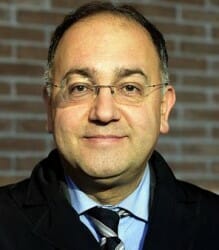
Nov 22, 2015 | Non categorizzato
 “For I consider that the sufferings of this present time are not worth comparing with the glory that is to be revealed to us. For the creation waits with eager longing for the revealing of the sons of God.” [Letter of St Paul to the Romans, 8] There are many wars being fought on our planet, in our cities, in our neighbourhoods. The weapons are many and varied, but all of them produce only dead or wounded people and destruction. The millennia pass, but a brother continues to repeat to his brother “we go to the fields.” But whenever we start building peace again after conflicts, Abel returns to life, Adam walks again with Elohim in the garden of the earth, we can look “eye to eye” at each other in full reciprocity and with absolute gratuitousness. Every time we build and rebuild peace, our action also extends to creation, nature, the earth. And when we stop being its “keepers” (guardians) and deny peace, then the earth, animals, plants are injured, killed, humiliated, dragged into the vortex of our violence innocently. We see this more and more clearly every day. Peace, shalom, is a great biblical word. It is among the most common, severe and exacting ones. The first covenant of Elohim with men comes to restore an original peace-happiness that was denied, in order to regenerate the primordial shalom betrayed by Cain’s sin and by those of his equally atrocious children. It took a first peacemaker, Noah, for the rainbow to shine again over the earth, to make the re-creation of the world and of men possible. Peacemakers are always builders of arks to save a failed humanity. They are righteous men who feel a call to leave their land to save the land of all. If the world still lives despite all the evil that we generate, it is because Noah has never stopped building arks. The prophets and the many “blessed ones” in history have kept the rainbow in the sky by never stopping to build peace on a ground that has always been bathed by the blood of brothers. Noah’s hand and that of the boat builders of peace has until now been far stronger and more creative than the hands of Cain and the owners of warships. Peacemakers are not promised the earth, or the vision of God, or mercy. They are promised only a name: “They shall be called sons of God.” It is, however, an immense name, the biggest of all, and only used for them. Peacemakers are conciliators, those who reunite broken relationships, those who spend their lives solving the conflicts generated by others. They leave their own peaceful life behind in order to make other people’s lives more peaceful. Peacemakers, the builders of this biblical shalom, become what they are by vocation only. It is not just a matter of generosity or altruism. One can dedicate one’ own life for the shalom of others and of all only if a strong voice calls them to do so from deep inside. Building peace is never just a job, even when the construction and reconstruction of peace is part of our job. These voices, these calls within cannot be resisted: they are highly effective. And we cannot resist even when we do not know by whom and where the voice that calls us comes from: to be peacemakers it is enough to hear and respond to it (Read more). by Luigino Bruni
“For I consider that the sufferings of this present time are not worth comparing with the glory that is to be revealed to us. For the creation waits with eager longing for the revealing of the sons of God.” [Letter of St Paul to the Romans, 8] There are many wars being fought on our planet, in our cities, in our neighbourhoods. The weapons are many and varied, but all of them produce only dead or wounded people and destruction. The millennia pass, but a brother continues to repeat to his brother “we go to the fields.” But whenever we start building peace again after conflicts, Abel returns to life, Adam walks again with Elohim in the garden of the earth, we can look “eye to eye” at each other in full reciprocity and with absolute gratuitousness. Every time we build and rebuild peace, our action also extends to creation, nature, the earth. And when we stop being its “keepers” (guardians) and deny peace, then the earth, animals, plants are injured, killed, humiliated, dragged into the vortex of our violence innocently. We see this more and more clearly every day. Peace, shalom, is a great biblical word. It is among the most common, severe and exacting ones. The first covenant of Elohim with men comes to restore an original peace-happiness that was denied, in order to regenerate the primordial shalom betrayed by Cain’s sin and by those of his equally atrocious children. It took a first peacemaker, Noah, for the rainbow to shine again over the earth, to make the re-creation of the world and of men possible. Peacemakers are always builders of arks to save a failed humanity. They are righteous men who feel a call to leave their land to save the land of all. If the world still lives despite all the evil that we generate, it is because Noah has never stopped building arks. The prophets and the many “blessed ones” in history have kept the rainbow in the sky by never stopping to build peace on a ground that has always been bathed by the blood of brothers. Noah’s hand and that of the boat builders of peace has until now been far stronger and more creative than the hands of Cain and the owners of warships. Peacemakers are not promised the earth, or the vision of God, or mercy. They are promised only a name: “They shall be called sons of God.” It is, however, an immense name, the biggest of all, and only used for them. Peacemakers are conciliators, those who reunite broken relationships, those who spend their lives solving the conflicts generated by others. They leave their own peaceful life behind in order to make other people’s lives more peaceful. Peacemakers, the builders of this biblical shalom, become what they are by vocation only. It is not just a matter of generosity or altruism. One can dedicate one’ own life for the shalom of others and of all only if a strong voice calls them to do so from deep inside. Building peace is never just a job, even when the construction and reconstruction of peace is part of our job. These voices, these calls within cannot be resisted: they are highly effective. And we cannot resist even when we do not know by whom and where the voice that calls us comes from: to be peacemakers it is enough to hear and respond to it (Read more). by Luigino Bruni
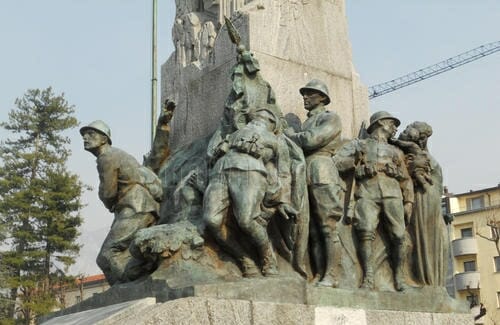
Nov 21, 2015 | Senza categoria
 “You have heard that it was said, ‘Love your friends and hate your enemies.’ “But now I tell you: love your enemies and pray for those who persecute you, so that you may become the children of your Father in heaven” (Mt 5:43-48). This precept contains an untiring pardon that continually restores the circle of life that flows between two points: God, Me, Brother. It brings a work of peace with a view to unity wherever it has been interrupted. Peace is made with enemies, not friends. This would appear obvious, but usually it is misunderstood in a fear that makes you fear war and fear peace. While love unites, fear heaps together. One is centrifugal and generates the community by removing the roadblocks and limits; the other is centripetal and predetermines the occlusion of the communicating vessels. One illumines, the other darkens. One is a regime of freedom, the other a terrifying tyranny. Where there is love you deal in reason; where there is fear you do not understand reasons, you act instinctively: see ghosts and shoot. Social organisations that prescind the law of charity no longer see brothers and sisters, but mammals to be exploited and killed, even worse than some ancient societies were towards slaves. Where charity is lacking, people must be held by the police and enclosed in concentration camps. . . Jesus comes to put man on his feet, in freedom; and his followers should continue to apply the strength of his ideas, continually finding solutions for man in God. If not existence will unfold as a deadly search through a strenuous construction of hateful motives: a progressive hypothermia that gives the illusion of a vital process. Love drives out fear. Those who love are unafraid: their Self – the possible subject of fear – no longer exists. The Other exists, the Other with whom our Self has identified The Other dressed as a brother, is Jesus. In this way, especially now, the greatest barrier of all is removed: fear. Under the influence of fear the Self fears that it is alone: alone in the darkness, boxed in, in a box that soon resembles the walls of a tomb. If you step out of that solitude, you are free. You encounter the brother and with him place yourself in God. (Igino Giordani, Il fratello, (Rome: Città Nuova, 2011 [1954]), p. 85 – 87.
“You have heard that it was said, ‘Love your friends and hate your enemies.’ “But now I tell you: love your enemies and pray for those who persecute you, so that you may become the children of your Father in heaven” (Mt 5:43-48). This precept contains an untiring pardon that continually restores the circle of life that flows between two points: God, Me, Brother. It brings a work of peace with a view to unity wherever it has been interrupted. Peace is made with enemies, not friends. This would appear obvious, but usually it is misunderstood in a fear that makes you fear war and fear peace. While love unites, fear heaps together. One is centrifugal and generates the community by removing the roadblocks and limits; the other is centripetal and predetermines the occlusion of the communicating vessels. One illumines, the other darkens. One is a regime of freedom, the other a terrifying tyranny. Where there is love you deal in reason; where there is fear you do not understand reasons, you act instinctively: see ghosts and shoot. Social organisations that prescind the law of charity no longer see brothers and sisters, but mammals to be exploited and killed, even worse than some ancient societies were towards slaves. Where charity is lacking, people must be held by the police and enclosed in concentration camps. . . Jesus comes to put man on his feet, in freedom; and his followers should continue to apply the strength of his ideas, continually finding solutions for man in God. If not existence will unfold as a deadly search through a strenuous construction of hateful motives: a progressive hypothermia that gives the illusion of a vital process. Love drives out fear. Those who love are unafraid: their Self – the possible subject of fear – no longer exists. The Other exists, the Other with whom our Self has identified The Other dressed as a brother, is Jesus. In this way, especially now, the greatest barrier of all is removed: fear. Under the influence of fear the Self fears that it is alone: alone in the darkness, boxed in, in a box that soon resembles the walls of a tomb. If you step out of that solitude, you are free. You encounter the brother and with him place yourself in God. (Igino Giordani, Il fratello, (Rome: Città Nuova, 2011 [1954]), p. 85 – 87.
Nov 20, 2015 | Non categorizzato
https://vimeo.com/140815700 Copyright 2015 © CSC Audiovisivi – All rights reserved
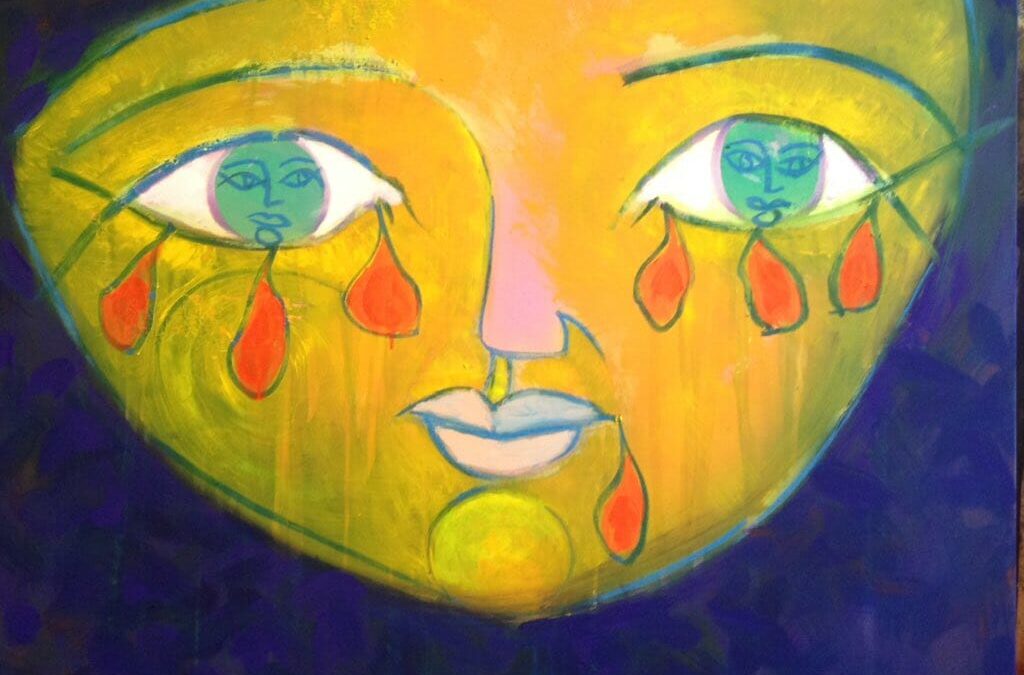
Nov 20, 2015 | Focolare Worldwide
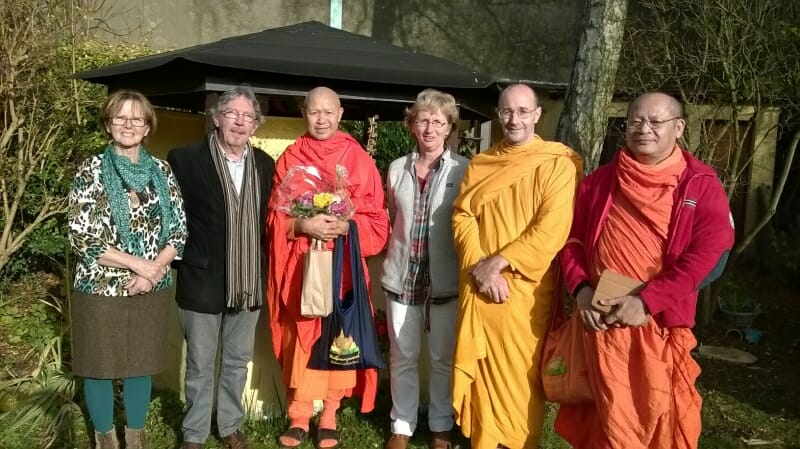 In the face of the dramatic events that took place in Paris and in many other parts of the world, “the Focolare Movement, while it weeps with those who weep, continues to believe in the path of dialogue, of acceptance and of respect for the other, whoever that may be and from whatever provenance, religious belief, and ethnicity,” Focolare president Maria Voce stated on the day after the attacks in the French capital. The Focolare, together with those with different responsibilities who work for peace even at personal risk, renews its commitment to intensify and multiply acts and gestures of reconciliation, spaces for dialogue and communion, opportunities for encounter and sharing at all levels and in all parts of the world to embrace the cry of humanity and transform it into new hope.”
In the face of the dramatic events that took place in Paris and in many other parts of the world, “the Focolare Movement, while it weeps with those who weep, continues to believe in the path of dialogue, of acceptance and of respect for the other, whoever that may be and from whatever provenance, religious belief, and ethnicity,” Focolare president Maria Voce stated on the day after the attacks in the French capital. The Focolare, together with those with different responsibilities who work for peace even at personal risk, renews its commitment to intensify and multiply acts and gestures of reconciliation, spaces for dialogue and communion, opportunities for encounter and sharing at all levels and in all parts of the world to embrace the cry of humanity and transform it into new hope.” 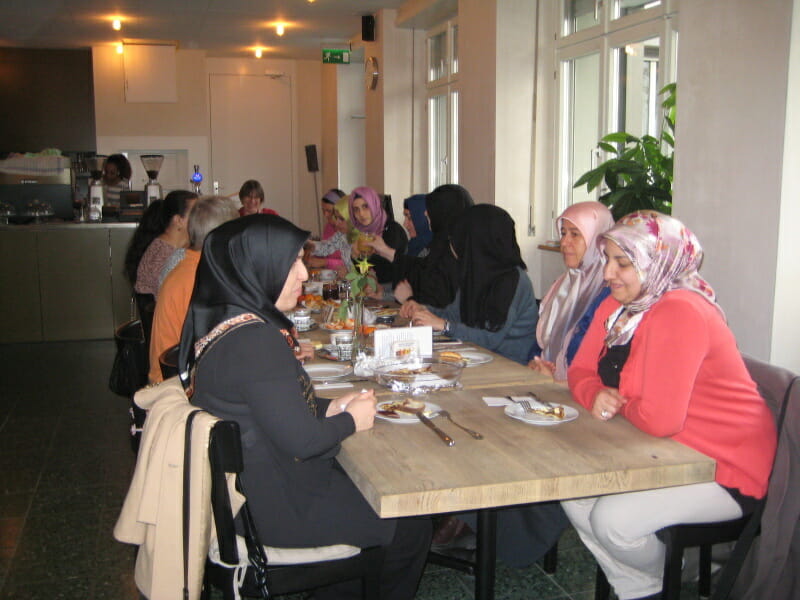 A variety of personal and collective initiatives are currently underway. In France, there was the woman from Paris who paid a visit to a Moroccan store owner and to an Algerian pharmacist to renew their friendship; the couple from Vendée who support local associations that welcome immigrants, involved in the Islamic-Christian Friends Group (GAIC) in Mulhouse; in Alsace, which has intensified its involvement in the Interreligious Week that is taking place in November; a parish priest from the Paris suburb, who wrote a common declaration of peace with Muslims from his quarter; the active participation in the interreligious festival Vivre ensemble à Cannes that was awarded the Chiara Lubich Fraternity Prize; the shared organizing of the 2cnd edition of “Muslims and Christians together with Mary” planned for April 2, 2016 at the Basilica of Longpont, Essone. In Italy, everyone is being invited to get out and meet the Muslim world that lives on Italian soil, striving to build bridges, to create relationships, to work together in concrete projects for peace. In some cities these relationships have been in place for quite a while and have already borne the fruits of brotherhood.
A variety of personal and collective initiatives are currently underway. In France, there was the woman from Paris who paid a visit to a Moroccan store owner and to an Algerian pharmacist to renew their friendship; the couple from Vendée who support local associations that welcome immigrants, involved in the Islamic-Christian Friends Group (GAIC) in Mulhouse; in Alsace, which has intensified its involvement in the Interreligious Week that is taking place in November; a parish priest from the Paris suburb, who wrote a common declaration of peace with Muslims from his quarter; the active participation in the interreligious festival Vivre ensemble à Cannes that was awarded the Chiara Lubich Fraternity Prize; the shared organizing of the 2cnd edition of “Muslims and Christians together with Mary” planned for April 2, 2016 at the Basilica of Longpont, Essone. In Italy, everyone is being invited to get out and meet the Muslim world that lives on Italian soil, striving to build bridges, to create relationships, to work together in concrete projects for peace. In some cities these relationships have been in place for quite a while and have already borne the fruits of brotherhood. 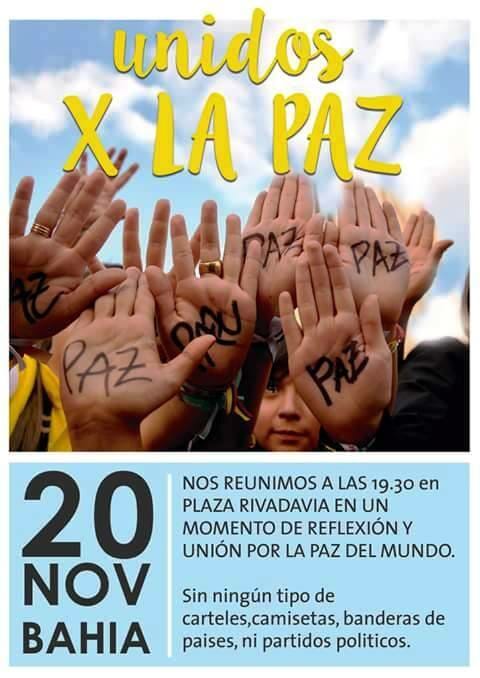 In Great Britain a prayer chain was begun for the victims of the tragedy, asking God to make them “instruments for bringing unity into their local environments.” In Ireland an evening event was held to acquaint people with the Syrian culture in view of welcoming the refugees. In Switzerland Muslim and Christian women meet every two months to share their faith. In Lugano there was an intense sharing with Imam Samir Jelassi. In Meiningen, Austria, a few days before the attack, 150 people gathered with Cenap Aydin, Director of the Tevere Institute in Rome, Italy, and Dr. Siebenrock from the University of Innsbruck, from a study group of Muslim theologians from Iran, Tunisia, Algeria and Turkey, and with Catholic theologians. In Augsburg, Germany, there was the “7 On the Dot – Augsburg Prays For Peace,” every evening at seven o’clock in one of the largest churches in the city – once in the Catholic church, once in the Lutheran church. One refugee, one expert or representative from an NGO would describe the situation of a country under siege. There was also a peace march in Loppiano, Italy and a public rally in Bahia Blanca Square in Argentina without national flags or party banners. In California a benefit dinner was held to gather funds in support of refugees, preceded by a moment of prayer for the victims of the terrorist attacks in Paris and Beirut, and a presentation of the United World Project. On November 14th in Honduras there was a peace march organized by the Focolare Movement in solidarity with Syria which gathered people from several youth movements with a message of unity and dialogue. Luigi Butori writes from Asia: “I think of the dead from the daily attacks in southern Thailand, of the Rohingya refugees. I think of the Muslim friends at the mosque in Chiang Mai. I think of Mae Sot where refugees continue to arrive from Myanmar in search of a better life.”
In Great Britain a prayer chain was begun for the victims of the tragedy, asking God to make them “instruments for bringing unity into their local environments.” In Ireland an evening event was held to acquaint people with the Syrian culture in view of welcoming the refugees. In Switzerland Muslim and Christian women meet every two months to share their faith. In Lugano there was an intense sharing with Imam Samir Jelassi. In Meiningen, Austria, a few days before the attack, 150 people gathered with Cenap Aydin, Director of the Tevere Institute in Rome, Italy, and Dr. Siebenrock from the University of Innsbruck, from a study group of Muslim theologians from Iran, Tunisia, Algeria and Turkey, and with Catholic theologians. In Augsburg, Germany, there was the “7 On the Dot – Augsburg Prays For Peace,” every evening at seven o’clock in one of the largest churches in the city – once in the Catholic church, once in the Lutheran church. One refugee, one expert or representative from an NGO would describe the situation of a country under siege. There was also a peace march in Loppiano, Italy and a public rally in Bahia Blanca Square in Argentina without national flags or party banners. In California a benefit dinner was held to gather funds in support of refugees, preceded by a moment of prayer for the victims of the terrorist attacks in Paris and Beirut, and a presentation of the United World Project. On November 14th in Honduras there was a peace march organized by the Focolare Movement in solidarity with Syria which gathered people from several youth movements with a message of unity and dialogue. Luigi Butori writes from Asia: “I think of the dead from the daily attacks in southern Thailand, of the Rohingya refugees. I think of the Muslim friends at the mosque in Chiang Mai. I think of Mae Sot where refugees continue to arrive from Myanmar in search of a better life.”
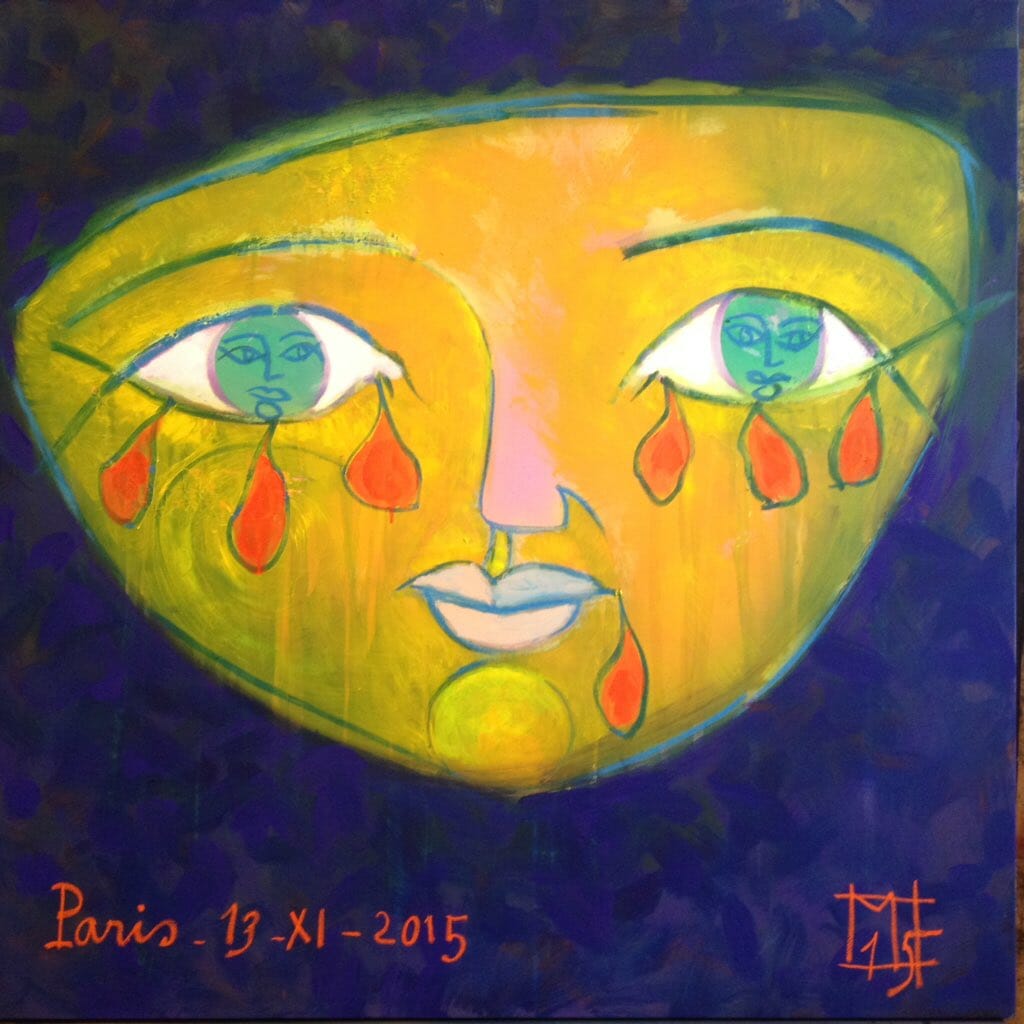
“Dieu pleure avec nous” © Michel Pochet
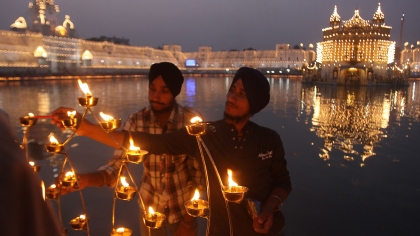
Nov 19, 2015 | Focolare Worldwide
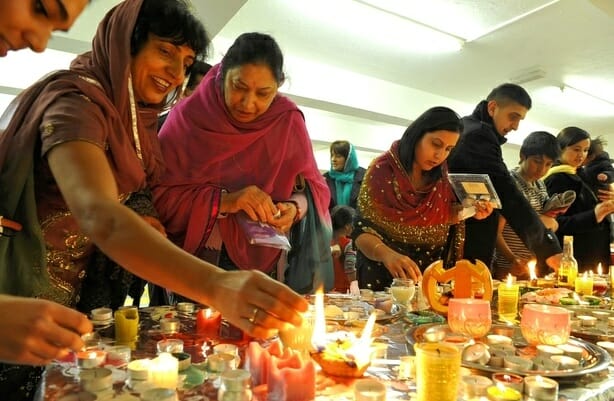 During the Ashwayuja month, which usually falls between October and November, India is clothed in celebration and light. It’s Diwali, a tradition that goes back to the ancient legend of King Rama who after 14 years of exile in the forest, returned to the city of Ayodhya where he was welcomed by a parade (avali) of lights (dipa) in his honour. Hence the name: Dipawali or Diwali.This year it was celebrated during 10-15 November. The festivities begin with a good house cleaning while many small lamps are positioned in several points of the dwelling – entrances, window sills, lounges – and in the darkness of the night the whole city is transformed into a dreamlike fairyland scene. The light symbolises knowledge and inner awareness. But like a kaleidoscope, the meanings intersect and are magnified: knowledge conquers ignorance; interiority brings peace. Good conquers evil; light triumphs over shadows of darkness, and it unleashes the life force. People look forward to the feast all year. On the third day – the actual Diwali – people put on new clothes, adorn themselves with wreathes of flowers and glittering jewelry. They exchange gifts with relatives and friends, especially sweets and homemade snacks. Everyone attends the religious services in honour of Laskshmi, the goddess of wellbeing. In an atmosphere of peace, they carry leaves, coins and religious images, chanting Vedic mantras to receive her blessing. Then there are the games: cards, especially rummy, mimes, dances, treasure hunts and fireworks.
During the Ashwayuja month, which usually falls between October and November, India is clothed in celebration and light. It’s Diwali, a tradition that goes back to the ancient legend of King Rama who after 14 years of exile in the forest, returned to the city of Ayodhya where he was welcomed by a parade (avali) of lights (dipa) in his honour. Hence the name: Dipawali or Diwali.This year it was celebrated during 10-15 November. The festivities begin with a good house cleaning while many small lamps are positioned in several points of the dwelling – entrances, window sills, lounges – and in the darkness of the night the whole city is transformed into a dreamlike fairyland scene. The light symbolises knowledge and inner awareness. But like a kaleidoscope, the meanings intersect and are magnified: knowledge conquers ignorance; interiority brings peace. Good conquers evil; light triumphs over shadows of darkness, and it unleashes the life force. People look forward to the feast all year. On the third day – the actual Diwali – people put on new clothes, adorn themselves with wreathes of flowers and glittering jewelry. They exchange gifts with relatives and friends, especially sweets and homemade snacks. Everyone attends the religious services in honour of Laskshmi, the goddess of wellbeing. In an atmosphere of peace, they carry leaves, coins and religious images, chanting Vedic mantras to receive her blessing. Then there are the games: cards, especially rummy, mimes, dances, treasure hunts and fireworks.  Diwali is not only a Hindu feast. It is a cultural and social event that involves the whole country, with some variations depending on the region and its dominant religion. It is celebrated by Muslims, Buddhists and Christians. For five days the Focolare houses in Mumbai, New Delhi, Bangalore, Goa and the 13 educational centres that are connected to them, are covered in light. The centres serve 1,500 children and teenagers, most of them Hindu who, thanks to financial support from a distance are provided with an education, a daily hot meal and health care (www.afnonlus.org). The Diwali rituals reveal the great sensitivity of the Indian people the way it values the family, friendship, harmony of life and respect for the natural environment. It is significant that for Diwali, you buy impersonal objects, but you give gifts that have been made by your own hands. It is also significant that along with prayers, fruits of the earth are offered as an expression of gratitude towards Nature and its gifts. This custom is echoed in Pope Francis’s Encyclical Laudato si’. It was precisely that document and the inseparable link between living in harmony with creation and with others, that inspired the Pontifical Council for Interreligious Dialogue to send the Deepavali Message from Pope Francis to the nearly billion followers of the Sanatan Dhama (what Westerners call Hinduism). Pope Francis’s Message shares the wish that: “we Hindus and Christians, together with people of all religious traditions and good will, always foster a culture which promotes human ecology.” The Message also expresses a wish that “together, we consciously give ourselves to protecting nature, defending the poor, and building networks of respect and fraternity” (Laudato Si, 201). This will anticipate “the growth of the tree of peace” for those who wish to prepare themselves well for the feast of Christmas.
Diwali is not only a Hindu feast. It is a cultural and social event that involves the whole country, with some variations depending on the region and its dominant religion. It is celebrated by Muslims, Buddhists and Christians. For five days the Focolare houses in Mumbai, New Delhi, Bangalore, Goa and the 13 educational centres that are connected to them, are covered in light. The centres serve 1,500 children and teenagers, most of them Hindu who, thanks to financial support from a distance are provided with an education, a daily hot meal and health care (www.afnonlus.org). The Diwali rituals reveal the great sensitivity of the Indian people the way it values the family, friendship, harmony of life and respect for the natural environment. It is significant that for Diwali, you buy impersonal objects, but you give gifts that have been made by your own hands. It is also significant that along with prayers, fruits of the earth are offered as an expression of gratitude towards Nature and its gifts. This custom is echoed in Pope Francis’s Encyclical Laudato si’. It was precisely that document and the inseparable link between living in harmony with creation and with others, that inspired the Pontifical Council for Interreligious Dialogue to send the Deepavali Message from Pope Francis to the nearly billion followers of the Sanatan Dhama (what Westerners call Hinduism). Pope Francis’s Message shares the wish that: “we Hindus and Christians, together with people of all religious traditions and good will, always foster a culture which promotes human ecology.” The Message also expresses a wish that “together, we consciously give ourselves to protecting nature, defending the poor, and building networks of respect and fraternity” (Laudato Si, 201). This will anticipate “the growth of the tree of peace” for those who wish to prepare themselves well for the feast of Christmas.
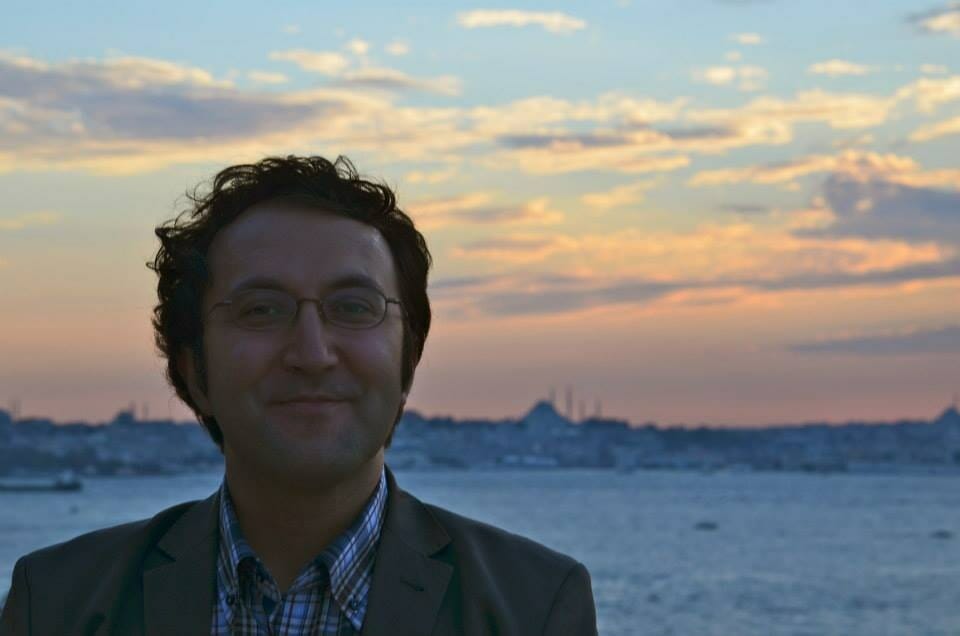
Nov 19, 2015 | Focolare Worldwide, Senza categoria
 “The tragic news of the horrendous terrorist attacks in the French capital has filled us with profound sorrow. Our thoughts, solidarity and prayers go to the victims, the wounded and their families, to their loved ones and to the French people.” With these words of condolence, Mustafa Cenap Aydin, director of the Tevere Centre for Dialogue in Rome expressed his dismay over recent terrorist attacks in France. He went on: “I unite myself to the message of the learned Muslim scholar, writer and educational activist M. Fethullah Gülen: ‘Every terrorist act from whomever it comes, is a heavy blow to the peace and tranquility of all humanity. These vile acts of terrorism are attacks not only against the French people, but also against the universal values of human brotherhood’.” “We will never grow tired of condemning all those who feed violence, hatred and fear by reproachfully abusing a religion, an ideology, for cruel and inhuman goals.” Gülen, who inspires millions with his message of love and compassion, invites everyone to join him in prayer that God would lead “all of humanity to a world of peace and tranquility” and “to act in solidarity against every form of terrorism; to become involved in the realisation of universal peace”. “We shall respond to these ‘inhuman‘ acts,” Mustafa Cenap Aydin concluded, “by reinforcing even more the spirit of unity and brotherhood. These attacks cannot but convince us even more of the importance of dialogue, conciliation and brotherhood; and to increase our commitment to spreading it. We are obviously convinced that peace will prevail. Let us call upon and appeal to one and all, to unite with us in this effort.” Source: Città Nuova in Italian
“The tragic news of the horrendous terrorist attacks in the French capital has filled us with profound sorrow. Our thoughts, solidarity and prayers go to the victims, the wounded and their families, to their loved ones and to the French people.” With these words of condolence, Mustafa Cenap Aydin, director of the Tevere Centre for Dialogue in Rome expressed his dismay over recent terrorist attacks in France. He went on: “I unite myself to the message of the learned Muslim scholar, writer and educational activist M. Fethullah Gülen: ‘Every terrorist act from whomever it comes, is a heavy blow to the peace and tranquility of all humanity. These vile acts of terrorism are attacks not only against the French people, but also against the universal values of human brotherhood’.” “We will never grow tired of condemning all those who feed violence, hatred and fear by reproachfully abusing a religion, an ideology, for cruel and inhuman goals.” Gülen, who inspires millions with his message of love and compassion, invites everyone to join him in prayer that God would lead “all of humanity to a world of peace and tranquility” and “to act in solidarity against every form of terrorism; to become involved in the realisation of universal peace”. “We shall respond to these ‘inhuman‘ acts,” Mustafa Cenap Aydin concluded, “by reinforcing even more the spirit of unity and brotherhood. These attacks cannot but convince us even more of the importance of dialogue, conciliation and brotherhood; and to increase our commitment to spreading it. We are obviously convinced that peace will prevail. Let us call upon and appeal to one and all, to unite with us in this effort.” Source: Città Nuova in Italian
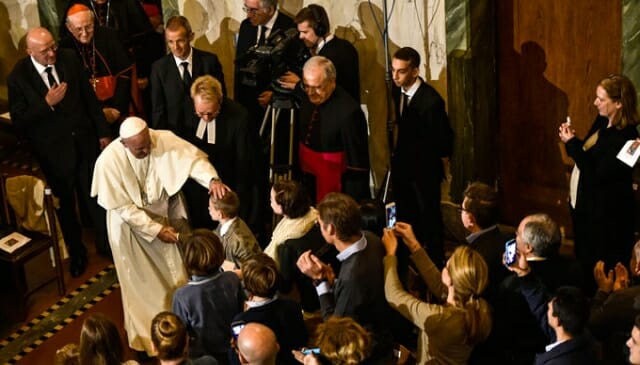
Nov 18, 2015 | Non categorizzato
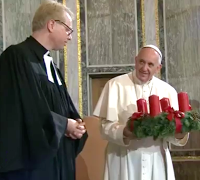 Home of Lutherans in Rome, the Christ Church welcomed Pope Francis on Sunday, November 15. Before Francis, John Paul II was the first Pontiff to enter a Lutheran Church and, in 2010, Benedict XVI was the second. “Our 500-member community is relatively small, all of us on the front lines in the field of ecumenism. We are active as a parish at various levels in the cit, but also in our own family, with colleagues at work, with neighbours or, like me someone who has lived in a Focolare community for more than thirty years,” says Heike Vesper. She was there on Sunday along with Catholic women focolarini who often accompany her to the Sunday liturgy. Heike called the Bishop of Rome an “evangelical Pope”, a pastor who focused his remarks that day on our common witness to Jesus Christ, “both in Lutheran expressions and in Roman Catholic expressions” on the importance of life and not so much interpretation. He spoke from his heart as he confided to us what he likes: to visit the sick and the incarcerated. The meeting and the prayer service with the Pope was new in its kind, you could say that it was a lesson on what should be of importance among Christians of different Churches: dialogue and deep listening, mutual trust, sincere and truthful answers, common prayer and listening to the Gospel.” Jens-Martin Kruse, Pastor of the Evanglical Lutheran Church, gave a warm welcome while remembering the victims of the Paris attacks: “Let us trust that Jesus has conquered the world and therefore not allow ourselves to be conditioned by fear.” “My brother Pastor mentioned the tragic events in Paris,” the Pope remarked. “Even God’s name is being used to close hearts.”
Home of Lutherans in Rome, the Christ Church welcomed Pope Francis on Sunday, November 15. Before Francis, John Paul II was the first Pontiff to enter a Lutheran Church and, in 2010, Benedict XVI was the second. “Our 500-member community is relatively small, all of us on the front lines in the field of ecumenism. We are active as a parish at various levels in the cit, but also in our own family, with colleagues at work, with neighbours or, like me someone who has lived in a Focolare community for more than thirty years,” says Heike Vesper. She was there on Sunday along with Catholic women focolarini who often accompany her to the Sunday liturgy. Heike called the Bishop of Rome an “evangelical Pope”, a pastor who focused his remarks that day on our common witness to Jesus Christ, “both in Lutheran expressions and in Roman Catholic expressions” on the importance of life and not so much interpretation. He spoke from his heart as he confided to us what he likes: to visit the sick and the incarcerated. The meeting and the prayer service with the Pope was new in its kind, you could say that it was a lesson on what should be of importance among Christians of different Churches: dialogue and deep listening, mutual trust, sincere and truthful answers, common prayer and listening to the Gospel.” Jens-Martin Kruse, Pastor of the Evanglical Lutheran Church, gave a warm welcome while remembering the victims of the Paris attacks: “Let us trust that Jesus has conquered the world and therefore not allow ourselves to be conditioned by fear.” “My brother Pastor mentioned the tragic events in Paris,” the Pope remarked. “Even God’s name is being used to close hearts.”  “Pope Francis’s freedom and sincerity was very touching,” writes Heike. “He gave his answers from the perspective of a fellow pilgrim on the same road as the listeners. He stressed the importance of following one’s conscience, of living for the neighbour; and that with faith, that is with love, all the walls will crumble.” The fraternal tone of the dialogue created a family atmosphere that was “more and more deep and encouraging.” Three questions were posed to Pope Francis: What does it mean to be Pope? What is the duty of Christians towards the needy? What must be done so that we can celebrate the Eucharist together, the Lord’s Supper, when husband and wife belong to different Churches? “Those who find themselves in this situation,” Heike explained, “suffer from the division even more. It was not easy for the Pope to answer, in fact, in spite of the steps that have already been taken, theological questions remain open concerning the Magisterium, the vision of the Church, that are still an impediment to a common celebration. The Pope mentions a few possible paths for sharing the Lord’s Supper. He referred to the Gospel, to Saint Paul: “There is one Lord, one faith, one baptism” (Eph 4:5). He invited everyone to listen to his or her own conscience, to give more importance to life, to the common journey – more than to the different interpretations. His words instilled hope and peace. Even the gift he brought had a prophetic dimension: a chalice and paten for the celebration of the Eucharist.” The Gospel of the day was the Final Judgement (Mt 23) that reminds us that we will be judged on our love for the poor and needy. The Pope brought to the attention of those who say “our books say one thing and yours say another,” the words of a Lutheran idea: “There’s the hour of reconciled diversity.” And he concluded saying: “Today we ask the grace of this diversity reconciled in the Lord, the reconciliation of that God who came amongst us to serve and not to be served.”
“Pope Francis’s freedom and sincerity was very touching,” writes Heike. “He gave his answers from the perspective of a fellow pilgrim on the same road as the listeners. He stressed the importance of following one’s conscience, of living for the neighbour; and that with faith, that is with love, all the walls will crumble.” The fraternal tone of the dialogue created a family atmosphere that was “more and more deep and encouraging.” Three questions were posed to Pope Francis: What does it mean to be Pope? What is the duty of Christians towards the needy? What must be done so that we can celebrate the Eucharist together, the Lord’s Supper, when husband and wife belong to different Churches? “Those who find themselves in this situation,” Heike explained, “suffer from the division even more. It was not easy for the Pope to answer, in fact, in spite of the steps that have already been taken, theological questions remain open concerning the Magisterium, the vision of the Church, that are still an impediment to a common celebration. The Pope mentions a few possible paths for sharing the Lord’s Supper. He referred to the Gospel, to Saint Paul: “There is one Lord, one faith, one baptism” (Eph 4:5). He invited everyone to listen to his or her own conscience, to give more importance to life, to the common journey – more than to the different interpretations. His words instilled hope and peace. Even the gift he brought had a prophetic dimension: a chalice and paten for the celebration of the Eucharist.” The Gospel of the day was the Final Judgement (Mt 23) that reminds us that we will be judged on our love for the poor and needy. The Pope brought to the attention of those who say “our books say one thing and yours say another,” the words of a Lutheran idea: “There’s the hour of reconciled diversity.” And he concluded saying: “Today we ask the grace of this diversity reconciled in the Lord, the reconciliation of that God who came amongst us to serve and not to be served.”
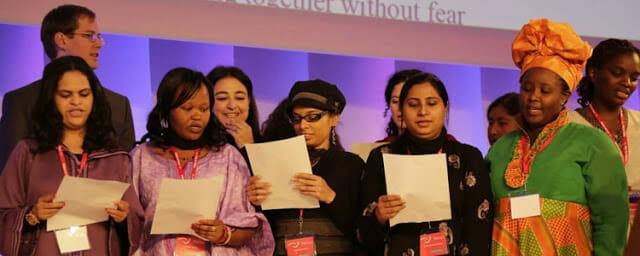
Nov 17, 2015 | Senza categoria
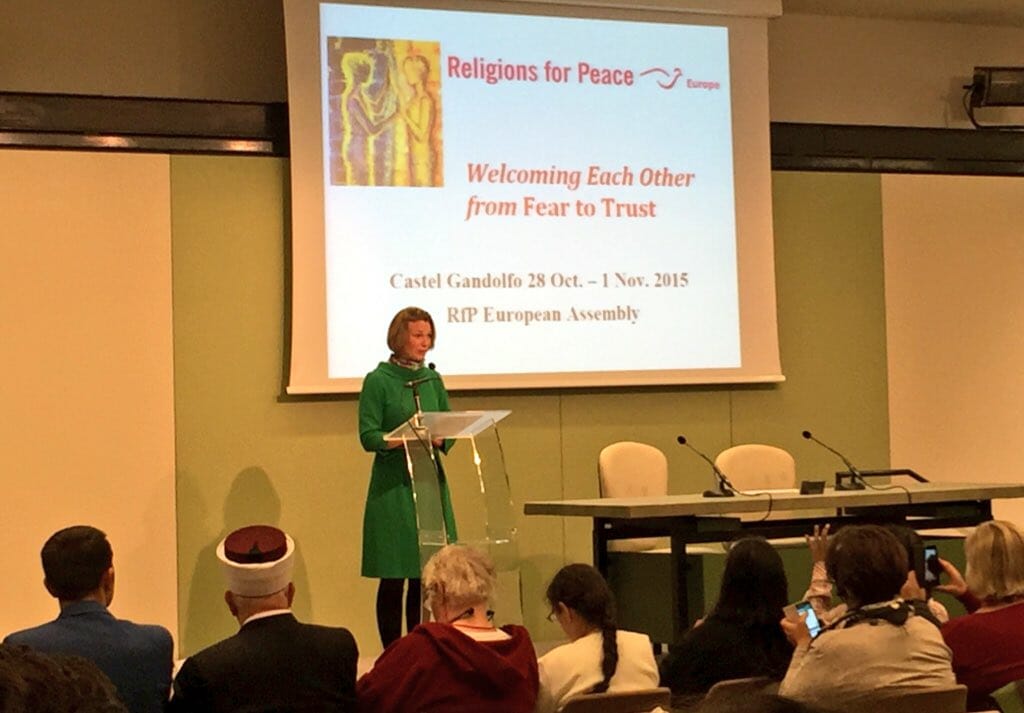
The Assembly was held on 28-31 October 2015 at the Mariapolis Centre in Castel Gandolfo (Rome, Italy).
 “From fear to trust” read the title of the convention which was attended by about fifty young people and 150 adults, among whom some leading figures of the different religious traditions. The moments for sharing the so-called good practices by protagonists from different European countries were particularly effective. The work done in plenary sessions and workshops sought to respond to the challenges that the European continent faces today, both in view of the throngs of migrants, and the growth of personal and group sentiments of racist nature. Particular attention was given to the role of the media and to its negative manipulation of public opinion, increasing fears, to the detriment of the positive elements which already exist and which do not make the news. From the presentation of the young people, a multiethnic, multicultural and multi-religious cross-section of Europe emerged which is not just a futuristic projection but already a reality. The youths also expressed their commitment to work towards building constructive relationships between people of different traditions. From these four days of work, an updated role has emerged for Religions for Peace in Europe, in which the organization, now active for several decades, is called to coordinate and to work in collaboration and by networking with other agencies actively involved in the fields of interreligious and intercultural dialogue, and in the fields of welcoming and integration. A commitment which not only conveys “our fraternal support to the families and friends of the innocent victims and the entire French people, through affectionate remembrance and prayer” which is renewed in the desire to “proceed with our joint actions for justice and peace.” See also: Protagonists in building a world of peace – opening speech of Maria Voce, President of the Focolare
“From fear to trust” read the title of the convention which was attended by about fifty young people and 150 adults, among whom some leading figures of the different religious traditions. The moments for sharing the so-called good practices by protagonists from different European countries were particularly effective. The work done in plenary sessions and workshops sought to respond to the challenges that the European continent faces today, both in view of the throngs of migrants, and the growth of personal and group sentiments of racist nature. Particular attention was given to the role of the media and to its negative manipulation of public opinion, increasing fears, to the detriment of the positive elements which already exist and which do not make the news. From the presentation of the young people, a multiethnic, multicultural and multi-religious cross-section of Europe emerged which is not just a futuristic projection but already a reality. The youths also expressed their commitment to work towards building constructive relationships between people of different traditions. From these four days of work, an updated role has emerged for Religions for Peace in Europe, in which the organization, now active for several decades, is called to coordinate and to work in collaboration and by networking with other agencies actively involved in the fields of interreligious and intercultural dialogue, and in the fields of welcoming and integration. A commitment which not only conveys “our fraternal support to the families and friends of the innocent victims and the entire French people, through affectionate remembrance and prayer” which is renewed in the desire to “proceed with our joint actions for justice and peace.” See also: Protagonists in building a world of peace – opening speech of Maria Voce, President of the Focolare
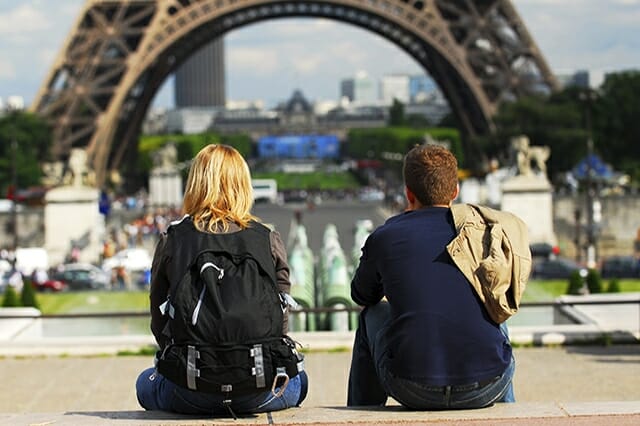
Nov 17, 2015 | Focolare Worldwide
 “This is a horrific and frightening moment. But we are also surprised at the international impact, by all the public support, and we feel responsible for responding appropriately.” Muriel Fleury is the director of the Focolare’s French magazine, Nouvelle Cité and this was her answer to Radio inBlu’s question about why such events could take place in France where the process of integration is older than in any other European country. She responded: “Although in the past we were successful at integrating other peoples, it seems that in recent years we have fallen a bit behind. We want multiculturalism, in the sense of welcoming other, but without taking their cultures into account, their values that are quite different from our own. Therefore, all the places that lend themselves to dialogue, true encounter, true cultural and religious sharing need to be developed. Our failure to have an authentic encounter has led to today’s tragic situation.” Paul Wirth, a member of the Focolare engaged in interreligious dialogue, remarked: “I belong to an Islamic-Christian Friendship Group (GAIC) in France. Every year we hold a week of meetings (the most recent beginning on November 12). We feel that it is very important to make everyone aware, so that people will make a distinction between authentic Muslims and those who claim to be Muslims but project hatred.” Speaking of the reaction of Muslim friends to attacks on Friday evening, he said: “There are many Muslim associations that have put out press releases condemning the attacks as barbaric, intolerable; they want to be close to the victims and their families. Just today I saw that many Muslim associations spoke of this as a horrible moment, and we Christians believe that these tragic events do not affect the relations of fraternal love that have been established amongst us [Christians and Muslims].” In her analysis, Muriel Fleury, director of Nouvelle Cité, pointed to other causes of the unease: “For economic reasons it seems that we have completely abandoned entire quarters of the city where even the police are at risk if they go into them. And our refusal to take care of these young foreigners, to not provide them some wholesome activity to keep them busy, to not be near to them, has led some of them to join radical pseudo-religious groups that have taken them away, many of them, and now we see the results.” From where do we begin, then, to mend such a complex fabric? “The problem,” says Fleury, “is that we are in France where, unfortunately, a spiritual void has been created. This French secularism has led to a denial of the spiritual dimension of a human being. Now we must take a new path, to develop the culture of encounter, of living together. Religions will be one of these paths, religions that are able to work with one another – even with the Republic. There are already signals in this direction that try to find solutions that include every voice from every religion.”
“This is a horrific and frightening moment. But we are also surprised at the international impact, by all the public support, and we feel responsible for responding appropriately.” Muriel Fleury is the director of the Focolare’s French magazine, Nouvelle Cité and this was her answer to Radio inBlu’s question about why such events could take place in France where the process of integration is older than in any other European country. She responded: “Although in the past we were successful at integrating other peoples, it seems that in recent years we have fallen a bit behind. We want multiculturalism, in the sense of welcoming other, but without taking their cultures into account, their values that are quite different from our own. Therefore, all the places that lend themselves to dialogue, true encounter, true cultural and religious sharing need to be developed. Our failure to have an authentic encounter has led to today’s tragic situation.” Paul Wirth, a member of the Focolare engaged in interreligious dialogue, remarked: “I belong to an Islamic-Christian Friendship Group (GAIC) in France. Every year we hold a week of meetings (the most recent beginning on November 12). We feel that it is very important to make everyone aware, so that people will make a distinction between authentic Muslims and those who claim to be Muslims but project hatred.” Speaking of the reaction of Muslim friends to attacks on Friday evening, he said: “There are many Muslim associations that have put out press releases condemning the attacks as barbaric, intolerable; they want to be close to the victims and their families. Just today I saw that many Muslim associations spoke of this as a horrible moment, and we Christians believe that these tragic events do not affect the relations of fraternal love that have been established amongst us [Christians and Muslims].” In her analysis, Muriel Fleury, director of Nouvelle Cité, pointed to other causes of the unease: “For economic reasons it seems that we have completely abandoned entire quarters of the city where even the police are at risk if they go into them. And our refusal to take care of these young foreigners, to not provide them some wholesome activity to keep them busy, to not be near to them, has led some of them to join radical pseudo-religious groups that have taken them away, many of them, and now we see the results.” From where do we begin, then, to mend such a complex fabric? “The problem,” says Fleury, “is that we are in France where, unfortunately, a spiritual void has been created. This French secularism has led to a denial of the spiritual dimension of a human being. Now we must take a new path, to develop the culture of encounter, of living together. Religions will be one of these paths, religions that are able to work with one another – even with the Republic. There are already signals in this direction that try to find solutions that include every voice from every religion.”
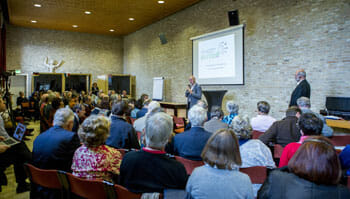
Nov 16, 2015 | Focolare Worldwide

© Thomas Mandl
More information about “Together for Europe” can be found at: www.together4europe.org
The initiative “Together for Europe” is an international network of about 300 christian movements and communities from all over Europe. It originated in 1999 and connects evangelical, Roman Catholic, Anglican and Orthodox Christians as well as members of free churches and new communities. 70 communities constitute the group “Friends of Together for Europe”.
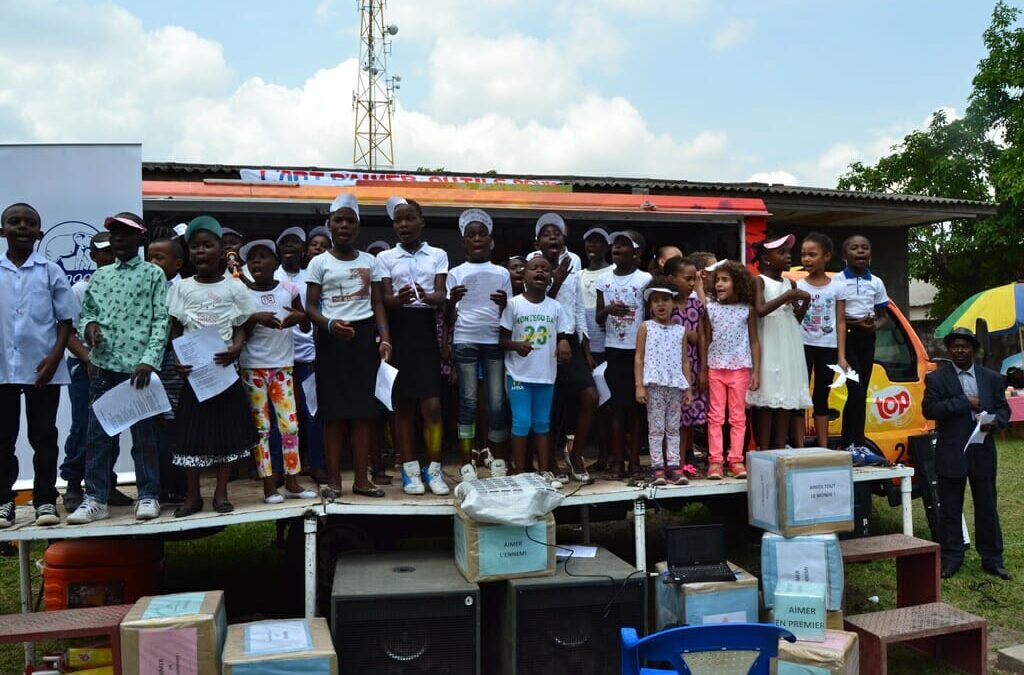
Nov 16, 2015 | Focolare Worldwide
“Just try to imagine 2,000 kids rapping in unison: “Peace! Peace! War is death, peace is love.“ https://vimeo.com/148206731 And to think that all this has been happening for decades in a country torn apart by armed conflicts, the victims of which are mostly children. Now you don’t need to dream – Martine recounts – because all this really happened last 7 November in Kinshasa in the Democratic Republic of Congo.” The art of loving for peace was, in fact, the title of the day meeting which the children of the Focolare Movement in Kinshasa held with the schools of the Petite Flamme social project which had thought of organizing an event to say: no to war and yes to peace and love, and involving their friends and other 20 schools of the city in this undertaking. On Saturday morning, under a dark sky that seemed to forecast rain but which later cleared out to a burning sun, a storm of children invaded the playgrounds of the main Petite Flamme School. Songs, dances, poems and sketches then unfolded to shout to the world that Peace is love, war is death. Also the various civil authorities, diplomats and ecclesial figures who sat in the audience were overcome with enthusiasm, along with the representatives of the Italian and German Embassies, the coordinator of the evangelical schools of Kinshasa, and about 300 children, not to mention the coordinator of the Catholic schools. 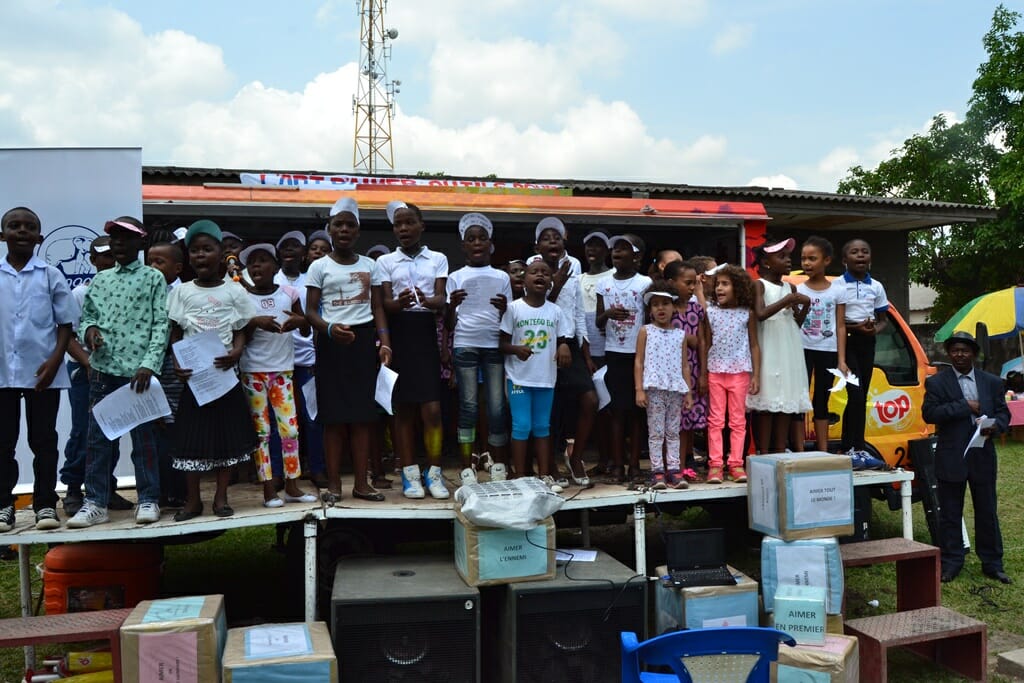 “Upon casting the Dice of love and explaining its significance – continued Martine – the children demonstrated that “peace starts with ourselves.” And the many dices that brightened the stage were them solemnly delivered in the end to every school present, as a sign of a path and commitment to peace which all had initiated together. The 22 Evangelical school directors that we involved in this initiative, expressed their enthusiasm and desire to continue working with us in these types of activities. The children were the real protagonists in the preparatory activities right from the start, with their capacity to involve everyone in the rehearsals of the songs and presentations, and the courage with which they announced and presented the meeting in a TV transmission… It was all so full of joy, enthusiasm and serious work, not to mention that even God showed his benediction through his Divine Providence! In addition there was our communion of goods and presents from parents and embassies, and even a bank sponsored the event and financed the building of the stage and sound system! The event was then broadcasted on the national TV channel, the same one that had launched the initiatives some days earlier. And we, aged 0 to 99, lived this wonderful day for peace. What remained in the depth of our hearts after seeing the joy on the faces of these children? Hope. An unwavering hope. Because the future is in good hands.”
“Upon casting the Dice of love and explaining its significance – continued Martine – the children demonstrated that “peace starts with ourselves.” And the many dices that brightened the stage were them solemnly delivered in the end to every school present, as a sign of a path and commitment to peace which all had initiated together. The 22 Evangelical school directors that we involved in this initiative, expressed their enthusiasm and desire to continue working with us in these types of activities. The children were the real protagonists in the preparatory activities right from the start, with their capacity to involve everyone in the rehearsals of the songs and presentations, and the courage with which they announced and presented the meeting in a TV transmission… It was all so full of joy, enthusiasm and serious work, not to mention that even God showed his benediction through his Divine Providence! In addition there was our communion of goods and presents from parents and embassies, and even a bank sponsored the event and financed the building of the stage and sound system! The event was then broadcasted on the national TV channel, the same one that had launched the initiatives some days earlier. And we, aged 0 to 99, lived this wonderful day for peace. What remained in the depth of our hearts after seeing the joy on the faces of these children? Hope. An unwavering hope. Because the future is in good hands.”

Nov 15, 2015 | Non categorizzato
 “There is an infinite number of rays, all coming from the same sun: a single will, particular for each person. The closer the rays come to the sun, the closer they come to one another. “We too . . . the closer we come to God, by doing the will of God more and more perfectly, the closer we come to one another. “Until we are all one!” (Chiara Lubich, L’unità, Città Nuova, Roma 2015, a cura di D. Falmi e F. Gillet, p. 48-49).
“There is an infinite number of rays, all coming from the same sun: a single will, particular for each person. The closer the rays come to the sun, the closer they come to one another. “We too . . . the closer we come to God, by doing the will of God more and more perfectly, the closer we come to one another. “Until we are all one!” (Chiara Lubich, L’unità, Città Nuova, Roma 2015, a cura di D. Falmi e F. Gillet, p. 48-49).
![Turkey. A Wind of Unity on Heybeli Island, Itstanbul.]()
Nov 14, 2015 | Focolare Worldwide
“In the face of the dramatic events that took place in Paris last night, in addition to those in many other areas of the world, we stand in mourning with those who have lost loved ones and with those who believe that the unity of the human family is possible. As we stand in dismay and in the firm condemnation of such acts against human life, a question becomes very clear: have we taken every step and every action possible to build the necessary conditions for preventing violence and terrorist acts – including the encouragement of equality, of more solidarity, more communion of goods? In the face of events that appear perverse, it is obvious that there is no single answer. But it is also obvious that an uncontrolled reaction to violence will not deter those who want to destroy the life forces of peoples and their aspiration to coexist in peace.  The conviction that the world can walk towards unity, and overcome confrontation and armed violence, remains alive in the spirit and in the actions of those who have love for every person and the future of the human family at heart, and want to bring it about through political action, through the right use of economy, and the rule of law. The Focolare Movement, while it weeps with those who weep, continues to believe in the path of dialogue, of acceptance and of respect for the other, whoever that may be and from whatever background, religious belief, and ethnicity. Therefore, together with all those working for peace, in various posts of responsibility and often at risk to themselves, the Focolare renews its commitment to intensify and multiply acts and gestures of reconciliation, opportunities for dialogue and communion, for encounter and sharing at all levels and in all parts of the world, so as to embrace the cry of humanity and transform it into new hope.”
The conviction that the world can walk towards unity, and overcome confrontation and armed violence, remains alive in the spirit and in the actions of those who have love for every person and the future of the human family at heart, and want to bring it about through political action, through the right use of economy, and the rule of law. The Focolare Movement, while it weeps with those who weep, continues to believe in the path of dialogue, of acceptance and of respect for the other, whoever that may be and from whatever background, religious belief, and ethnicity. Therefore, together with all those working for peace, in various posts of responsibility and often at risk to themselves, the Focolare renews its commitment to intensify and multiply acts and gestures of reconciliation, opportunities for dialogue and communion, for encounter and sharing at all levels and in all parts of the world, so as to embrace the cry of humanity and transform it into new hope.”
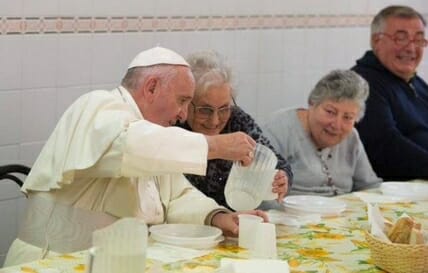
Nov 14, 2015 | Focolare Worldwide
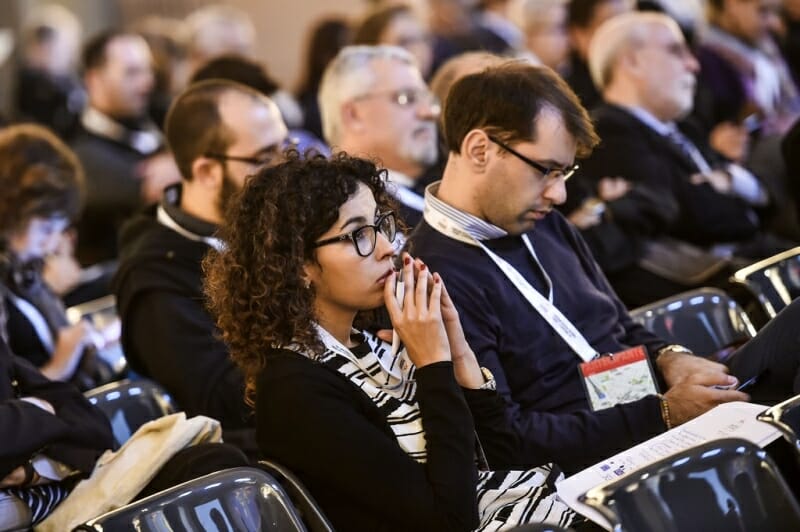
The Fifth National Ecclesial Convention in Florence, Italy, (November 9-13), Foto: Cristian Gennari/Siciliani

Pope Francis having lunch at the soup kithen. Photo: Ansa
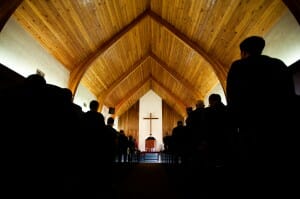
Nov 14, 2015 | Non categorizzato
 That evening with friends I have some very close friends, most of them agnostics, with whom I had never explicitly spoken about my spiritual life. This had always left me with a certain sense of incompleteness. One evening we were taking a walk. Passing a church, I felt a strong desire to enter for a moment and greet Jesus. Being in the company of the others, this action seemed out of place, but I wanted to follow the impulse. During my brief visit in the church, I felt I had to say to Jesus: “Stay with me, because I am with you.” Shortly thereafter, at dinner, I felt I had to “reveal” myself to the others, but I didn’t know where to start! But then they spontaneously began to confront the topic of faith. It was a beautiful moment of communion. They expressed their perplexities to me, and words that even I hadn’t expected came out of my mouth. And all of this with mutual respect! Nothing of the kind could ever have happened if there hadn’t been that profound relationship between us. S. – Italy Sensitivity I am a nurse in the radiology department. In the corridors some patients wait their turn in their beds. One of them, with her arms bandaged, had been left uncovered. I greeted her, and with tact I covered her with the sheet. Years passed. One day, at a book presentation, a very elegant lady approached me: “I thank you for that day when you respected my dignity.” I almost didn’t recognize her. She continued: “It is when we suffer that we need even more to be respected as men and women. Thank you, because your service hasn’t made you insensitive.” E.M. – Hungary The embrace Seated at the desk of the charity center where I work, I was listening to a refugee whose appearance and clothing betrayed a past full of suffering. He was desperate because, having long been without work, he would be evicted from his lodging within a few days for not having paid the rent. I asked him, as I do with many like him, if he had friends here in the city who could help him. His reaction was unexpected: he burst into convulsive sobs, repeating: “I’m alone, alone! I have no one!” I was speechless, overwhelmed by a sense of powerlessness. Then, on impulse, I got up and went to embrace him. Slowly, he calmed down. He got up too, and with a tranquil tone of voice he said, “Now I know I am no longer alone,” and he made to leave, as if that simple brotherly gesture were enough to give him hope again. At that point I stopped him to show him how to procure himself clothing, make use of the Caritas dining hall and also a bed in our dormitory. By the time we separated, he was completely serene S. – Italy
That evening with friends I have some very close friends, most of them agnostics, with whom I had never explicitly spoken about my spiritual life. This had always left me with a certain sense of incompleteness. One evening we were taking a walk. Passing a church, I felt a strong desire to enter for a moment and greet Jesus. Being in the company of the others, this action seemed out of place, but I wanted to follow the impulse. During my brief visit in the church, I felt I had to say to Jesus: “Stay with me, because I am with you.” Shortly thereafter, at dinner, I felt I had to “reveal” myself to the others, but I didn’t know where to start! But then they spontaneously began to confront the topic of faith. It was a beautiful moment of communion. They expressed their perplexities to me, and words that even I hadn’t expected came out of my mouth. And all of this with mutual respect! Nothing of the kind could ever have happened if there hadn’t been that profound relationship between us. S. – Italy Sensitivity I am a nurse in the radiology department. In the corridors some patients wait their turn in their beds. One of them, with her arms bandaged, had been left uncovered. I greeted her, and with tact I covered her with the sheet. Years passed. One day, at a book presentation, a very elegant lady approached me: “I thank you for that day when you respected my dignity.” I almost didn’t recognize her. She continued: “It is when we suffer that we need even more to be respected as men and women. Thank you, because your service hasn’t made you insensitive.” E.M. – Hungary The embrace Seated at the desk of the charity center where I work, I was listening to a refugee whose appearance and clothing betrayed a past full of suffering. He was desperate because, having long been without work, he would be evicted from his lodging within a few days for not having paid the rent. I asked him, as I do with many like him, if he had friends here in the city who could help him. His reaction was unexpected: he burst into convulsive sobs, repeating: “I’m alone, alone! I have no one!” I was speechless, overwhelmed by a sense of powerlessness. Then, on impulse, I got up and went to embrace him. Slowly, he calmed down. He got up too, and with a tranquil tone of voice he said, “Now I know I am no longer alone,” and he made to leave, as if that simple brotherly gesture were enough to give him hope again. At that point I stopped him to show him how to procure himself clothing, make use of the Caritas dining hall and also a bed in our dormitory. By the time we separated, he was completely serene S. – Italy
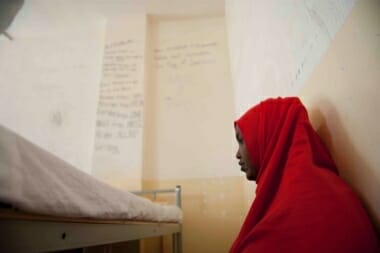
Nov 13, 2015 | Focolare Worldwide, Senza categoria
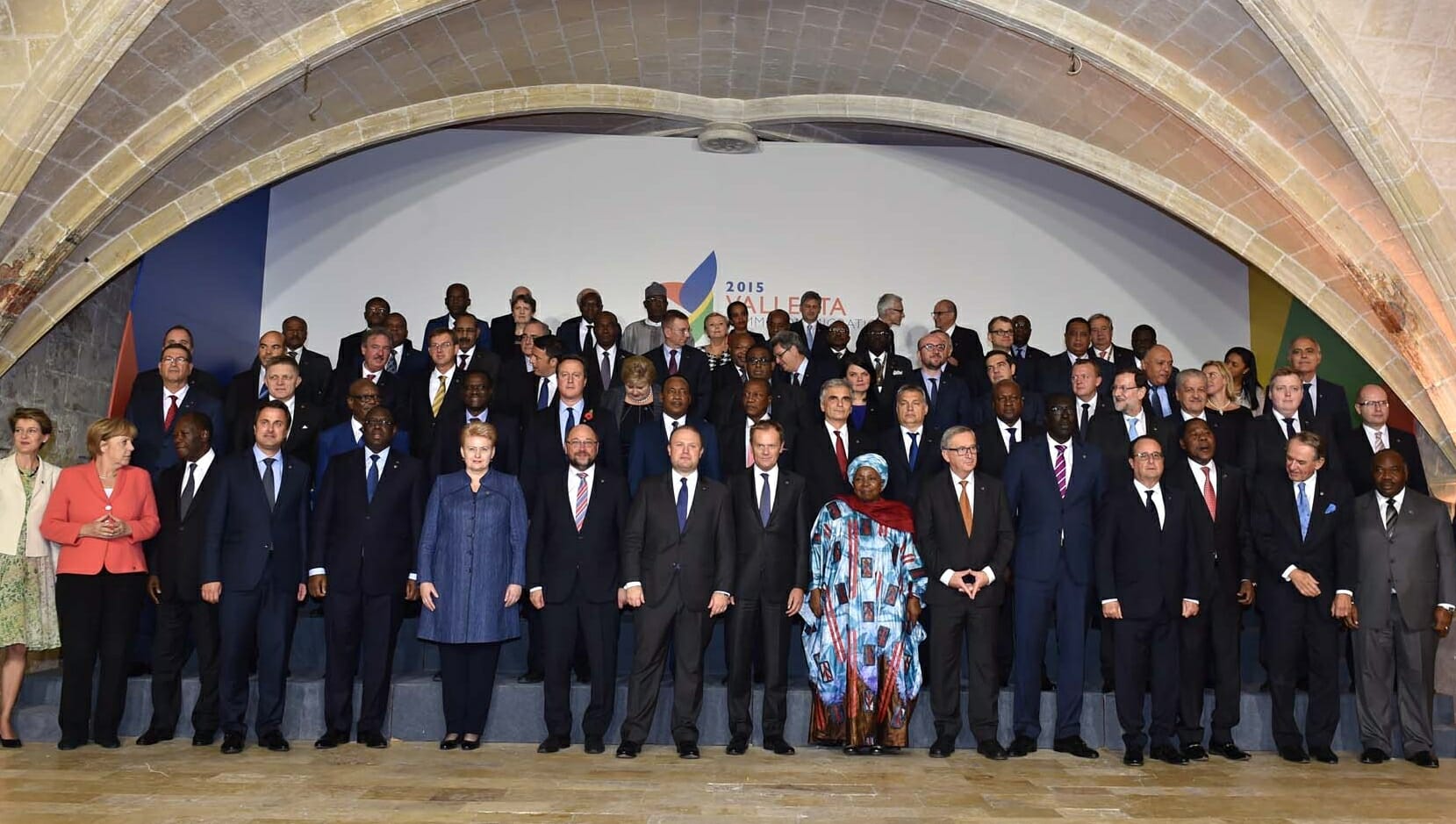
European Union and African nation leaders present at the Valletta Summit on Migration (Malta, 11-12 November 2015)
 In one centre they held English classes; provided useful information about Malta; and simply spent time with the migrants. In another centre that welcomed families, they provided child care and tried to meet the basic needs of the little ones. Later, when they received permission, the Volunteers also went into the detention centres, Anna recounted: “The refugees were in rooms with bunk beds, even twelve per room, and there was not enough room for everyone. At first they were shocked, but seeing that we only wanted to befriend them, they overcame their mistrust. From English lessons we also moved on to more enjoyable moments with music and dance; and the guards remarked that they had never seen them so happy.” The young people of the Focolare Movement also became involved, inviting the refugees to events for teenagers such as the Run4Unity; and to the Mariapolis for a few days of meetings with Focolare friends and sympathisers. “Our project is beginning to gain visibility,” Anna concluded, “and we were asked to present our experience to the other Ecclesial Movements.”
In one centre they held English classes; provided useful information about Malta; and simply spent time with the migrants. In another centre that welcomed families, they provided child care and tried to meet the basic needs of the little ones. Later, when they received permission, the Volunteers also went into the detention centres, Anna recounted: “The refugees were in rooms with bunk beds, even twelve per room, and there was not enough room for everyone. At first they were shocked, but seeing that we only wanted to befriend them, they overcame their mistrust. From English lessons we also moved on to more enjoyable moments with music and dance; and the guards remarked that they had never seen them so happy.” The young people of the Focolare Movement also became involved, inviting the refugees to events for teenagers such as the Run4Unity; and to the Mariapolis for a few days of meetings with Focolare friends and sympathisers. “Our project is beginning to gain visibility,” Anna concluded, “and we were asked to present our experience to the other Ecclesial Movements.”
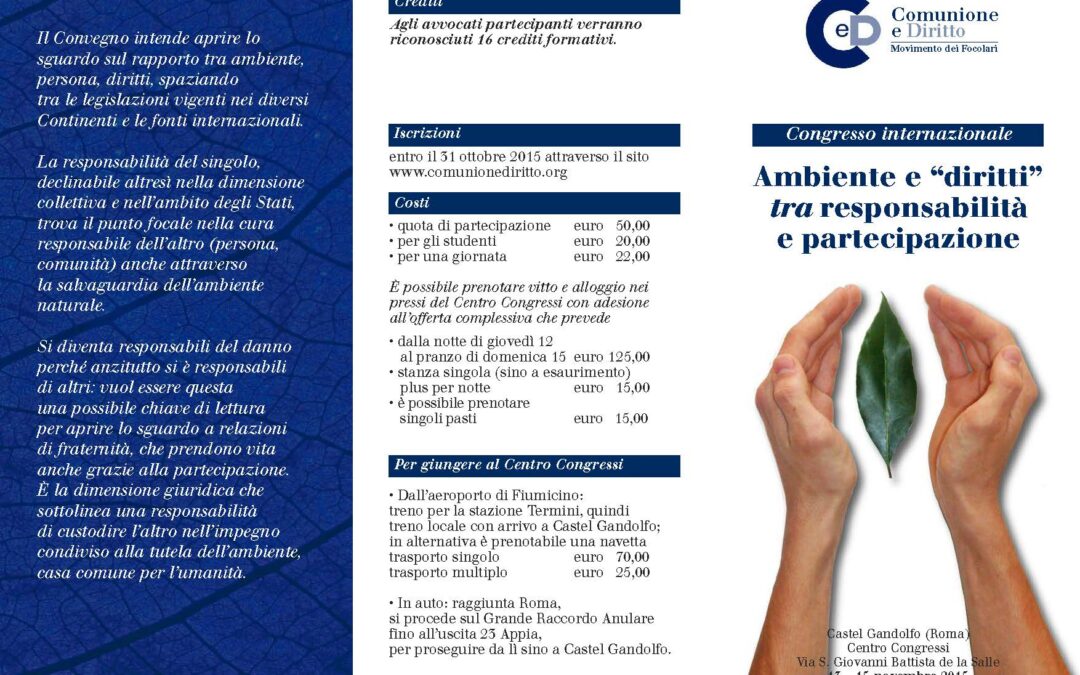
Nov 12, 2015 | Non categorizzato
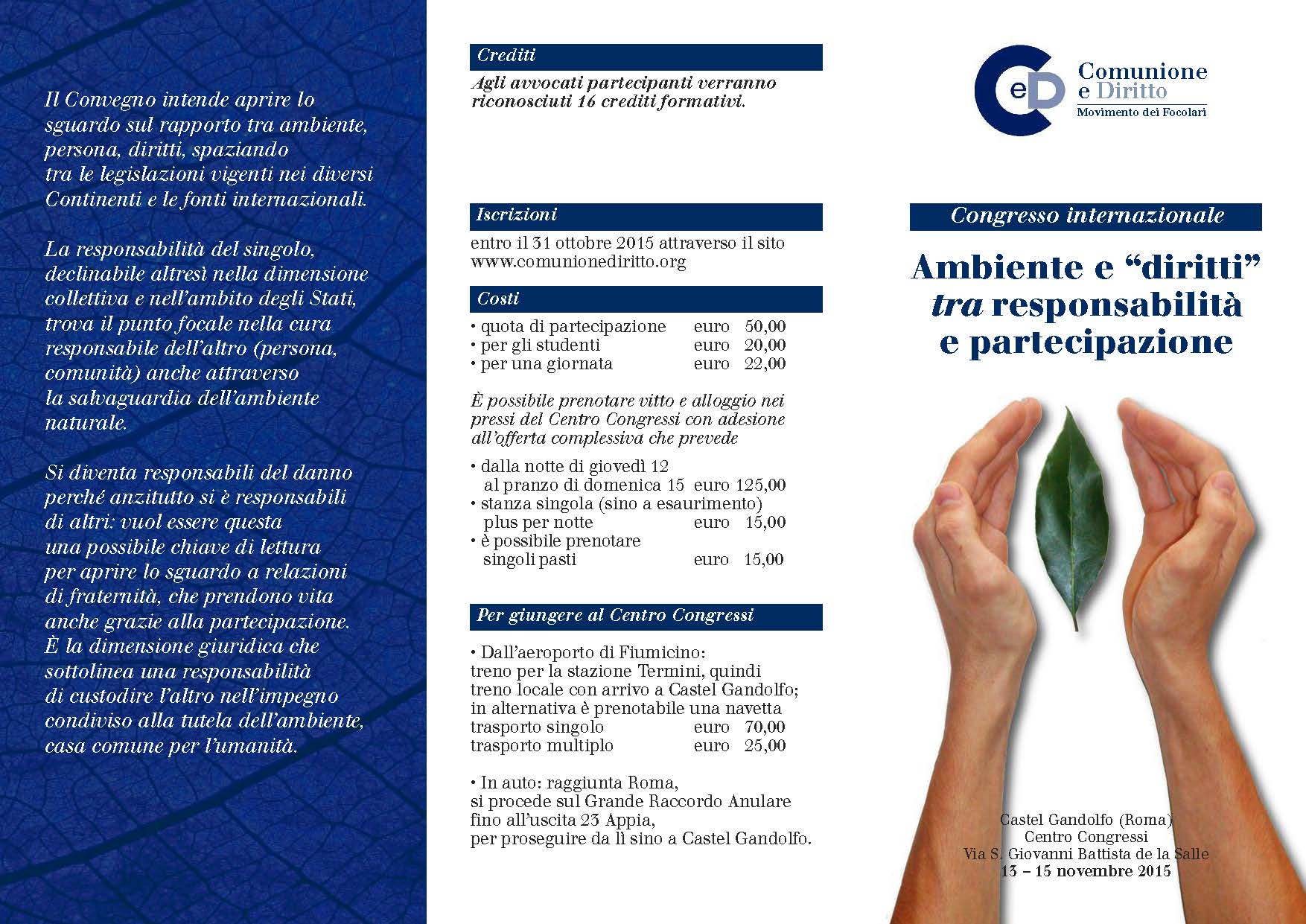 Environment and Human Rights: A very topical issue only a few months after Laudato Si’, the Encyclical of Pope Francis on the environment, and on the vigil of the COP 21, the United Nations Conference in Paris on climate change. How was the idea born? “We have been working on this project for two years, which happens to fall at an extremely favourable moment for focusing on the environment. The Congress titled “Environment and ‘Rights’ Between Responsibility and Participation”, was born from the shared experience of a judge involved for many years in the court cases that arose from the tragic consequences and serious harm caused by the irresponsible use of the natural resources. Cognizant of the far reach of the Communion and Law network that extends to all parts of the world, he thought it could be a means of sharing and giving visibility to the problems and difficulties of the most distant and forgotten regions of the world. The idea was born of doing something that would bring a positive global response.” The programme indicates a heavy involvement of young people. What was the background process? “It was all the result of the encounter between European and African young people that took place during the March 2014 International Seminar at Castel Gandolfo, Italy. Those young people studied the theme of the environment in the perspective of responsibility and participation, and they committed themselves to continue their research up until the Congress that is scheduled for November 13-15, 2015.” Those attending will come from 4 continents, representing 21 countries. Therefore, there will be an international perspective from which to examine the laws that are in force in the environmental field, but to what end? “We would like to highlight the concept of relatedness that is inherent to being human. Our relatedness to others, in a relationship of care and attention demands responsibility in our relations both with other people and with nature. If we live in this way, those relationships will enable us to also gather the relationships of Love that underpin Creation. Another goal is to reinforce the concept of participation in legislative activity. During the congress we will evaluate a proposal of popular law that moves in that direction. The proposal comes from a Sicilian regional law concerning the territory of Pachino, which reveals the contrast between ‘legislative procedure’ and ‘participatory power’. Actually, communication with the interested parties is fundamental so that they can evaluate the current legislative and regulatory proposals.” “Moreover, we would like to give a voice to near and distant lands that are also different from one another, often forgotten or in the spotlight only because of dramatic situations, like the Central African Republic, for example. The discussion will not only be theoretical but will include stories and testimonies: on-going investigations into the damage to the environment because of irregularities, ‘halts’, the powers that be in the state apparatus, the problem of deforestation and desertification in Sub-Saharan Africa.” It is also a meeting with an interdisciplinary approach. Amongst the participants is EcoOne, for example, which is a network of researches in the field of Ecology and the Environment that shows the years of attention given to the environment by the Focolare. . .
Environment and Human Rights: A very topical issue only a few months after Laudato Si’, the Encyclical of Pope Francis on the environment, and on the vigil of the COP 21, the United Nations Conference in Paris on climate change. How was the idea born? “We have been working on this project for two years, which happens to fall at an extremely favourable moment for focusing on the environment. The Congress titled “Environment and ‘Rights’ Between Responsibility and Participation”, was born from the shared experience of a judge involved for many years in the court cases that arose from the tragic consequences and serious harm caused by the irresponsible use of the natural resources. Cognizant of the far reach of the Communion and Law network that extends to all parts of the world, he thought it could be a means of sharing and giving visibility to the problems and difficulties of the most distant and forgotten regions of the world. The idea was born of doing something that would bring a positive global response.” The programme indicates a heavy involvement of young people. What was the background process? “It was all the result of the encounter between European and African young people that took place during the March 2014 International Seminar at Castel Gandolfo, Italy. Those young people studied the theme of the environment in the perspective of responsibility and participation, and they committed themselves to continue their research up until the Congress that is scheduled for November 13-15, 2015.” Those attending will come from 4 continents, representing 21 countries. Therefore, there will be an international perspective from which to examine the laws that are in force in the environmental field, but to what end? “We would like to highlight the concept of relatedness that is inherent to being human. Our relatedness to others, in a relationship of care and attention demands responsibility in our relations both with other people and with nature. If we live in this way, those relationships will enable us to also gather the relationships of Love that underpin Creation. Another goal is to reinforce the concept of participation in legislative activity. During the congress we will evaluate a proposal of popular law that moves in that direction. The proposal comes from a Sicilian regional law concerning the territory of Pachino, which reveals the contrast between ‘legislative procedure’ and ‘participatory power’. Actually, communication with the interested parties is fundamental so that they can evaluate the current legislative and regulatory proposals.” “Moreover, we would like to give a voice to near and distant lands that are also different from one another, often forgotten or in the spotlight only because of dramatic situations, like the Central African Republic, for example. The discussion will not only be theoretical but will include stories and testimonies: on-going investigations into the damage to the environment because of irregularities, ‘halts’, the powers that be in the state apparatus, the problem of deforestation and desertification in Sub-Saharan Africa.” It is also a meeting with an interdisciplinary approach. Amongst the participants is EcoOne, for example, which is a network of researches in the field of Ecology and the Environment that shows the years of attention given to the environment by the Focolare. . .
“Scholars in ecology, environmental physics, but also economists, educationists, political scientists, architects will also join us. With them particularly during the roundtable on Sunday morning, our reflection will shift to the prospect of a unitary vision that could reconcile the terms: people and nature. During the last session, there will be an address by Focolare president, Maria Voce who was one of the initiators of Communion and Law, the network of scholars and law workers that was begun in 2001 because of an intuition of Chiara Lubich. In a nutshell, Communion and Law promotes and accompanies a variety of initiatives for elaborating and spreading a new culture founded upon relatedness as a juridcal category, but also key in the relations amongst law workers. Press releases
Program
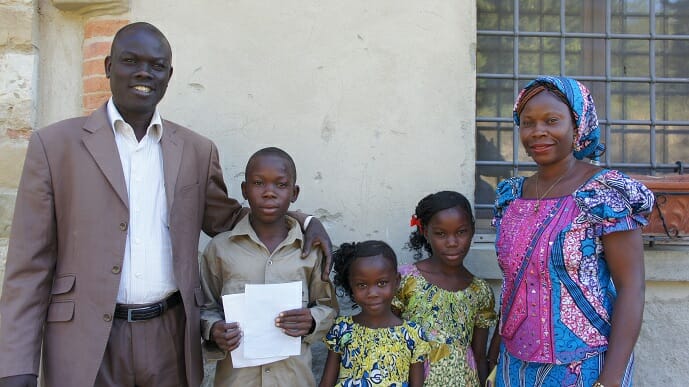
Nov 11, 2015 | Focolare Worldwide

The Molu family
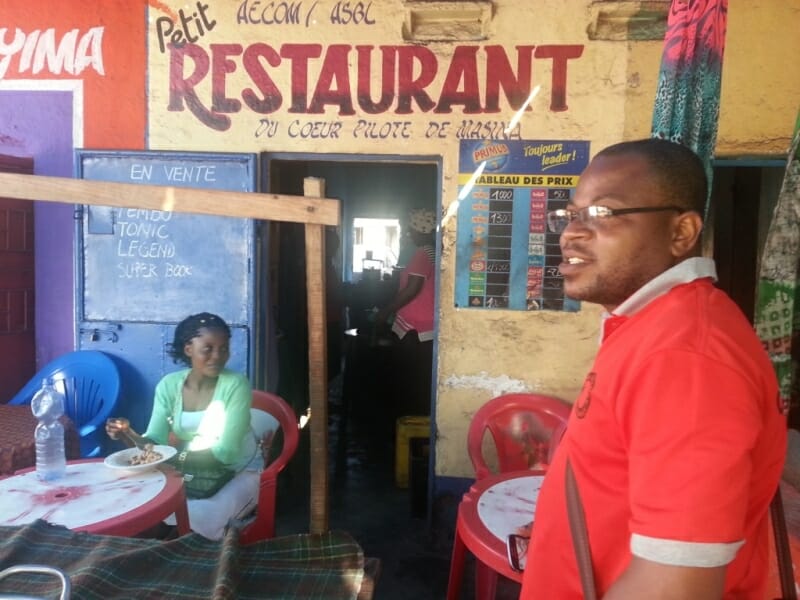
Nov 10, 2015 | Focolare Worldwide

The bar and restaurant run by Émerence Kibimbwa Zolakio
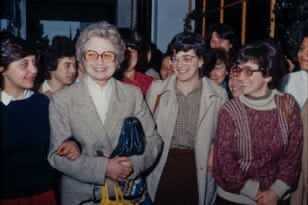
Nov 9, 2015 | Senza categoria
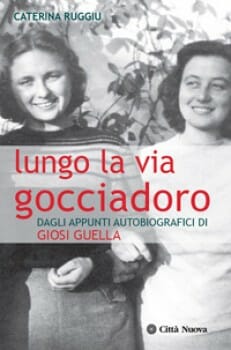 “Chiara was pointing out the stars to me along the Gocciadoro Way. I dont’recall her words. Come to think of it, it seems like she was telling me that we had to step out of our little world in order to soar in a much vaster world.” This is how Giosi Guella records her first encounters with Chiara Lubich in the spring of 1944 in Trent. Gioccadoro Way is the street where Chiara lived with her family before the bombardment of May 13, 1944 when the family home was left uninhabitable. It is also the name of the woods – now a city park – that lapped Tentino’s chief town, and it remains one of the symbolic sites of the Focolare Movement in the city where the Movement began. This is the story behind the title of the book about her life beside the Focolare’s foundress with whom she shared moments of light and of trial that accompanied the birth and the development of this new spiritual family in the Church. Amongst the first group that joined Chiara Lubich, Giosi Guella stood out for her simplicity, sincerity and concreteness. She was already living with Chiara Lubich in the autumn of 1944 at the small flat at piazza Cappuccini 2. That is where the first cell of the Focolare Movement began to form. In all the places she lived, Giosi embraced and lightened the sufferings of others, offered insightful advice, helped to find homes, employment and trust. She was the impulse for the consolidation of many focolare communities, seeing to it that joys and sorrows were shared amongst all, challenges and victories, unexpected donations that were then used to respond to requests for help. Everything contributed to the “capital of God’ that was being formed, composed of material goods, but also of needs. Giosi was the generous adminstrator of that capital. Because of her eye for the least amongst the community she was well suited to setting up the communion of goods of the first group in Trent, beginning in 1948. The communion of goods was a practice which then spread thoughout the Focolare Movement around the world. It was inspired by the early Christian communities who put their goods in common so that no one amongst them would be in need. Afterwards, as the Movement spread to other countries and different kinds of social action became necessary, Giosi continued to follow those developments. She also accompanied the early stages of the Economy of Communion project that was launched by Chiara Lubich in Brazil (1991).
“Chiara was pointing out the stars to me along the Gocciadoro Way. I dont’recall her words. Come to think of it, it seems like she was telling me that we had to step out of our little world in order to soar in a much vaster world.” This is how Giosi Guella records her first encounters with Chiara Lubich in the spring of 1944 in Trent. Gioccadoro Way is the street where Chiara lived with her family before the bombardment of May 13, 1944 when the family home was left uninhabitable. It is also the name of the woods – now a city park – that lapped Tentino’s chief town, and it remains one of the symbolic sites of the Focolare Movement in the city where the Movement began. This is the story behind the title of the book about her life beside the Focolare’s foundress with whom she shared moments of light and of trial that accompanied the birth and the development of this new spiritual family in the Church. Amongst the first group that joined Chiara Lubich, Giosi Guella stood out for her simplicity, sincerity and concreteness. She was already living with Chiara Lubich in the autumn of 1944 at the small flat at piazza Cappuccini 2. That is where the first cell of the Focolare Movement began to form. In all the places she lived, Giosi embraced and lightened the sufferings of others, offered insightful advice, helped to find homes, employment and trust. She was the impulse for the consolidation of many focolare communities, seeing to it that joys and sorrows were shared amongst all, challenges and victories, unexpected donations that were then used to respond to requests for help. Everything contributed to the “capital of God’ that was being formed, composed of material goods, but also of needs. Giosi was the generous adminstrator of that capital. Because of her eye for the least amongst the community she was well suited to setting up the communion of goods of the first group in Trent, beginning in 1948. The communion of goods was a practice which then spread thoughout the Focolare Movement around the world. It was inspired by the early Christian communities who put their goods in common so that no one amongst them would be in need. Afterwards, as the Movement spread to other countries and different kinds of social action became necessary, Giosi continued to follow those developments. She also accompanied the early stages of the Economy of Communion project that was launched by Chiara Lubich in Brazil (1991).  A biography has now been published, twenty years after her death. It is certainly not an exhastuve account, drawing upon a few writings and recorded speeches. Actually, she was not very fond of writing; she preferred to be “doing”. These pages are therefore quite precious, extraordinarily frank and disarmingly simple. I entrusted myself to those writings, on the edge between news and history, letting her speak. When the recount was interrupted, I was able to interview several people who had shared the journey of a Work of God with her, a Work “written in Heaven” that gradually unfolded on earth, following mysterious and up until then unexplored paths. Their testimonies permitted me to trace several passage of this simple, “too simple” life yet strongly interwoven with that of the Focolare to which Giosi had given all of herself, with her own particular touch. Caterina Ruggiu Lungo la via Gocciadoro, Città Nuova editrice
A biography has now been published, twenty years after her death. It is certainly not an exhastuve account, drawing upon a few writings and recorded speeches. Actually, she was not very fond of writing; she preferred to be “doing”. These pages are therefore quite precious, extraordinarily frank and disarmingly simple. I entrusted myself to those writings, on the edge between news and history, letting her speak. When the recount was interrupted, I was able to interview several people who had shared the journey of a Work of God with her, a Work “written in Heaven” that gradually unfolded on earth, following mysterious and up until then unexplored paths. Their testimonies permitted me to trace several passage of this simple, “too simple” life yet strongly interwoven with that of the Focolare to which Giosi had given all of herself, with her own particular touch. Caterina Ruggiu Lungo la via Gocciadoro, Città Nuova editrice

Nov 7, 2015 | Non categorizzato
 There has never been so much talk about labour rights as in our times; and there has never been so much worker abuse as in our times. They have provided the crowds for the rallies and the piles for all the massacres, and the flesh for all the reprisals. Those that do survive are often left homeless on the streets, without family. Once again, we are called to bounce back, to reconquer death: to do what Peter the fisherman did, who said to the Master: “We have been hard at it all night, but have not caught anything; but at your word I will cast the nets.” At the word of Jesus, with hope, after a night of blood and ruin, we need to begin again. And the Father will reward our trust. All of us are engaged in this great enterprise, both labourer and intellectual, of repairing the great social wreck, with courage and responsibility. Let us never look back and never be afraid. Behind us stand the exploiters, the tyrants that have burned our homes and jammed our freedoms, the demigods that have waged war: they are the executioners and gravediggers. We are moving forward, even with the cross on our shoulders, towards the Redemption that means freedom: freedom from every evil, and therefore from the need of fear.” (Igino Giordani, Fides, June 1951) “You strip work of its value when you disassociate the economic value from the spiritual value. When God came amongst us He did so as a worker amongst workers. For thirty years He performed manual labour to help the people within the circle of his family and neighbours. Then, for three years, He did spiritual work whose fruits have benefited the human family of every age. Work is innate to us humans and as necessary to life as eating and breathing. Forcing a human being to be idle is like forcing a bird not to fly. With the advent of the Redeemer – a manual labourer who was God – labour and fatigue became the divinely manufactured ordinary means of sanctification. Anyone who works in accordance with the order of God, bearing with the fatigue out of love for God, becomes holy. The work in the fields, in the office or in the Church has the same value as prayer does. The salary is also doubled. On the human level, you are paid for the economic value produced by your handiwork and genius; on the divine level, you are paid for the merits of your patience, asceticism and detachment. As you build you bear with the fatigue, transforming it into the raw material of redemption, and you also build another stretch of the road to your eternal destiny. The prodigal son began his recovery when he began to work, just as he had begun his deterioration when he began to be idle. The real exploitation of work and of the worker comes about in proportion to the materialistic pretence of denying participation of the spirit in the works of the hand or of the mind: pulling apart the divine and the human, the spirit and the corporal, the moral and the economic, Our Father in Heaven the daily bread that needs to be served to us every day on earth. A person does not only live on bread for the stomach, but is also in need of nourishment for the soul. Pressing someone into a merely economic existence is like feeding only half of him while destroying him by starving the other half. The God Man saw and always sees the divine and the human not only one or the other, but both. Since the fishermen and their guests have not caught a single fish during an entire night of hard effort, and since the norm Jesus follows is ‘whoever does not work, does not eat,’ He invites them and their hungry families to go back to work, to recast the nets into the waters of the lake. God continually invites us not to be discouraged, not to despair but to get back to work again, always in His name. Like a human person, society also needs both works so that it can breathe with both lungs and live healthy and free. If not, it languishes, since it suffers either from bodily hunger or from spiritual hunger: one hunger brings the other. If there is no Father in Heaven, the bread on earth also becomes scarce because, without Him, the labourers are no longer brothers and sisters. They fight and steal, as happened and continues to happen to many of our immigrants who are opposed and rejected by other workers.” (Igino Giordani La Via, 1952)
There has never been so much talk about labour rights as in our times; and there has never been so much worker abuse as in our times. They have provided the crowds for the rallies and the piles for all the massacres, and the flesh for all the reprisals. Those that do survive are often left homeless on the streets, without family. Once again, we are called to bounce back, to reconquer death: to do what Peter the fisherman did, who said to the Master: “We have been hard at it all night, but have not caught anything; but at your word I will cast the nets.” At the word of Jesus, with hope, after a night of blood and ruin, we need to begin again. And the Father will reward our trust. All of us are engaged in this great enterprise, both labourer and intellectual, of repairing the great social wreck, with courage and responsibility. Let us never look back and never be afraid. Behind us stand the exploiters, the tyrants that have burned our homes and jammed our freedoms, the demigods that have waged war: they are the executioners and gravediggers. We are moving forward, even with the cross on our shoulders, towards the Redemption that means freedom: freedom from every evil, and therefore from the need of fear.” (Igino Giordani, Fides, June 1951) “You strip work of its value when you disassociate the economic value from the spiritual value. When God came amongst us He did so as a worker amongst workers. For thirty years He performed manual labour to help the people within the circle of his family and neighbours. Then, for three years, He did spiritual work whose fruits have benefited the human family of every age. Work is innate to us humans and as necessary to life as eating and breathing. Forcing a human being to be idle is like forcing a bird not to fly. With the advent of the Redeemer – a manual labourer who was God – labour and fatigue became the divinely manufactured ordinary means of sanctification. Anyone who works in accordance with the order of God, bearing with the fatigue out of love for God, becomes holy. The work in the fields, in the office or in the Church has the same value as prayer does. The salary is also doubled. On the human level, you are paid for the economic value produced by your handiwork and genius; on the divine level, you are paid for the merits of your patience, asceticism and detachment. As you build you bear with the fatigue, transforming it into the raw material of redemption, and you also build another stretch of the road to your eternal destiny. The prodigal son began his recovery when he began to work, just as he had begun his deterioration when he began to be idle. The real exploitation of work and of the worker comes about in proportion to the materialistic pretence of denying participation of the spirit in the works of the hand or of the mind: pulling apart the divine and the human, the spirit and the corporal, the moral and the economic, Our Father in Heaven the daily bread that needs to be served to us every day on earth. A person does not only live on bread for the stomach, but is also in need of nourishment for the soul. Pressing someone into a merely economic existence is like feeding only half of him while destroying him by starving the other half. The God Man saw and always sees the divine and the human not only one or the other, but both. Since the fishermen and their guests have not caught a single fish during an entire night of hard effort, and since the norm Jesus follows is ‘whoever does not work, does not eat,’ He invites them and their hungry families to go back to work, to recast the nets into the waters of the lake. God continually invites us not to be discouraged, not to despair but to get back to work again, always in His name. Like a human person, society also needs both works so that it can breathe with both lungs and live healthy and free. If not, it languishes, since it suffers either from bodily hunger or from spiritual hunger: one hunger brings the other. If there is no Father in Heaven, the bread on earth also becomes scarce because, without Him, the labourers are no longer brothers and sisters. They fight and steal, as happened and continues to happen to many of our immigrants who are opposed and rejected by other workers.” (Igino Giordani La Via, 1952)
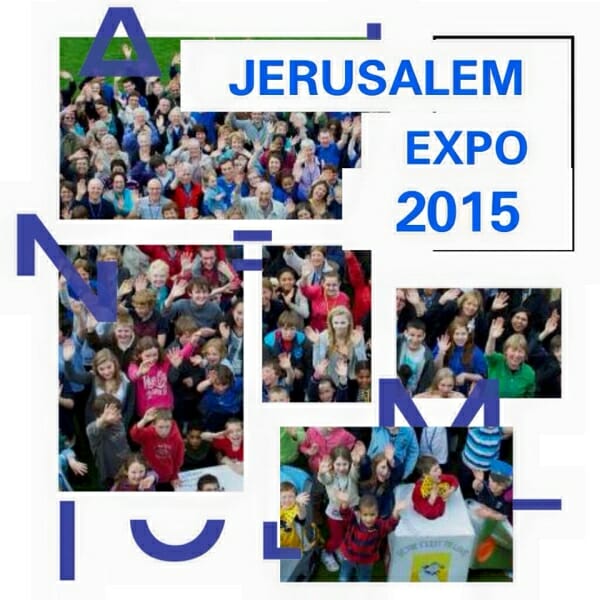
Nov 6, 2015 | Non categorizzato
 To celebrate the 50th anniversary of the Vatican Document “Nostra Aetate” Music, art, dance and live demonstration of the Jewish, Christian and Muslim communities in Jerusalem. Live streaming of the event Website: http://www.jerusalemexpo2015.com/ Facebook: https://www.facebook.com/NostraAetateJerusalem/
To celebrate the 50th anniversary of the Vatican Document “Nostra Aetate” Music, art, dance and live demonstration of the Jewish, Christian and Muslim communities in Jerusalem. Live streaming of the event Website: http://www.jerusalemexpo2015.com/ Facebook: https://www.facebook.com/NostraAetateJerusalem/
Nov 6, 2015 | Non categorizzato
The event will include a Conference (June 30-July 1, 2016) and a public outdoor rally on the following day (July 2, 2016) that will send a strong message of hope. Through testimonies, prayers and songs, the event would like to show that unity is possible and that reconciliation is the door to unity in diversity. This has been the experience of the Communities and Movements from many Churches who participate in Together for Europe for more than 15 years. Unity is possible. Living the Gospel of Jesus Christ can overcome the divisions amongst individuals, populations, parties, cultures and even Churches and non-denominational groups. The Seven Yeses offers a summary of the commitments of Together for Europe 2016. Event Program
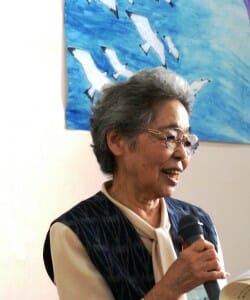
Nov 6, 2015 | Focolare Worldwide
 “On August 22, 1944, I lost my only sister in the Tsushima Maru naval disaster.” The passenger ship was sunk by an American submarine. More than 1,400 civilians lost their lives, including 700 children. “Up until the day of her death at the age of 96, my mother continued to say: “The war ate her on me. . .” Mrs Toshiko Tsuhako spoke from the bottom of her heart as she recounted her story to us. Her city, on Okinawa Island, had been the theatre of the only land battle in Japan through the months of April, May and June 1945, leaving 150,000 dead. “I was just an innocent child when I found myself thrown into the tragic experience of war, in contact with painful wounds that it inflicts on the bodies and the spirits of people. The war ended when I was 12 years old. My mother had a fragile constitution and, since I was the only daughter now, I devoted all my strength to trying to support and alleviate her afflictions. At the age of 16 I met the Christian faith and received the grace of Baptism.” As an adult she came into contact with the Focolare spirituality: “I was quite surprised when I heard that the foundress, Chiara Lubich, had come to understand, in the midst of the Second World War, that God loves us immensely and that we are all brothers and sisters who aspire to a united world, because this coincided exactly with the great dream that I carried inside me from when I was a young teenager.” “Although I was aware that everything that happens is in God’s hands, countless times I would wonder: ‘Why are there still such cruel and painful wars?’, while I continued on dreaming of a ‘global Family’ where the people live mutual gratitude and communion.” “I think that God is in need of our collaboration in building a truly peaceful world. It is true that we should cultivate hearts that love their own lands, but more than anything we should cultivate sensitive souls that devote themselves to the good of others, souls that know how to love.” “On this anniversary of the termination of the war,” Toshiko testifies, “I renew my trust in God and my commitment to continue along the path of peacebuilding.”
“On August 22, 1944, I lost my only sister in the Tsushima Maru naval disaster.” The passenger ship was sunk by an American submarine. More than 1,400 civilians lost their lives, including 700 children. “Up until the day of her death at the age of 96, my mother continued to say: “The war ate her on me. . .” Mrs Toshiko Tsuhako spoke from the bottom of her heart as she recounted her story to us. Her city, on Okinawa Island, had been the theatre of the only land battle in Japan through the months of April, May and June 1945, leaving 150,000 dead. “I was just an innocent child when I found myself thrown into the tragic experience of war, in contact with painful wounds that it inflicts on the bodies and the spirits of people. The war ended when I was 12 years old. My mother had a fragile constitution and, since I was the only daughter now, I devoted all my strength to trying to support and alleviate her afflictions. At the age of 16 I met the Christian faith and received the grace of Baptism.” As an adult she came into contact with the Focolare spirituality: “I was quite surprised when I heard that the foundress, Chiara Lubich, had come to understand, in the midst of the Second World War, that God loves us immensely and that we are all brothers and sisters who aspire to a united world, because this coincided exactly with the great dream that I carried inside me from when I was a young teenager.” “Although I was aware that everything that happens is in God’s hands, countless times I would wonder: ‘Why are there still such cruel and painful wars?’, while I continued on dreaming of a ‘global Family’ where the people live mutual gratitude and communion.” “I think that God is in need of our collaboration in building a truly peaceful world. It is true that we should cultivate hearts that love their own lands, but more than anything we should cultivate sensitive souls that devote themselves to the good of others, souls that know how to love.” “On this anniversary of the termination of the war,” Toshiko testifies, “I renew my trust in God and my commitment to continue along the path of peacebuilding.”
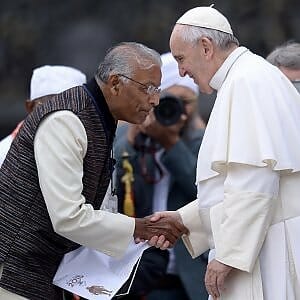
Nov 5, 2015 | Non categorizzato
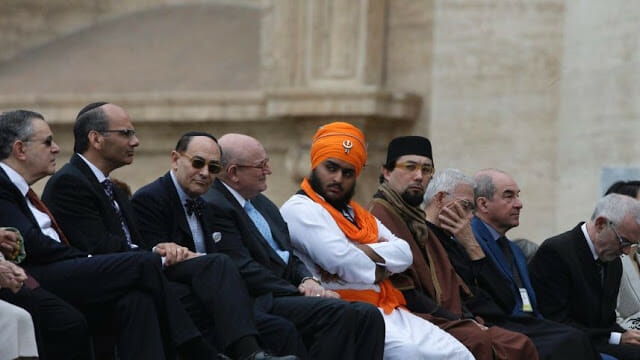 On 28 October 1965 at the conclusion of the historical assembly of bishops of the Catholic Church, the Council Fathers promulgated Nostra Aetate, the shortest document ever to be issued by the council’s working sessions. Half a century has passed since then, and the impact of those few pages revealed to be prophetic considering that the Catholic Church had passed centuries in the more or less firm conviction that there was ”no salvation outside the Church” – the famous Latin adage extra ecclesiam nulla salus. In February 2013, a few days before announcing his ”retirement” and upon reflecting on the Council at the end of the celebration of its 50th anniversary, Benedict XVI defined this document as a « trilogy that revealed its importance only in the course of decades,» along with Gaudium et Spes and religious freedom. In effect Nostra Aetate opened the Christian world’s horizon towards the others in their ”otherness,” but the management of which, according to the council’s procedures was not at all easy. At the personal suggestion of the French-Jewish historian, Jules Isaac to John XXIII, the Pope entrusted the initial scheme to Cardinal Bea. The idea was to draft a document that would contribute to prevent the repetition of tragedies like the Shoà, but after long and complex debates, the Council laid down a few pages addressing all the religions of the world. In effect, through a laborious and difficult process, the document opened to all the main religious faiths, undoubtedly and particularly stressing the confrontation with Judaism and Islam. Nostra Aetate underlines how the Jews should be presented in a positive manner: “They should not be presented as God’s rejects or as accursed, almost as if this came from the Holy Scriptures.” Above all, it excludes Israel’s collective responsibility for the death of Jesus. Therefore, this radically changed the views the Christian and Catholic world had of Israel for two millenniums. Likewise, a great respect emerged also towards Islam. “The Church regards Muslims with esteem” – declared the document – and “if in the course of the centuries, many disagreements and hostilities arose between Christians and Muslims, the Holy Council urges all to forget the past and sincerely practice mutual understanding, and together defend and promote social justice, moral values, peace and liberty for all.” As earlier said, also the recognition of the traditions of Hinduism and Buddhism is clearly highlighted, without forgetting the traditional religions. In fact, the document also affirms that “the Catholic Church does not reject what is true and holy in these religions.” What history often has not recognised as religions are now valued by Catholic tradition which acknowledges the presence of truth and sanctity also in their traditions.
On 28 October 1965 at the conclusion of the historical assembly of bishops of the Catholic Church, the Council Fathers promulgated Nostra Aetate, the shortest document ever to be issued by the council’s working sessions. Half a century has passed since then, and the impact of those few pages revealed to be prophetic considering that the Catholic Church had passed centuries in the more or less firm conviction that there was ”no salvation outside the Church” – the famous Latin adage extra ecclesiam nulla salus. In February 2013, a few days before announcing his ”retirement” and upon reflecting on the Council at the end of the celebration of its 50th anniversary, Benedict XVI defined this document as a « trilogy that revealed its importance only in the course of decades,» along with Gaudium et Spes and religious freedom. In effect Nostra Aetate opened the Christian world’s horizon towards the others in their ”otherness,” but the management of which, according to the council’s procedures was not at all easy. At the personal suggestion of the French-Jewish historian, Jules Isaac to John XXIII, the Pope entrusted the initial scheme to Cardinal Bea. The idea was to draft a document that would contribute to prevent the repetition of tragedies like the Shoà, but after long and complex debates, the Council laid down a few pages addressing all the religions of the world. In effect, through a laborious and difficult process, the document opened to all the main religious faiths, undoubtedly and particularly stressing the confrontation with Judaism and Islam. Nostra Aetate underlines how the Jews should be presented in a positive manner: “They should not be presented as God’s rejects or as accursed, almost as if this came from the Holy Scriptures.” Above all, it excludes Israel’s collective responsibility for the death of Jesus. Therefore, this radically changed the views the Christian and Catholic world had of Israel for two millenniums. Likewise, a great respect emerged also towards Islam. “The Church regards Muslims with esteem” – declared the document – and “if in the course of the centuries, many disagreements and hostilities arose between Christians and Muslims, the Holy Council urges all to forget the past and sincerely practice mutual understanding, and together defend and promote social justice, moral values, peace and liberty for all.” As earlier said, also the recognition of the traditions of Hinduism and Buddhism is clearly highlighted, without forgetting the traditional religions. In fact, the document also affirms that “the Catholic Church does not reject what is true and holy in these religions.” What history often has not recognised as religions are now valued by Catholic tradition which acknowledges the presence of truth and sanctity also in their traditions. 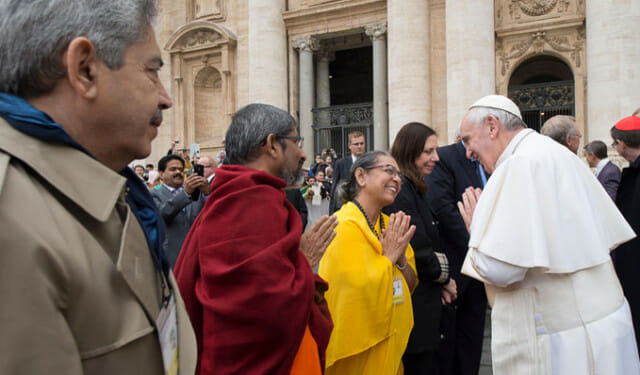 Today, a great variety of events are being celebrated in various parts of the world to reflect on the value of Nostra Aetate and the consequences it has brought about between men and women of different religious traditions. Amongst all is the particularly important event held at the Pontifical Gregorian University and organized by the Pontifical Council for Interreligious Dialogue. For three days, from 26 to 28 October, about 400 people of diverse geographic, cultural and religious areas met and reflected together on what has come about over the last 50 years. There were representatives of all the major religions of the world (Jews, Muslims, Hindus, Jainists, Buddhists, and Sikhs and those of the Tenri-kyo and the traditional African religions). They reflected on highly relevant themes today, violence, commitment to peace, the challenge of religious freedom, education and transmission of values.
Today, a great variety of events are being celebrated in various parts of the world to reflect on the value of Nostra Aetate and the consequences it has brought about between men and women of different religious traditions. Amongst all is the particularly important event held at the Pontifical Gregorian University and organized by the Pontifical Council for Interreligious Dialogue. For three days, from 26 to 28 October, about 400 people of diverse geographic, cultural and religious areas met and reflected together on what has come about over the last 50 years. There were representatives of all the major religions of the world (Jews, Muslims, Hindus, Jainists, Buddhists, and Sikhs and those of the Tenri-kyo and the traditional African religions). They reflected on highly relevant themes today, violence, commitment to peace, the challenge of religious freedom, education and transmission of values.  The convention was opened by Card. Jean-Louis Tauran, President of the Pontifical Council for Interreligious and by Card. Kurt Koch President of the Pontifical Council for Dialogue for the Promotion of Unity among Christians, and ended with a valuable and articulated reflection on ”Educating toward peace” by the Secretary of State, Card. Pietro Parolin. The participants then took part in the Audience in St. Peter’s square where Pope Francis dedicated his catechesis precisely to Nostra Aetate. He proposed a road-map for the future of dialogue, and encouraged all to work together for the poor, justice, the environment, and of course, peace. Rita Mousalem and Roberto Catalano, co-directors of the Centre for Interreligious Dialogue of the Focolare Movement, participated in the convention and conveyed the greetings of Maria Voce and the Movement when they briefly presented the important features of the Focolare’s interreligious dialogue and ensured the commitment of its members in continuing to work for the encounter and friendship between men and women of diverse faiths. Roberto Catalano
The convention was opened by Card. Jean-Louis Tauran, President of the Pontifical Council for Interreligious and by Card. Kurt Koch President of the Pontifical Council for Dialogue for the Promotion of Unity among Christians, and ended with a valuable and articulated reflection on ”Educating toward peace” by the Secretary of State, Card. Pietro Parolin. The participants then took part in the Audience in St. Peter’s square where Pope Francis dedicated his catechesis precisely to Nostra Aetate. He proposed a road-map for the future of dialogue, and encouraged all to work together for the poor, justice, the environment, and of course, peace. Rita Mousalem and Roberto Catalano, co-directors of the Centre for Interreligious Dialogue of the Focolare Movement, participated in the convention and conveyed the greetings of Maria Voce and the Movement when they briefly presented the important features of the Focolare’s interreligious dialogue and ensured the commitment of its members in continuing to work for the encounter and friendship between men and women of diverse faiths. Roberto Catalano
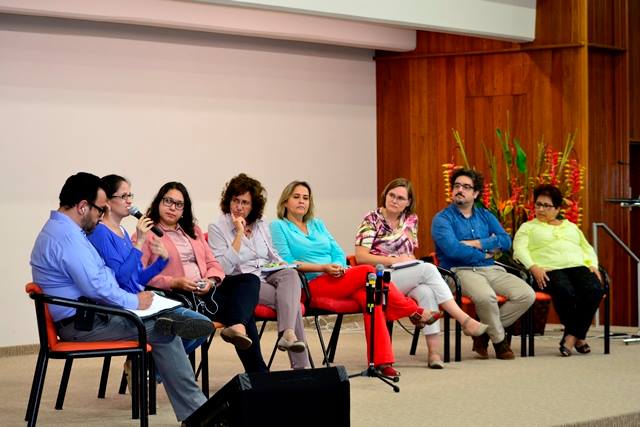
Nov 4, 2015 | Focolare Worldwide
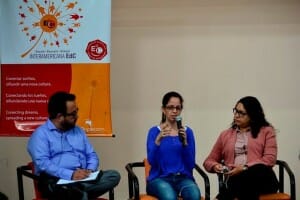 Connect dreams and spread a new culture was the title of an inter-American workshop by the Economy of Communion, which was held on October 26-31 at Mariapolis Ginetta, San Paolo, Brazil. Mariapolis Ginetta is the place where Chiara Lubich’s inspiration for the EoC was born in 1991. Sixty young people from Paraguay, Argentina, Mexico, Guatemala, Cuba, Colombia,, Bolivia and Brazil attended the even and have decided to embrace the EoC project and its innovative principles as they were first presented by the Focolare foundress. The business owners promised to accompany the young people on this difficult path. At the conclusion of the school every student received a certificate of participation from their partner. Thus a new form of communion was begun that has been called “Operation one for one”. Clézia Maria Pinto, head projects for Anpecom (the association that coordinates Economy of Communion projects in Brazil), announced the launching of a financial support programme for small businesses that operate in socially vulnerable situations, offering nutritional products or services in favour of educaiton health and housing, as well as to projects that focus on middle, low-income, and the neediest groups. The programme is inspired by projects that are already underway in other areas of the world, that offer funding and benefits linked to general adherence to the EoC.
Connect dreams and spread a new culture was the title of an inter-American workshop by the Economy of Communion, which was held on October 26-31 at Mariapolis Ginetta, San Paolo, Brazil. Mariapolis Ginetta is the place where Chiara Lubich’s inspiration for the EoC was born in 1991. Sixty young people from Paraguay, Argentina, Mexico, Guatemala, Cuba, Colombia,, Bolivia and Brazil attended the even and have decided to embrace the EoC project and its innovative principles as they were first presented by the Focolare foundress. The business owners promised to accompany the young people on this difficult path. At the conclusion of the school every student received a certificate of participation from their partner. Thus a new form of communion was begun that has been called “Operation one for one”. Clézia Maria Pinto, head projects for Anpecom (the association that coordinates Economy of Communion projects in Brazil), announced the launching of a financial support programme for small businesses that operate in socially vulnerable situations, offering nutritional products or services in favour of educaiton health and housing, as well as to projects that focus on middle, low-income, and the neediest groups. The programme is inspired by projects that are already underway in other areas of the world, that offer funding and benefits linked to general adherence to the EoC.  In the invitation, those who worked in preparing the workshop, wrote to their peers: “Let us not give up in front of social injustice and inequality” and posed a challenging question: “What if this change were to begin from becoming aware of what poverty, economy, work and interpersonal relations are?” These were only some of the topics that were presented during roundtable discussions, small group meetings where the main actors were the young people themselves and their expert business owners who had years of experience under their belts. In his final remarks, Anouk Grevin from the International Commission of the EoC admitted that there was the hope that the present workshop would function as a laboratory that would open new roads for the EoC not only in Latin America, but around the world.
In the invitation, those who worked in preparing the workshop, wrote to their peers: “Let us not give up in front of social injustice and inequality” and posed a challenging question: “What if this change were to begin from becoming aware of what poverty, economy, work and interpersonal relations are?” These were only some of the topics that were presented during roundtable discussions, small group meetings where the main actors were the young people themselves and their expert business owners who had years of experience under their belts. In his final remarks, Anouk Grevin from the International Commission of the EoC admitted that there was the hope that the present workshop would function as a laboratory that would open new roads for the EoC not only in Latin America, but around the world.

Nov 3, 2015 | Senza categoria
On the bus I was on Bus 45 which I take to work every day, when a man clearly in a bad mood climbed on. People who had realized this moved out of his way and avoided him. I, however, remained where I was and helped him with the plastic bags he was carrying. My day seemed to become brighter. Another day, on the same bus, there was the same man again. As soon as he saw me, he came to greet me. And this continued to happen. Even a very small gesture is enough to let another person, any neighbor whom I encounter throughout my day, feel welcomed and loved. E.M. – Hungary  Tattoos On the train, I was sitting next to a girl and a boy covered in tattoos of a satanic nature. My propensity to look for the positive aspects in others made me think that those two must have a reason for displaying such symbols. After some hesitation, I got up my courage and asked them the meaning of their tattoos. Their eyes lit up. They took turns answering me, but each with the same sweetness: “We are grateful that you asked this question. Usually, people judge us and in the best case scenario, pretend they don’t see us. We aren’t what we seem, we only want to shake up this paralyzed and spineless society.” M.I. – France A carriage for Jamal It was Sunday afternoon. Jamal, a Moroccan worker I know, had brought me some apples. Talking with him, I found out that he was expecting a child to be born in December. However, they did not have any of the things necessary for the baby; above all, they would need a baby carriage. After listening attentively to him, an idea came to me: “Why don’t we ask God’s help together, the two of us? God is the same for everyone, you can call him by another name, but he’s still God. He will know how to find us a baby carriage.” Jamal liked the idea. We were in the open courtyard; we lifted our eyes towards heaven and we prayed as follows: “Lord God, we need a baby carriage. Please take care of it.” We were a young Muslim man and a Catholic woman: two different faiths, yet united in the asking. God accepted our prayer: the following Thursday the requested carriage arrived as a gift. V.M. – Italy
Tattoos On the train, I was sitting next to a girl and a boy covered in tattoos of a satanic nature. My propensity to look for the positive aspects in others made me think that those two must have a reason for displaying such symbols. After some hesitation, I got up my courage and asked them the meaning of their tattoos. Their eyes lit up. They took turns answering me, but each with the same sweetness: “We are grateful that you asked this question. Usually, people judge us and in the best case scenario, pretend they don’t see us. We aren’t what we seem, we only want to shake up this paralyzed and spineless society.” M.I. – France A carriage for Jamal It was Sunday afternoon. Jamal, a Moroccan worker I know, had brought me some apples. Talking with him, I found out that he was expecting a child to be born in December. However, they did not have any of the things necessary for the baby; above all, they would need a baby carriage. After listening attentively to him, an idea came to me: “Why don’t we ask God’s help together, the two of us? God is the same for everyone, you can call him by another name, but he’s still God. He will know how to find us a baby carriage.” Jamal liked the idea. We were in the open courtyard; we lifted our eyes towards heaven and we prayed as follows: “Lord God, we need a baby carriage. Please take care of it.” We were a young Muslim man and a Catholic woman: two different faiths, yet united in the asking. God accepted our prayer: the following Thursday the requested carriage arrived as a gift. V.M. – Italy
Nov 2, 2015 | Non categorizzato
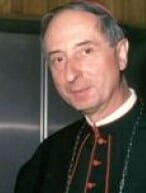
Nov 1, 2015 | Non categorizzato

Klaus Hemmerle
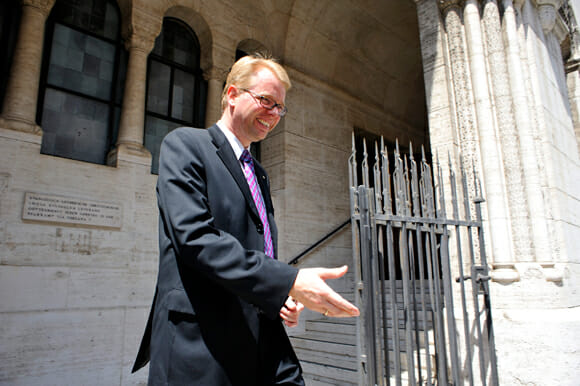
Oct 31, 2015 | Non categorizzato
It was in a spirit of ecumenism that 80 Christians from different denominations gathered on September 12th in the German town of Zwochau.  During her visit to Zwochau in 2013, on behalf of the Movement Maria Voce expressed the desire to know Martin Luther better and also the faithful of the Lutheran Church. More recently, because of an exchange of letters last May between Cardinal Marx, president of the German Catholic Bishops Conference and Bishop Bedford Strohm, Chairman of the Evangelische Kirche in Deutschland (EKD), the idea was put forward of promoting more cooperation between Christian confessions in view of the 500th anniversary of the Reformation that will be celebrated in 2017. There were two points for reflection. The first, given by Lutheran theologian Florian Zobel, focused on Luther and his life, highlighting several little known aspects, and concluded with the words of Pope Benedict XVI: “For Luther theology was not an academic issue, but the interior struggle with himself. […] The question: ‘Where does God stand in relation to me? How do I stand before God?’ […] I think that this is the first summons we should hear from Luther.” The second point presented by Catholic theologian and researcher on Luther, Hubertus Blaumeiser, focused on the spirituality of the reformer monk and, in particular, the “theology of the cross” and the meaning of “Reform” that followed: “Not merely a transformation, a change or improvement in accordance with one’s personal plans,” he said, “but a new beginning, starting from the roots; that is, the return to the Scripture, […] to the Gospel of God’s grace and to the new choice of a life with, for and through the Crucified Christ.” In the afternoon a roundtable was held, moderated by Hermann Schweers and Lutheran pastor, Axel Meissner of Schkeuditz, and Emeritus Bishop Joachim Reinelt of Dresda. There were numerous interventions from the audience that touched upon topics such as the importance of the ecumenical effort in a society of non-believers, and the meaning of the Reform for today’s world. The day concluded with an ecumenical celebration.
During her visit to Zwochau in 2013, on behalf of the Movement Maria Voce expressed the desire to know Martin Luther better and also the faithful of the Lutheran Church. More recently, because of an exchange of letters last May between Cardinal Marx, president of the German Catholic Bishops Conference and Bishop Bedford Strohm, Chairman of the Evangelische Kirche in Deutschland (EKD), the idea was put forward of promoting more cooperation between Christian confessions in view of the 500th anniversary of the Reformation that will be celebrated in 2017. There were two points for reflection. The first, given by Lutheran theologian Florian Zobel, focused on Luther and his life, highlighting several little known aspects, and concluded with the words of Pope Benedict XVI: “For Luther theology was not an academic issue, but the interior struggle with himself. […] The question: ‘Where does God stand in relation to me? How do I stand before God?’ […] I think that this is the first summons we should hear from Luther.” The second point presented by Catholic theologian and researcher on Luther, Hubertus Blaumeiser, focused on the spirituality of the reformer monk and, in particular, the “theology of the cross” and the meaning of “Reform” that followed: “Not merely a transformation, a change or improvement in accordance with one’s personal plans,” he said, “but a new beginning, starting from the roots; that is, the return to the Scripture, […] to the Gospel of God’s grace and to the new choice of a life with, for and through the Crucified Christ.” In the afternoon a roundtable was held, moderated by Hermann Schweers and Lutheran pastor, Axel Meissner of Schkeuditz, and Emeritus Bishop Joachim Reinelt of Dresda. There were numerous interventions from the audience that touched upon topics such as the importance of the ecumenical effort in a society of non-believers, and the meaning of the Reform for today’s world. The day concluded with an ecumenical celebration.

Pastor Jens-Martin Kruse. Photo: Harald Krille
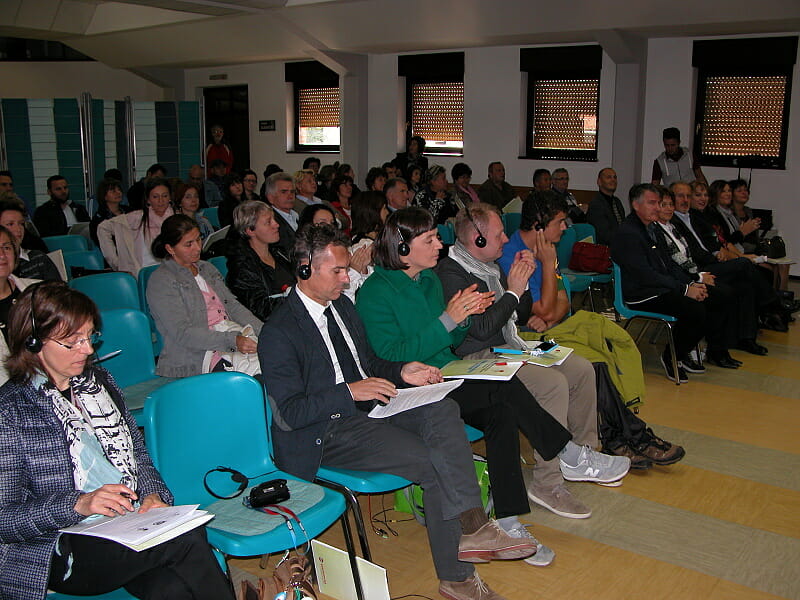
Oct 30, 2015 | Focolare Worldwide, Senza categoria
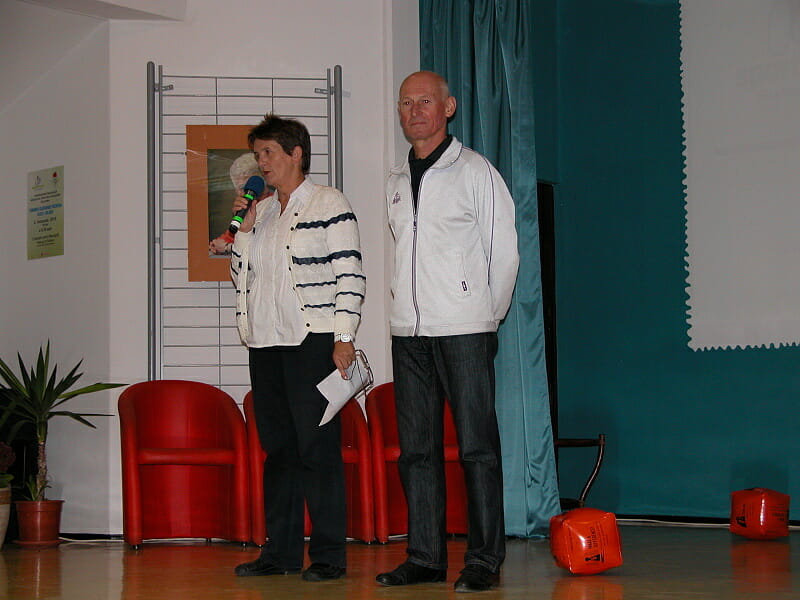 Can sports contribute to building a more united world? Could it become a field of action and a tool for unity among individuals and peoples? These were the queries that sparked up the experience of the founders of Sportmeet, motivated by the sharing of the common passion for sports. “Since we were not sure we had all the answers, we scouted out the people and experiences of the sports world that could help us, and through the years were able to establish, specifically three elements that trace the identity of Sportmeet: the high consideration for sports as an important aspect of society; the capacity and objective to unite the most diverse categories of people interested in sports; and the challenge to merge theory and practice in a framework which tends to separate the sports specialists from those who practice it.” These were some excerpts from the speech of Paolo Cipolli, President of Sportmeet for a United World, which opened the seventh convention organized by the Sportmeet network in Krizevci (Croatia). The intent was to consider sports in dialogue with contemporary society, with the conviction that it can give a specific, stimulating and positive contribution to culture and the construction of active and responsible citizenship.
Can sports contribute to building a more united world? Could it become a field of action and a tool for unity among individuals and peoples? These were the queries that sparked up the experience of the founders of Sportmeet, motivated by the sharing of the common passion for sports. “Since we were not sure we had all the answers, we scouted out the people and experiences of the sports world that could help us, and through the years were able to establish, specifically three elements that trace the identity of Sportmeet: the high consideration for sports as an important aspect of society; the capacity and objective to unite the most diverse categories of people interested in sports; and the challenge to merge theory and practice in a framework which tends to separate the sports specialists from those who practice it.” These were some excerpts from the speech of Paolo Cipolli, President of Sportmeet for a United World, which opened the seventh convention organized by the Sportmeet network in Krizevci (Croatia). The intent was to consider sports in dialogue with contemporary society, with the conviction that it can give a specific, stimulating and positive contribution to culture and the construction of active and responsible citizenship.  About a hundred participants – deans, teachers of movement control sciences schools, pedagogists, athletes, heads of sports clubs, referees, educators, university students, and sports journalists, most of whom did not declare any religious convictions – coming from various regions of Croatia and Serbia, turned up at the event held at the “Mariapolis Faro” in Croatia from 2 to 4 October. Also present were the local and regional institutions that sponsored the Convention, as well as the national TV channel, local radio, and athlete, Branko Zorko, half-marathon road running specialist and three times world Olympic champion in the 1500-metre race, a native of the place and who has been in contact with Sportmeet for some time now. The theme of the convention “Free time as a resource for the young generations,” which evidenced the great changes and risks deriving from the massive use of the internet and diffusion of new technologies, was clearly and passionately underlined by Mirna Andrijašević of the Faculty of Motor Sciences of Zagreb. Alexandar Ivanosky of the private Sports and Health Faculty of Belgrade (Serbia), underlined the importance of the presence of adults, and called all to face the challenge of seeking creative approaches together with the youth who are often alone in facing the powerful stimuli of technology and the social networks. Milan Čapalija, psychiatrist, and Majda Fajdetić, pedagogist of the Zagreb Ministry of Education, highlighted the various methodologies that promote pedagogic action in reassessing the importance of games and sports. Various interactive workshops ended with a game for boys and girls of the high school in the city’s charming main square. It was a testing ground and at the same time also an occasion to divulge the typical activities of Sportmeet which centres on dialogue as a resource and essential opportunity to promote a new sports culture. As a sign of the atmosphere of esteem and trust which has grown over the years, Alexandar Ivanosky (Serbia), underlined the capacity of Croatian sports athletes to excel in team sports and encouraged even greater stringent interaction to share the spirit of fraternity that drives this group in the Balkans and also in other parts of the world. The convention closed with the announcement of the next Summer School 2016 to be held in the same city of Krizevci from 14 to 17 July.
About a hundred participants – deans, teachers of movement control sciences schools, pedagogists, athletes, heads of sports clubs, referees, educators, university students, and sports journalists, most of whom did not declare any religious convictions – coming from various regions of Croatia and Serbia, turned up at the event held at the “Mariapolis Faro” in Croatia from 2 to 4 October. Also present were the local and regional institutions that sponsored the Convention, as well as the national TV channel, local radio, and athlete, Branko Zorko, half-marathon road running specialist and three times world Olympic champion in the 1500-metre race, a native of the place and who has been in contact with Sportmeet for some time now. The theme of the convention “Free time as a resource for the young generations,” which evidenced the great changes and risks deriving from the massive use of the internet and diffusion of new technologies, was clearly and passionately underlined by Mirna Andrijašević of the Faculty of Motor Sciences of Zagreb. Alexandar Ivanosky of the private Sports and Health Faculty of Belgrade (Serbia), underlined the importance of the presence of adults, and called all to face the challenge of seeking creative approaches together with the youth who are often alone in facing the powerful stimuli of technology and the social networks. Milan Čapalija, psychiatrist, and Majda Fajdetić, pedagogist of the Zagreb Ministry of Education, highlighted the various methodologies that promote pedagogic action in reassessing the importance of games and sports. Various interactive workshops ended with a game for boys and girls of the high school in the city’s charming main square. It was a testing ground and at the same time also an occasion to divulge the typical activities of Sportmeet which centres on dialogue as a resource and essential opportunity to promote a new sports culture. As a sign of the atmosphere of esteem and trust which has grown over the years, Alexandar Ivanosky (Serbia), underlined the capacity of Croatian sports athletes to excel in team sports and encouraged even greater stringent interaction to share the spirit of fraternity that drives this group in the Balkans and also in other parts of the world. The convention closed with the announcement of the next Summer School 2016 to be held in the same city of Krizevci from 14 to 17 July.
Oct 29, 2015 | Non categorizzato
On the 50th anniversary of Gravissimum educationis, the Second Vatican Council document on Education, a World Congress promoted by the Congregation for Catholic Education will held in Rome, Italy. The title of the conference: Educating Today and Tomorrow. . . .A Renewing Passion The congress will be attended by people engaged in the educational mission in Catholic schools and universities around the world. They will give a global glance to see what the contribution of the Christian community can be in multi-cultural and multi-religious contexts that are rapidly changing. The present educational and social emergency demands a review of educational approaches that are capable of transforming reality and are within the reach and the needs of children, teenagers and young people. The congress will include reports, testimonies and roundtables with experts from around the world. The congress will have three sessions:
- Opening Session(November 18, in Paolo VI Hall, Vatican City, Italy)
- The Main Session divided into Subsections: “School and University” (November 19-20, at the Mariapolis Centre of Castel Gandolfo, Italy); and OIEC Congress (at l’Auditorium di Via della Conciliazione, Rome, Italy)
- Closing Session (November 21, at Paul VI Hall, Vatican City, Italy) with an address by Pope Francis.
During the Closing Session in the presence of the Pope, the Service Learning Educational Model will be presented, which borrows several of its philosophical and methodological foundations from Chiara Lubich’s Education for Communion proposal as a proven educational approach that the Congregation for Catholic Education will recommend to educational institutions of the whole world.
Oct 29, 2015 | Non categorizzato
“Within a month, I will receive in Constantinople the Bishop Friends of the Movement:” The Ecumenical Patriarch of Constantinople himself announced to the press the news of the upcoming Meeting of Bishops from Different Churches, Friends of the Focolare that will be held in Istanbul on November 25-30, 2015. He made the announcement during an interview following the Ceremony of the Honorary Degree in the Culture of Unity, October 26, 2015 at Sophia University Institute, Loppiano, Italy. “We will have a meeting in Halki,” he continued, “at the school of theology, and there we will have the opportunity to remember Chiara Lubich and pray for the repose of her soul, and express our experiences and our will to work for the unity of the Churches. We, as the Church of Constantinople, are happy and ready to welcome them, to exchange our experiences and the Kiss of Peace between East and West.”
![Turkey. A Wind of Unity on Heybeli Island, Itstanbul.]()
Oct 29, 2015 | Non categorizzato
 This is the title, but also the wish of the European Assembly of Religions for Peace (RfP), the organism that gathers the unites religious leaders of the world in walking together in the search for peace and justice, and Maria Voce is the co-president. Religions for Peace is currently involved in a global campaign called the Faiths for Earth project. “A very important initiative,” said Voce, because “humankind is facing an unprecedented challenge of global proportions, with little time left before it is too late. I see a providential synergy with the Pope’s Encyclical Laudato si’, which has generated such great interest around the world. In her opening address, on October 29, the Focolare’s president recalled the recent events that have changed the face of Europe. In front of the “tide of immigrants and migrants without historical precedent,” […] “Numerically speaking this phenomenon is far greater than the one million stateless people after the Second World War,” Maria Voce highlighted the dramatic situation that make us feel “dismayed, at a loss, and sometimes very uncomfortable, perhaps also deeply ashamed at our own powerlessness.” Among the causes she pointed to, also the “dramatic and questionable military interventions which destabilised whole nations in North Africa, the Middle East and Sub-Saharan Africa and other ongoing conflicts. Our European nations are certainly not completely blameless with regard to these conflicts. ” Great concern: “What is most worrisome about our continent is the deep identity crisis which prevents these emergencies from being addressed in a co-ordinated and united way; and the “people fleeing from hunger and war becoming often the cause of strife and nationalistic backlashes. They continue to be victims of selfish exploitation, and become tools in political strategies to win favour and promote dangerous populist action.” And so, “believers, as members of varied religious traditions, together with all men and women of good will” join the cause. “We are certainly different,” Maria Voce acknowledges, “but we are all united by the same imperative, so well expressed by the Golden Rule put in many different ways in all our scriptures. We can sum it up in these words: “Do to others as you would have them do to you.” (Luke 6:31). The Golden Rule is an ethical and spiritual norm that is too often forgotten. It has been put forward by Pope Francis as a true socio-political paradigm in his speech before Congress in the United States a few weeks ago.” The Golden Rule “calls us to respond to these crises, inviting us as leaders, as communities and as individuals to a shared commitment, one that is concrete, constant and heroic, even, so as to come to the aid of the mass of suffering people who plead for help, who are weeping and struggling and who, despite everything, carry on hoping. And it opens a window: “In fact, religion itself, which for centuries has been relegated to the private life of individuals and communities, and was considered by many as finished with until a few decades ago, has now become more accepted within the public life of our countries and our continent. It is needed today to give meaning and a soul, as well as true and satisfying answers, to humankind which is so confused and lost and traumatised today. It is enough to think of Pope Francis and the effect he is having in the world.” “This is the extraordinary adventure that we are called to live in our day and Religions for Peace is a providential platform: each one of us has a clear role in its immense workings. We are a wonderful international, intercultural and interreligious community, made one family above all by the shared ideal,” based on several basic points: Unity in diversity; Reciprocity in our relationships; and equality in our shared human dignity.” “On this solid foundation” it will be possible to “offer an effective contribution to peace and reconciliation in Europe;” and to set a final goal for ourselves: “humankind living according to God’s design fulfilled, which means universal fraternity.”
This is the title, but also the wish of the European Assembly of Religions for Peace (RfP), the organism that gathers the unites religious leaders of the world in walking together in the search for peace and justice, and Maria Voce is the co-president. Religions for Peace is currently involved in a global campaign called the Faiths for Earth project. “A very important initiative,” said Voce, because “humankind is facing an unprecedented challenge of global proportions, with little time left before it is too late. I see a providential synergy with the Pope’s Encyclical Laudato si’, which has generated such great interest around the world. In her opening address, on October 29, the Focolare’s president recalled the recent events that have changed the face of Europe. In front of the “tide of immigrants and migrants without historical precedent,” […] “Numerically speaking this phenomenon is far greater than the one million stateless people after the Second World War,” Maria Voce highlighted the dramatic situation that make us feel “dismayed, at a loss, and sometimes very uncomfortable, perhaps also deeply ashamed at our own powerlessness.” Among the causes she pointed to, also the “dramatic and questionable military interventions which destabilised whole nations in North Africa, the Middle East and Sub-Saharan Africa and other ongoing conflicts. Our European nations are certainly not completely blameless with regard to these conflicts. ” Great concern: “What is most worrisome about our continent is the deep identity crisis which prevents these emergencies from being addressed in a co-ordinated and united way; and the “people fleeing from hunger and war becoming often the cause of strife and nationalistic backlashes. They continue to be victims of selfish exploitation, and become tools in political strategies to win favour and promote dangerous populist action.” And so, “believers, as members of varied religious traditions, together with all men and women of good will” join the cause. “We are certainly different,” Maria Voce acknowledges, “but we are all united by the same imperative, so well expressed by the Golden Rule put in many different ways in all our scriptures. We can sum it up in these words: “Do to others as you would have them do to you.” (Luke 6:31). The Golden Rule is an ethical and spiritual norm that is too often forgotten. It has been put forward by Pope Francis as a true socio-political paradigm in his speech before Congress in the United States a few weeks ago.” The Golden Rule “calls us to respond to these crises, inviting us as leaders, as communities and as individuals to a shared commitment, one that is concrete, constant and heroic, even, so as to come to the aid of the mass of suffering people who plead for help, who are weeping and struggling and who, despite everything, carry on hoping. And it opens a window: “In fact, religion itself, which for centuries has been relegated to the private life of individuals and communities, and was considered by many as finished with until a few decades ago, has now become more accepted within the public life of our countries and our continent. It is needed today to give meaning and a soul, as well as true and satisfying answers, to humankind which is so confused and lost and traumatised today. It is enough to think of Pope Francis and the effect he is having in the world.” “This is the extraordinary adventure that we are called to live in our day and Religions for Peace is a providential platform: each one of us has a clear role in its immense workings. We are a wonderful international, intercultural and interreligious community, made one family above all by the shared ideal,” based on several basic points: Unity in diversity; Reciprocity in our relationships; and equality in our shared human dignity.” “On this solid foundation” it will be possible to “offer an effective contribution to peace and reconciliation in Europe;” and to set a final goal for ourselves: “humankind living according to God’s design fulfilled, which means universal fraternity.”
Oct 29, 2015 | Non categorizzato, Word of
[soundcloud url=”https://api.soundcloud.com/tracks/232719178″ params=”color=ff5500&auto_play=false&hide_related&visual=false&show_comments=true&show_user=true&show_reposts=false” width=”100%” height=”166″ iframe=”true” /]
‘That they may all be one’ (Jn 17:21). We can share God’s own dream and, as Jesus did, live and pray for unity. It will lead us down his path of death and resurrection together with him. This is the last, heartfelt prayer that Jesus spoke to the Father. He knew he was asking the thing closest to his heart. God, indeed, created humanity as his family, to give it every good thing, sharing his very own divine life. What do parents dream for their children if not that they should care for one another, help one another, live united with one another? And what saddens them more than seeing their children divided by jealousy or money matters, even to the point of not speaking to each other? God too has dreamt from all eternity of a family of his own living united as children in a communion of love with him and with one another. The Bible’s dramatic origin story speaks to us of sin and of the progressive break-up of the human family. As we read in the book of Genesis, the man accused the woman, Cain killed his own brother, Lamech took pride in his exaggerated vendetta, Babel generated misunderstanding and the separation of peoples… God’s project looked like a failure. Nonetheless, he did not give in and with determination sought the reunification of his family. The story begins again with Noah, with the choice of Abraham, with the birth of the chosen people. And so it goes on, to the point of deciding to send his Son to earth entrusted with a great mission: to gather into one family the separated children, to welcome the lost sinners into a single fold, to break down the walls of separation and the hostilities among peoples to create one new people (see Eph 2:14-16). God does not cease to dream of unity, and for this reason Jesus asks it of him as the greatest gift he can implore for all of us – ‘Father, I pray That they may all be one.’ Every family looks like its parents. So too the family of God. God is Love not only because he loves what he creates; but he is Love in himself, in mutual giving and communion, lived out by each of the three divine Persons with the others. Therefore when God created the human race he made it in his image and likeness and he impressed upon it the same capacity for relationship, so that every person may live in mutual self-giving. A more complete version of the words in the prayer of Jesus that we want to live this month, in fact, says: ‘that they may all be one. As you, Father, are in me and I am in you, may they also be in us.’ The model for our unity is nothing less than the unity that exists between the Father and Jesus. It seems impossible, so profound is it. It is, however, made possible by that ‘As’, which means also ‘Because’. We can be united as the Father and Jesus are united because they draw us into their own unity, they give it to us as a gift. ‘That they may all be one.’ Precisely this is the work of Jesus, making all of us one, as he is with the Father, one single family, one people. To do this he made himself one of us, took upon himself all our divisions and our sins, nailing them to the cross. He himself pointed out the way he would take to bring us to unity: ‘And I, when I am lifted up from the earth, will draw all people to myself’ (Jn 12:32). As the High Priest had prophesied, he had to die ‘to gather into one the dispersed children of God’ (Jn 11:52). In his mystery of death and resurrection, he has gathered up all things into himself (see Eph 1:10), has recreated the unity broken by sin, has remade the family around the Father and has made us again brothers and sisters of one another. Jesus has completed his mission. What is left now is our part, our participation, our ‘yes’ to his prayer: ‘That they may all be one.’ What is our contribution to fulfilling this prayer? In the first place we have to make it our own. We can offer our lips and heart to Jesus so that he can continue speaking these words to the Father and with trust we can repeat his prayer every day. Unity is a gift from above, to be asked with faith, without ever growing tired. More than this it must be constantly at the forefront of our thoughts and wishes. If this is God’s dream, we want it to be ours as well. Periodically and before every decision, every choice, every action, we can ask ourselves: does this help to build unity, is it the best thing to do to bring about unity? And finally we ought to run to wherever disunity is most evident and take it upon ourselves as Jesus did. There may be friction in our family or among people we know, tensions in our neighbourhood, disagreements at work, in the parish, among the Churches. Never shy away from dissension and incomprehension, never be indifferent, but take to them our love that becomes listening, attention to the other person, sharing in the pain that results from that open wound. And above all live in unity with whoever is open to sharing Jesus’s ideal and prayer, without giving weight to misunderstandings or contrasting ideas, but content with ‘what is less perfect in unity more than what is more perfect in disunity’, accepting the differences with joy, indeed considering them richnesses for a unity that is never a reduction to uniformity. Yes, at times this will put us on the cross, but is it precisely the way Jesus chose to remake the unity of the human family, the way we too wish to walk with him. Fabio Ciardi
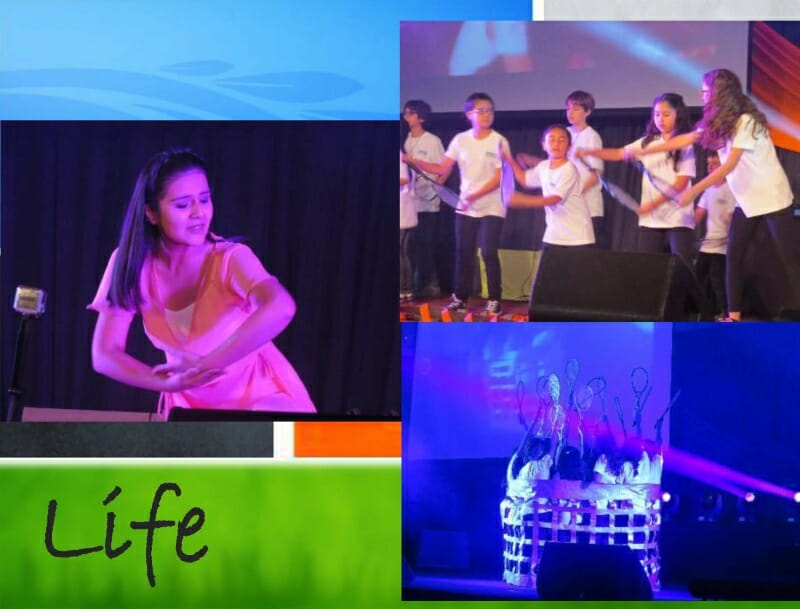
Oct 29, 2015 | Focolare Worldwide
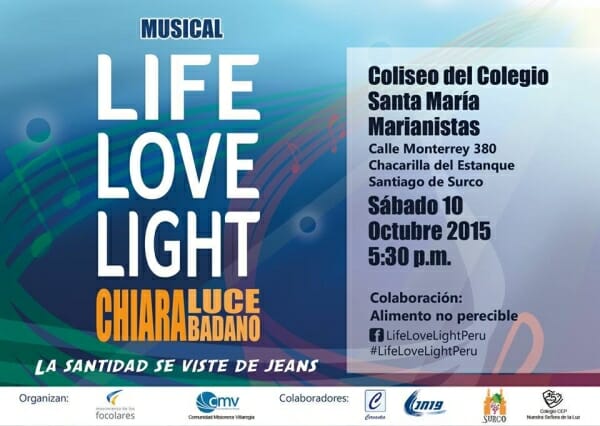 The musical, “Life, Love Light,” inspired by the life of Blessed Chiara Luce Badano, has arrived in Peru: on October 10th, just a few days after the 5th anniversary of the beatification of the young woman from Sassello, the show took the stage in Lima. Months ago, the Peruvian young people of the Focolare Movement had already contacted their Spanish peers, who had put on the same show in Burgos in their language, in order to obtain the materials. They were helped by the collaboration of the Community of Villaregia and the Misioneras Identes and several professionals – as they admit, “The show was beyond our capacities,” – who undertook the preparation of the musical.
The musical, “Life, Love Light,” inspired by the life of Blessed Chiara Luce Badano, has arrived in Peru: on October 10th, just a few days after the 5th anniversary of the beatification of the young woman from Sassello, the show took the stage in Lima. Months ago, the Peruvian young people of the Focolare Movement had already contacted their Spanish peers, who had put on the same show in Burgos in their language, in order to obtain the materials. They were helped by the collaboration of the Community of Villaregia and the Misioneras Identes and several professionals – as they admit, “The show was beyond our capacities,” – who undertook the preparation of the musical. 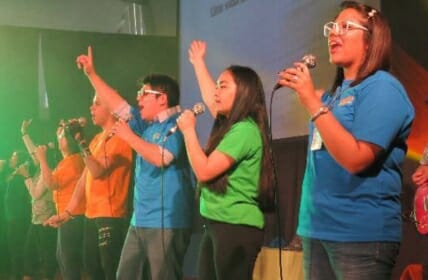 There were 75 young people who participated in the musical production, both from the Focolare and from other Movements who got involved. And one cannot overlook a series of “fortunate coincidences” in which the young people saw the hand of God’s Providence: from the availability of a hall which seats hundreds in a well-known section of Lima, to the meals brought for the whole team, thanks to the generosity of an adherent of the Movement, to the interviews released to two television stations – one of which taped the show for a pre-recorded broadcast.
There were 75 young people who participated in the musical production, both from the Focolare and from other Movements who got involved. And one cannot overlook a series of “fortunate coincidences” in which the young people saw the hand of God’s Providence: from the availability of a hall which seats hundreds in a well-known section of Lima, to the meals brought for the whole team, thanks to the generosity of an adherent of the Movement, to the interviews released to two television stations – one of which taped the show for a pre-recorded broadcast. 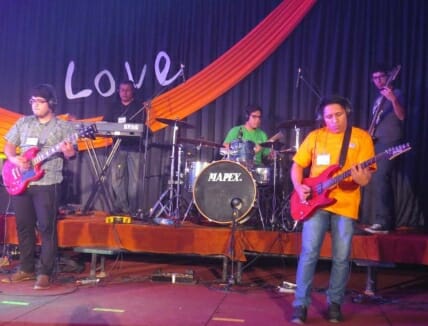 Even the 500 spectators did not hold back their generosity: while the admission was free, they responded to the appeal to donate dry or canned goods, which arrived in great quantities, to give to the needy people in the Community of Villaregia. The show was a great success in other ways, as the participants testified that it helped them to discover and value many hidden talents. A touching testimony was given by a mother of a 13-year-old girl affected by a serious form of depression, who said: “You have changed my daughter’s life.”
Even the 500 spectators did not hold back their generosity: while the admission was free, they responded to the appeal to donate dry or canned goods, which arrived in great quantities, to give to the needy people in the Community of Villaregia. The show was a great success in other ways, as the participants testified that it helped them to discover and value many hidden talents. A touching testimony was given by a mother of a 13-year-old girl affected by a serious form of depression, who said: “You have changed my daughter’s life.”  A message sent by Chiara Luce’s parents, Ruggero e Maria Teresa Badano, closed the evening, with their thanks for all that was achieved: “Her push towards sanctity and her faithfulness to the values of the Gospel of Jesus,” they wrote, “guided Chiara Luce even in the most difficult moments of her existence, and we are convinced that she will know how to inspire you. Because, as her spiritual mother Chiara Lubich said, ‘You have only one life, it’s worthwhile to live it well.’“
A message sent by Chiara Luce’s parents, Ruggero e Maria Teresa Badano, closed the evening, with their thanks for all that was achieved: “Her push towards sanctity and her faithfulness to the values of the Gospel of Jesus,” they wrote, “guided Chiara Luce even in the most difficult moments of her existence, and we are convinced that she will know how to inspire you. Because, as her spiritual mother Chiara Lubich said, ‘You have only one life, it’s worthwhile to live it well.’“
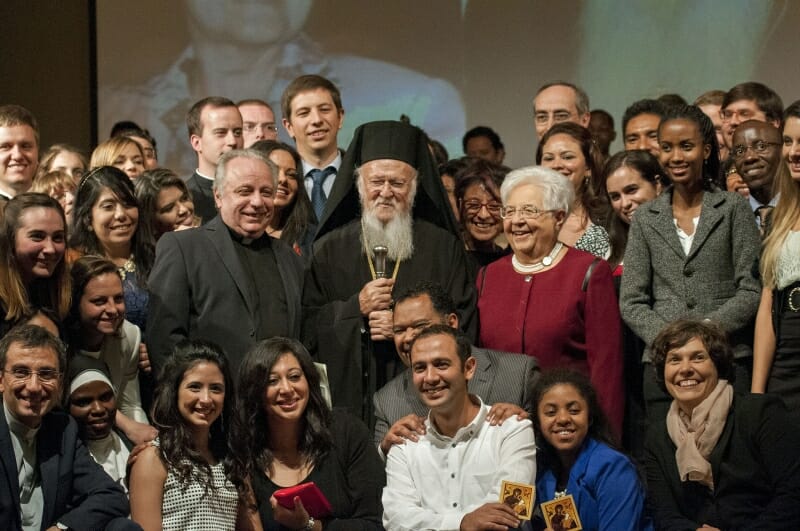
Oct 28, 2015 | Focolare Worldwide
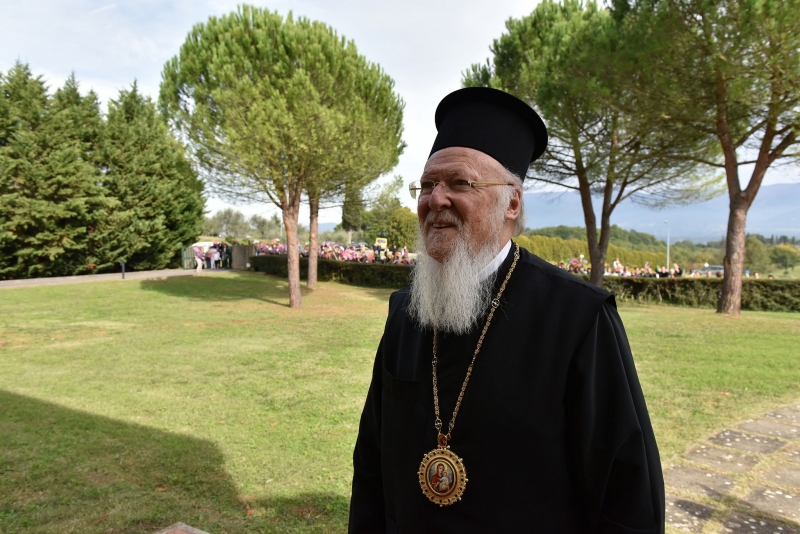
© CSC Audiovisivi

© CSC Audiovisivi
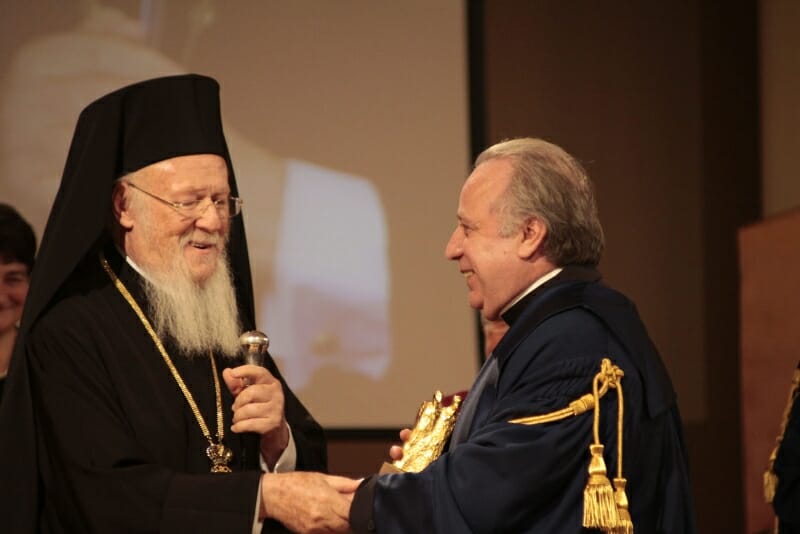
Oct 28, 2015 | Non categorizzato

Foto © CSC Audiovisivi
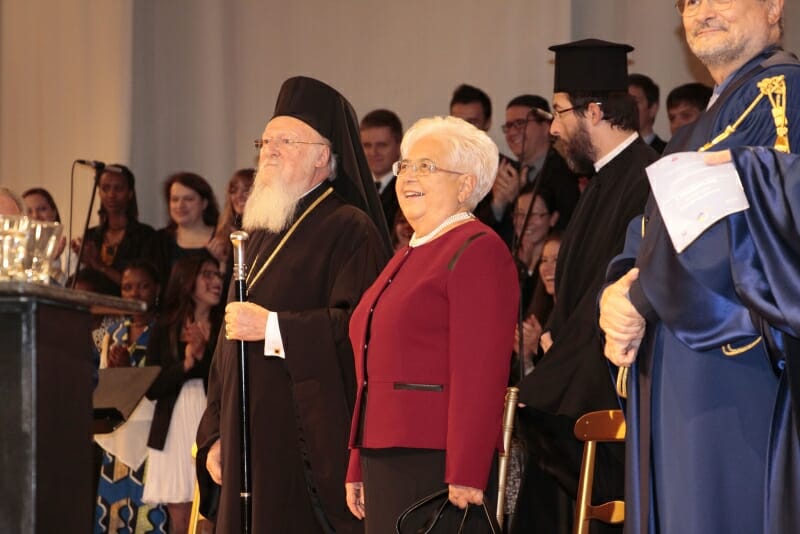
Oct 27, 2015 | Non categorizzato
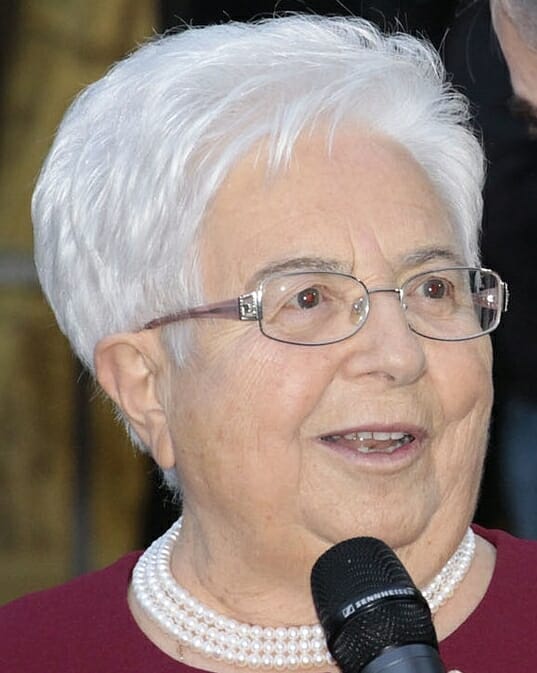 “Everyone was so touched by the brotherly affection that joins the Holy Father Francesco to His Holiness Patriarch Bartholomew. The Pope recognizes the Patriarch’s commitment in the journey of unity, which he describes as our common journey. Not only that: he very courageously says that this Honorary Degree is a step ahead in that journey.” You know the Patriarch very well, you have lived and now live even more intensely, this moment in a long history of closeness between the Focolare Movement and the Orthodox Church and its Patriarchs. What are your views on this Patriarch and the significance of this recognition? “Patriarch Bartholomew is the heir of the great Patriarch Athenagoras who really possessed this passion for unity which, in him, was almost a prophetic vision that he was not able to realize. This passion was transmitted particularly to Patriarch Bartholomew who never misses an opportunity to press for unity in the heart of the Orthodox Church, so that they can talk to one another to the Church of Rome with a voice that is already in a certain sense synodal. He tries in many ways to emphasise how much this journey together is alive. I think we are truly at a happy moment because there is gentle pressure being given by two heads of our two Churches, and that cannot but produce fruit. There will be resistance as Pope Francis pointed out at the conclusion of the Synod, but in the end there is the Holy Spirit who will help us, who pushes the Church securely towards the unity of the Churches. We think that this is a happy moment and that this recognition might be an important step, a concrete step on this journey.”
“Everyone was so touched by the brotherly affection that joins the Holy Father Francesco to His Holiness Patriarch Bartholomew. The Pope recognizes the Patriarch’s commitment in the journey of unity, which he describes as our common journey. Not only that: he very courageously says that this Honorary Degree is a step ahead in that journey.” You know the Patriarch very well, you have lived and now live even more intensely, this moment in a long history of closeness between the Focolare Movement and the Orthodox Church and its Patriarchs. What are your views on this Patriarch and the significance of this recognition? “Patriarch Bartholomew is the heir of the great Patriarch Athenagoras who really possessed this passion for unity which, in him, was almost a prophetic vision that he was not able to realize. This passion was transmitted particularly to Patriarch Bartholomew who never misses an opportunity to press for unity in the heart of the Orthodox Church, so that they can talk to one another to the Church of Rome with a voice that is already in a certain sense synodal. He tries in many ways to emphasise how much this journey together is alive. I think we are truly at a happy moment because there is gentle pressure being given by two heads of our two Churches, and that cannot but produce fruit. There will be resistance as Pope Francis pointed out at the conclusion of the Synod, but in the end there is the Holy Spirit who will help us, who pushes the Church securely towards the unity of the Churches. We think that this is a happy moment and that this recognition might be an important step, a concrete step on this journey.”  In his speech the Patriarch spoke precisely about what unity is and that it is different from union, which is different from uniqueness – diversity as richness, a concept that is quite present in the charism lived by Chiara Lubich. Could you explain to us a little more, in what way? “Chiara was always reminding us that the Church’s journey is guided by the Holy Spirit, and therefore He was surely maturing gifts in all the Churches of Christianity that would serve unity, that would serve if they were put in common. These gifts do not flatten but respect the diversity, precisely because they recognize a great richness in these diversities that only makes the Church more beautiful as Jesus wanted it. No uniformity therefore, but unity in diversity. Chiara would tell us that the highest model is the unity that joins the Most Holy Trinity where the Father is Himself because He is not the Son; the Son is Himself because He is not the Father; but the love that there is between the Father and the Son generates none other than the Holy Spirit who is the Third in this Trinitarian dimension, but is also the First since He links the Father and the Son. And this can happen because each of the Three Divine Persons of the Most Holy Trinity completely loses Himself in the other. This is precisely what is required for the Church’s journey; that is, that each one be able to completely lose himself in the other church; which means being able to reach all the way down to the bottom of one’s own richness and give it all to the other, to the others. Therefore, it requires knowing how to be love in order to build that Church of Christ in which each Christian, no matter what Christian community they belong to, feels like a sharer in the Body of Christ.” With this award, are there any new prospects that might open? “We were actually talking with the Patriarch himself about the possibility of eventually instituting a Chair at Sophia University Institute that would be part Roman Catholic and part Orthodox and would study such figures as Chiara Lubich and Patriarch Athenagoras, trying to sort out and understand the contribution they made and can continue make, through the encounter of their two charisms, to this journey of unity.” (From Vatican Radio)
In his speech the Patriarch spoke precisely about what unity is and that it is different from union, which is different from uniqueness – diversity as richness, a concept that is quite present in the charism lived by Chiara Lubich. Could you explain to us a little more, in what way? “Chiara was always reminding us that the Church’s journey is guided by the Holy Spirit, and therefore He was surely maturing gifts in all the Churches of Christianity that would serve unity, that would serve if they were put in common. These gifts do not flatten but respect the diversity, precisely because they recognize a great richness in these diversities that only makes the Church more beautiful as Jesus wanted it. No uniformity therefore, but unity in diversity. Chiara would tell us that the highest model is the unity that joins the Most Holy Trinity where the Father is Himself because He is not the Son; the Son is Himself because He is not the Father; but the love that there is between the Father and the Son generates none other than the Holy Spirit who is the Third in this Trinitarian dimension, but is also the First since He links the Father and the Son. And this can happen because each of the Three Divine Persons of the Most Holy Trinity completely loses Himself in the other. This is precisely what is required for the Church’s journey; that is, that each one be able to completely lose himself in the other church; which means being able to reach all the way down to the bottom of one’s own richness and give it all to the other, to the others. Therefore, it requires knowing how to be love in order to build that Church of Christ in which each Christian, no matter what Christian community they belong to, feels like a sharer in the Body of Christ.” With this award, are there any new prospects that might open? “We were actually talking with the Patriarch himself about the possibility of eventually instituting a Chair at Sophia University Institute that would be part Roman Catholic and part Orthodox and would study such figures as Chiara Lubich and Patriarch Athenagoras, trying to sort out and understand the contribution they made and can continue make, through the encounter of their two charisms, to this journey of unity.” (From Vatican Radio)
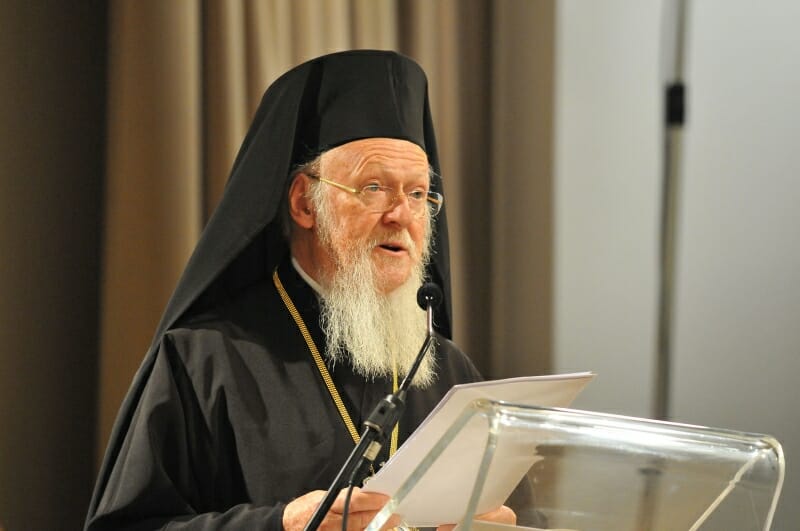
Oct 27, 2015 | Focolare Worldwide
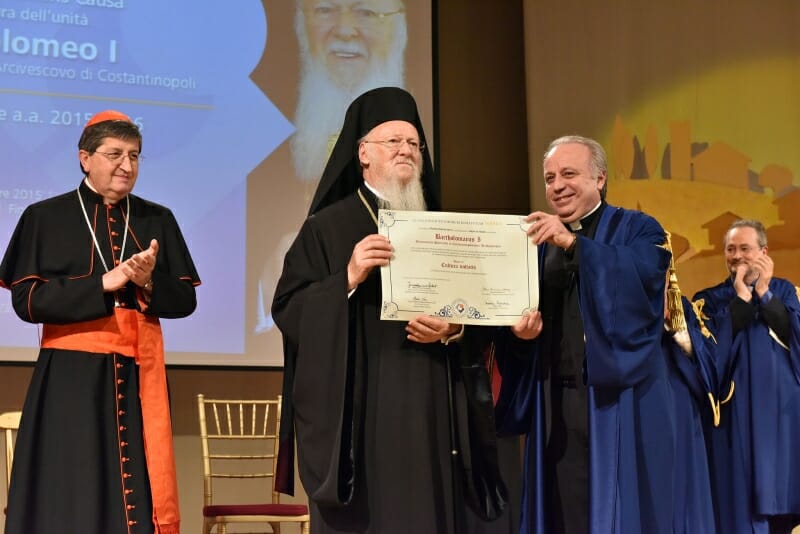 During his lecture on October 26, 2015, following the conferment of the title of Doctor in the “Culture of Unity” by Sophia University Institute, Bartholomew I recalled the history of relations between the two “sister” churches. Those relations had been marred by centuries of misunderstanding and, in time returned to the path towards unity with the lifting of the mutual excommunications and the steps taken by such figures as Paul VI and Athenagoras I whose legacy has been embraced by Bartholomew I. It is a path that has recently recalled the value of “synodality” as a key element in guiding the Church of Christ, and there were several occasions that expressed spiritual synergy. In his message, read by Cardinal Betori, Pope Francis addressed “the beloved brother Bartholomew” stressing “the common journey our Churches take towards full and visible unity, to which we aspire with dedication and perseverance.” The Patriarch was deeply touched by the Pope’s words and said he was “very” happy, confiding that he would “return to Istanbul stronger, more certain” knowing there was a “a brother in Rome who wished to work and pray with us to accelerate the unity of our churches” and to whom he responded with the “Kiss of Peace” invoking the prayer for a long life for Pope Francis.
During his lecture on October 26, 2015, following the conferment of the title of Doctor in the “Culture of Unity” by Sophia University Institute, Bartholomew I recalled the history of relations between the two “sister” churches. Those relations had been marred by centuries of misunderstanding and, in time returned to the path towards unity with the lifting of the mutual excommunications and the steps taken by such figures as Paul VI and Athenagoras I whose legacy has been embraced by Bartholomew I. It is a path that has recently recalled the value of “synodality” as a key element in guiding the Church of Christ, and there were several occasions that expressed spiritual synergy. In his message, read by Cardinal Betori, Pope Francis addressed “the beloved brother Bartholomew” stressing “the common journey our Churches take towards full and visible unity, to which we aspire with dedication and perseverance.” The Patriarch was deeply touched by the Pope’s words and said he was “very” happy, confiding that he would “return to Istanbul stronger, more certain” knowing there was a “a brother in Rome who wished to work and pray with us to accelerate the unity of our churches” and to whom he responded with the “Kiss of Peace” invoking the prayer for a long life for Pope Francis. 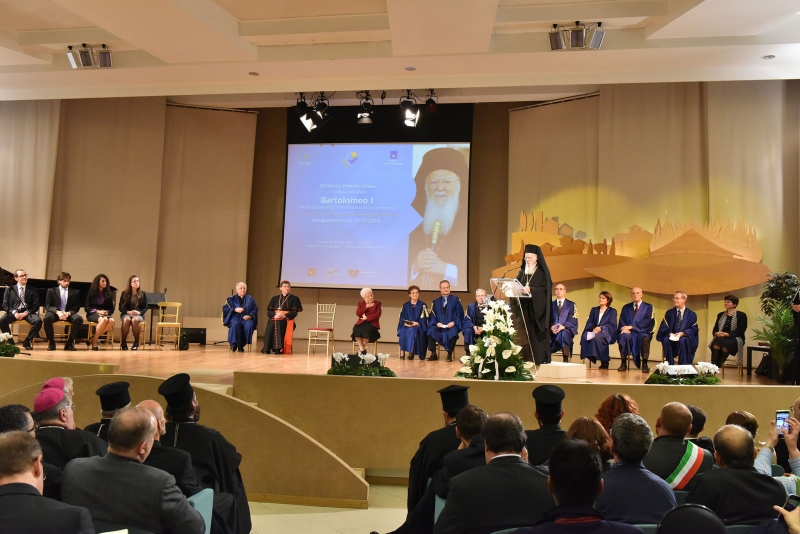 The Patriarch’s words breathed a history that had gone from “the refusal to recognise the other as Christian” to the rise of “protagonists of the new springtime in the Church who would make unity the main focus of their pastoral activity for the good of all” and because of their single desire of “advancing the ways of God.” His words also breathed a future history in which both Church and human institutions would understand that “diversities are a gift and not contrapositions, richness and not imbalance, life and not death” The ceremony was held in the Focolare town of Loppiano, Italy, where Sophia University Institute is located, and that day marked the opening of Sophia’s 8th academic year. More than a thousand people attended the extraordinary event with the presence of His Holiness Bartholomew I – several delegations from the Orthodox Church, representatives of the Roman Catholic Church, civic leaders, a Muslim community and over 4 thousand viewers connected via internet.
The Patriarch’s words breathed a history that had gone from “the refusal to recognise the other as Christian” to the rise of “protagonists of the new springtime in the Church who would make unity the main focus of their pastoral activity for the good of all” and because of their single desire of “advancing the ways of God.” His words also breathed a future history in which both Church and human institutions would understand that “diversities are a gift and not contrapositions, richness and not imbalance, life and not death” The ceremony was held in the Focolare town of Loppiano, Italy, where Sophia University Institute is located, and that day marked the opening of Sophia’s 8th academic year. More than a thousand people attended the extraordinary event with the presence of His Holiness Bartholomew I – several delegations from the Orthodox Church, representatives of the Roman Catholic Church, civic leaders, a Muslim community and over 4 thousand viewers connected via internet.  The recognition statement presented to the Patriarch of Constantinople expressed gratitude “for his courageous, enduring and fruitful patience in favour of a culture of unity” of which he is a “beloved and listened-to protagonist on the international level, on the ecclesial level in the dialogue between the Churches, on the interreligious level in the encounter amongst different religious traditions and experiences, and on the cultural level in the collaboration amongst women and men of all beliefs who follow the path of universal brotherhood.” In an interview, Dr. Piero Coda, President of the Institute, went on to say – explaining the culture of unity – it is not a utopia, but an “inspiration through which Chiara Lubich understood that the charism of unity given to her by God, could also be expressed by culture. There is always a need for mediations, models, as Pope Francis says, a cultural revolution, to channel existence towards new frontiers. This is why Sophia University Institute was begun.” Focolare president, Maria Voce, spoke for the whole Movement expressed to the Patriarch the joy and the honour of welcoming him to the town of Loppiano, mindful of the leading role he plays as a spiritual and intellectual figure, the value of his testimony and of his “calls to justice and the safeguarding of the environment which is our common home.” “Dialogue is our common priority,” Maria Voce continued, as she stated our wish to “pursue the path in total harmony of ideals and life witness.” Another step, recalled by Bartholomew I during an interview at the conclusion of the ceremony, was the November 2015 gathering in Istanbul, of Bishop Friends of the Focolare from different churches: “There,” he said, “we will be able to express our will to work for the unity of our Churches. We are glad and ready to welcome them and to exchange the Kiss of Peace between East and West.” Unity in diversity was one of the “new terms” that were mentioned, and that University president Piero Coda strongly emphasised: “the Gospel is not uniformity, but appreciation of differences. Flowing from the same font, they are ‘unity’ precisely in the measure to which they enter into relation with one another; that is, that they mutually recognize the gifts that each of them carries. Therefore, diversity is the flower of unity when it is lived as a relationship, as fraternity, as communion.” “And it is precisely in the acceptance of the diversity” – the Patriarch concluded – “through the dialogue of love, mutual respect, acceptance of the Other and our availability to welcome and be welcomed, that we will be able to become for the world icons of Christ and like Him, in unity, also be diversity.” Replay streaming Message from Pope Francis Press Release
The recognition statement presented to the Patriarch of Constantinople expressed gratitude “for his courageous, enduring and fruitful patience in favour of a culture of unity” of which he is a “beloved and listened-to protagonist on the international level, on the ecclesial level in the dialogue between the Churches, on the interreligious level in the encounter amongst different religious traditions and experiences, and on the cultural level in the collaboration amongst women and men of all beliefs who follow the path of universal brotherhood.” In an interview, Dr. Piero Coda, President of the Institute, went on to say – explaining the culture of unity – it is not a utopia, but an “inspiration through which Chiara Lubich understood that the charism of unity given to her by God, could also be expressed by culture. There is always a need for mediations, models, as Pope Francis says, a cultural revolution, to channel existence towards new frontiers. This is why Sophia University Institute was begun.” Focolare president, Maria Voce, spoke for the whole Movement expressed to the Patriarch the joy and the honour of welcoming him to the town of Loppiano, mindful of the leading role he plays as a spiritual and intellectual figure, the value of his testimony and of his “calls to justice and the safeguarding of the environment which is our common home.” “Dialogue is our common priority,” Maria Voce continued, as she stated our wish to “pursue the path in total harmony of ideals and life witness.” Another step, recalled by Bartholomew I during an interview at the conclusion of the ceremony, was the November 2015 gathering in Istanbul, of Bishop Friends of the Focolare from different churches: “There,” he said, “we will be able to express our will to work for the unity of our Churches. We are glad and ready to welcome them and to exchange the Kiss of Peace between East and West.” Unity in diversity was one of the “new terms” that were mentioned, and that University president Piero Coda strongly emphasised: “the Gospel is not uniformity, but appreciation of differences. Flowing from the same font, they are ‘unity’ precisely in the measure to which they enter into relation with one another; that is, that they mutually recognize the gifts that each of them carries. Therefore, diversity is the flower of unity when it is lived as a relationship, as fraternity, as communion.” “And it is precisely in the acceptance of the diversity” – the Patriarch concluded – “through the dialogue of love, mutual respect, acceptance of the Other and our availability to welcome and be welcomed, that we will be able to become for the world icons of Christ and like Him, in unity, also be diversity.” Replay streaming Message from Pope Francis Press Release
![Turkey. A Wind of Unity on Heybeli Island, Itstanbul.]()
Oct 27, 2015 | Non categorizzato
 Their “ethical statute” defines them as people who are immersed in «the contradictions and difficulties of the present time, and who take on themselves the burdens and sufferings of the world of work …in the perspective of universal brotherhood.» In this tension one can see the signs of that essential “new school of thought” indicated by Pasquale Foresi (“life itself makes us comprehend”), co-founder of the Focolare Movement who affirmed: «work is not only a means of sustainment, but is something inherent to our human nature, and is thus also a means to get to know reality and understand life. » It was a working method revealed through the experience of the employees of the former CGlobal company of Pisa involved in one of the usual restructuring and delocalization of businesses, and the story of the “bonds of solidarity” trade union fund of Pomigliano d’Arco, Naples, created thanks to the Parish of San Felice in Pincis, to give mutual aid to a community on the verge of collapse due to the lack of jobs caused by the international division of work steered by the multinational corporations. This scenario was completed by the dissertation of Alberto Botto, Secretary General of the trade union Luz y Fuerza in Rosario, Argentina, on the resistance of the labour unions in a confrontation with the power of military dictatorships and the liberalist privatisation formulas that risked to dissolve their country.
Their “ethical statute” defines them as people who are immersed in «the contradictions and difficulties of the present time, and who take on themselves the burdens and sufferings of the world of work …in the perspective of universal brotherhood.» In this tension one can see the signs of that essential “new school of thought” indicated by Pasquale Foresi (“life itself makes us comprehend”), co-founder of the Focolare Movement who affirmed: «work is not only a means of sustainment, but is something inherent to our human nature, and is thus also a means to get to know reality and understand life. » It was a working method revealed through the experience of the employees of the former CGlobal company of Pisa involved in one of the usual restructuring and delocalization of businesses, and the story of the “bonds of solidarity” trade union fund of Pomigliano d’Arco, Naples, created thanks to the Parish of San Felice in Pincis, to give mutual aid to a community on the verge of collapse due to the lack of jobs caused by the international division of work steered by the multinational corporations. This scenario was completed by the dissertation of Alberto Botto, Secretary General of the trade union Luz y Fuerza in Rosario, Argentina, on the resistance of the labour unions in a confrontation with the power of military dictatorships and the liberalist privatisation formulas that risked to dissolve their country. 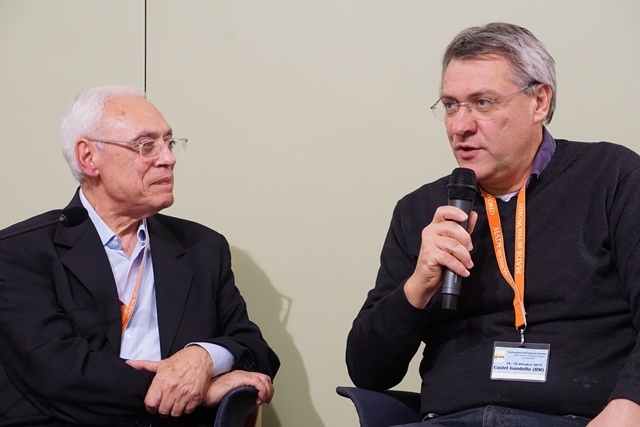 In the light of the paradigm of “this economy that kills,” to cite the Pope, precisely those who decided to take action in the trade union out of a “thirst for justice” are experiencing the fragility and limits of their organizational methods compared to the commercialization of all aspects of life. The three days thus aimed to create an “unarmed” zone, where each could express the reasons for his/her commitment. It was a mutual sharing that highlighted sharing sessions and moments of a challenging dialogue with Maurizio Landini and Marco Bentivogli, national secretaries of two Italian metalworkers’ unions (Fiom Cgil and Fim Cisl), and also with Giorgio Cremaschi of the radical, critical area. The programme included the confrontation with Cecilia Brighi who has worked years in the international employment organization of the trade unions, and with professors, Antonio Maria Baggio, Barbara Sena and Alberto Lo Presti, who presented the actuality of a fundamental text re-edited by Città Nuova (“Labour issues and Christianity,” by Von Ketteler).
In the light of the paradigm of “this economy that kills,” to cite the Pope, precisely those who decided to take action in the trade union out of a “thirst for justice” are experiencing the fragility and limits of their organizational methods compared to the commercialization of all aspects of life. The three days thus aimed to create an “unarmed” zone, where each could express the reasons for his/her commitment. It was a mutual sharing that highlighted sharing sessions and moments of a challenging dialogue with Maurizio Landini and Marco Bentivogli, national secretaries of two Italian metalworkers’ unions (Fiom Cgil and Fim Cisl), and also with Giorgio Cremaschi of the radical, critical area. The programme included the confrontation with Cecilia Brighi who has worked years in the international employment organization of the trade unions, and with professors, Antonio Maria Baggio, Barbara Sena and Alberto Lo Presti, who presented the actuality of a fundamental text re-edited by Città Nuova (“Labour issues and Christianity,” by Von Ketteler).  The working sessions under the guidance of Antonella Galluzzi and Stefano Biondi, “Made in The World” contact persons and followed up by the Focolare Movement’s leaders of cultural dialogue, Caterina Mulatero and Joao Manuel Motta, saw the participation of the president of the Movement, Maria Voce, who remarked: «the truth is that jobs are not lacking. God did not leave us without work; just look around and see the needs and emergencies of civil society! What seems to be lacking is money. Where has it gone? Corruption and thirst for unlimited profits has created a gap between work and money, and its usage.» This is why we have to «take on the wounds of humanity together» with our “expertise” which is « universal brotherhood, reconciling man with man.» The participants departed with the great desire to share what they had experienced in order to promote opportunities for dialogue with other trade unions. «We understood that we are not alone – one of the Argentinean union members said – and that it is vital to remain united to give a spirit to the unionist struggle, in order to convey it to everyone.»
The working sessions under the guidance of Antonella Galluzzi and Stefano Biondi, “Made in The World” contact persons and followed up by the Focolare Movement’s leaders of cultural dialogue, Caterina Mulatero and Joao Manuel Motta, saw the participation of the president of the Movement, Maria Voce, who remarked: «the truth is that jobs are not lacking. God did not leave us without work; just look around and see the needs and emergencies of civil society! What seems to be lacking is money. Where has it gone? Corruption and thirst for unlimited profits has created a gap between work and money, and its usage.» This is why we have to «take on the wounds of humanity together» with our “expertise” which is « universal brotherhood, reconciling man with man.» The participants departed with the great desire to share what they had experienced in order to promote opportunities for dialogue with other trade unions. «We understood that we are not alone – one of the Argentinean union members said – and that it is vital to remain united to give a spirit to the unionist struggle, in order to convey it to everyone.»













 «The key perspective of this trip will be revealed in the
«The key perspective of this trip will be revealed in the  In the Central African Republic, in a tense political context which suscitates anxiety, «in order to manifest to this nation how much the Church feels and shares its afflictions, and urge all central Africans to always be testimonials of mercy and reconciliation,» on 29 November, Francis will open the holy door of the cathedral of Bangui, symbolically anticipating the start of the
In the Central African Republic, in a tense political context which suscitates anxiety, «in order to manifest to this nation how much the Church feels and shares its afflictions, and urge all central Africans to always be testimonials of mercy and reconciliation,» on 29 November, Francis will open the holy door of the cathedral of Bangui, symbolically anticipating the start of the 


 In the face of the dramatic events that took place in Paris and in many other parts of the world, “the Focolare Movement, while it weeps with those who weep, continues to believe in the path of dialogue, of acceptance and of respect for the other, whoever that may be and from whatever provenance, religious belief, and ethnicity,” Focolare president Maria Voce
In the face of the dramatic events that took place in Paris and in many other parts of the world, “the Focolare Movement, while it weeps with those who weep, continues to believe in the path of dialogue, of acceptance and of respect for the other, whoever that may be and from whatever provenance, religious belief, and ethnicity,” Focolare president Maria Voce 



 During the Ashwayuja month, which usually falls between October and November, India is clothed in celebration and light. It’s Diwali, a tradition that goes back to the ancient legend of King Rama who after 14 years of exile in the forest, returned to the city of Ayodhya where he was welcomed by a parade (avali) of lights (dipa) in his honour. Hence the name: Dipawali or Diwali.This year it was celebrated during 10-15 November. The festivities begin with a good house cleaning while many small lamps are positioned in several points of the dwelling – entrances, window sills, lounges – and in the darkness of the night the whole city is transformed into a dreamlike fairyland scene. The light symbolises knowledge and inner awareness. But like a kaleidoscope, the meanings intersect and are magnified: knowledge conquers ignorance; interiority brings peace. Good conquers evil; light triumphs over shadows of darkness, and it unleashes the life force. People look forward to the feast all year. On the third day – the actual Diwali – people put on new clothes, adorn themselves with wreathes of flowers and glittering jewelry. They exchange gifts with relatives and friends, especially sweets and homemade snacks. Everyone attends the religious services in honour of Laskshmi, the goddess of wellbeing. In an atmosphere of peace, they carry leaves, coins and religious images, chanting Vedic mantras to receive her blessing. Then there are the games: cards, especially rummy, mimes, dances, treasure hunts and fireworks.
During the Ashwayuja month, which usually falls between October and November, India is clothed in celebration and light. It’s Diwali, a tradition that goes back to the ancient legend of King Rama who after 14 years of exile in the forest, returned to the city of Ayodhya where he was welcomed by a parade (avali) of lights (dipa) in his honour. Hence the name: Dipawali or Diwali.This year it was celebrated during 10-15 November. The festivities begin with a good house cleaning while many small lamps are positioned in several points of the dwelling – entrances, window sills, lounges – and in the darkness of the night the whole city is transformed into a dreamlike fairyland scene. The light symbolises knowledge and inner awareness. But like a kaleidoscope, the meanings intersect and are magnified: knowledge conquers ignorance; interiority brings peace. Good conquers evil; light triumphs over shadows of darkness, and it unleashes the life force. People look forward to the feast all year. On the third day – the actual Diwali – people put on new clothes, adorn themselves with wreathes of flowers and glittering jewelry. They exchange gifts with relatives and friends, especially sweets and homemade snacks. Everyone attends the religious services in honour of Laskshmi, the goddess of wellbeing. In an atmosphere of peace, they carry leaves, coins and religious images, chanting Vedic mantras to receive her blessing. Then there are the games: cards, especially rummy, mimes, dances, treasure hunts and fireworks. 









 The conviction that the world can walk towards unity, and overcome confrontation and armed violence, remains alive in the spirit and in the actions of those who have love for every person and the future of the human family at heart, and want to bring it about through political action, through the right use of economy, and the rule of law. The Focolare Movement, while it weeps with those who weep, continues to believe in the path of dialogue, of acceptance and of respect for the other, whoever that may be and from whatever background, religious belief, and ethnicity. Therefore, together with all those working for peace, in various posts of responsibility and often at risk to themselves, the Focolare renews its commitment to intensify and multiply acts and gestures of reconciliation, opportunities for dialogue and communion, for encounter and sharing at all levels and in all parts of the world, so as to embrace the cry of humanity and transform it into new hope.”
The conviction that the world can walk towards unity, and overcome confrontation and armed violence, remains alive in the spirit and in the actions of those who have love for every person and the future of the human family at heart, and want to bring it about through political action, through the right use of economy, and the rule of law. The Focolare Movement, while it weeps with those who weep, continues to believe in the path of dialogue, of acceptance and of respect for the other, whoever that may be and from whatever background, religious belief, and ethnicity. Therefore, together with all those working for peace, in various posts of responsibility and often at risk to themselves, the Focolare renews its commitment to intensify and multiply acts and gestures of reconciliation, opportunities for dialogue and communion, for encounter and sharing at all levels and in all parts of the world, so as to embrace the cry of humanity and transform it into new hope.” 
























 This is the title, but also the wish of the European Assembly of
This is the title, but also the wish of the European Assembly of 







 “Everyone was so touched by the brotherly affection that joins the Holy Father Francesco to His Holiness Patriarch Bartholomew. The Pope recognizes the Patriarch’s commitment in the journey of unity, which he describes as our common journey. Not only that: he very courageously says that this Honorary Degree is a step ahead in that journey.” You know the Patriarch very well, you have lived and now live even more intensely, this moment in a long history of closeness between the Focolare Movement and the Orthodox Church and its Patriarchs. What are your views on this Patriarch and the significance of this recognition? “Patriarch Bartholomew is the heir of the great Patriarch Athenagoras who really possessed this passion for unity which, in him, was almost a prophetic vision that he was not able to realize. This passion was transmitted particularly to Patriarch Bartholomew who never misses an opportunity to press for unity in the heart of the Orthodox Church, so that they can talk to one another to the Church of Rome with a voice that is already in a certain sense synodal. He tries in many ways to emphasise how much this journey together is alive. I think we are truly at a happy moment because there is gentle pressure being given by two heads of our two Churches, and that cannot but produce fruit. There will be resistance as Pope Francis pointed out at the conclusion of the Synod, but in the end there is the Holy Spirit who will help us, who pushes the Church securely towards the unity of the Churches. We think that this is a happy moment and that this recognition might be an important step, a concrete step on this journey.”
“Everyone was so touched by the brotherly affection that joins the Holy Father Francesco to His Holiness Patriarch Bartholomew. The Pope recognizes the Patriarch’s commitment in the journey of unity, which he describes as our common journey. Not only that: he very courageously says that this Honorary Degree is a step ahead in that journey.” You know the Patriarch very well, you have lived and now live even more intensely, this moment in a long history of closeness between the Focolare Movement and the Orthodox Church and its Patriarchs. What are your views on this Patriarch and the significance of this recognition? “Patriarch Bartholomew is the heir of the great Patriarch Athenagoras who really possessed this passion for unity which, in him, was almost a prophetic vision that he was not able to realize. This passion was transmitted particularly to Patriarch Bartholomew who never misses an opportunity to press for unity in the heart of the Orthodox Church, so that they can talk to one another to the Church of Rome with a voice that is already in a certain sense synodal. He tries in many ways to emphasise how much this journey together is alive. I think we are truly at a happy moment because there is gentle pressure being given by two heads of our two Churches, and that cannot but produce fruit. There will be resistance as Pope Francis pointed out at the conclusion of the Synod, but in the end there is the Holy Spirit who will help us, who pushes the Church securely towards the unity of the Churches. We think that this is a happy moment and that this recognition might be an important step, a concrete step on this journey.” 



